1 INCLUSIVE RESEARCH LAUREN ISAACSON, Research Director at Curio Research With contributions from Mary Elizabeth Sullivan & Glenda Sims @curio_research Photo by Arisa ChaFasa on Unsplash www.curioresearch.net
A presentation at User Centred Design Gathering in October 2020 in by Lauren Isaacson

1 INCLUSIVE RESEARCH LAUREN ISAACSON, Research Director at Curio Research With contributions from Mary Elizabeth Sullivan & Glenda Sims @curio_research Photo by Arisa ChaFasa on Unsplash www.curioresearch.net

2 UNDERSTANDING DISABILITIES PEOPLE WITH DISABILITIES AS A MARKET LEGAL IMPLICATIONS OF DISABLED EXCLUSION WHY SHOULD WE MAKE RESEARCH INCLUSIVE MAKING RESEARCH INCLUSIVE Photo by Ariel PiloFo on Unsplash @curio_research • Mind Your Manners • Design Inclusively • Be Accommodating • Be Willing to Modify www.curioresearch.net

3 My Experience Photo by Nathan Anderson on Unsplash @curio_research www.curioresearch.net

4 Cherry Rae, My Neighbour @curio_research www.curioresearch.net

5 Cherry Rae, Gamer @curio_research www.curioresearch.net

6 Cherry Rae, Person with Disabilities @curio_research www.curioresearch.net

7 Cherry Rae, Advocate and Consultant @curio_research www.curioresearch.net

8 W H AT I S YO U R D I S A B I L I T Y EXPERIENCE? Photo by Yomex Owo on Unsplash @curio_research www.curioresearch.net

Photo by Audi Nissen on Unsplash 9 Understanding Disabilities It’s not one size fits all. @curio_research www.curioresearch.net
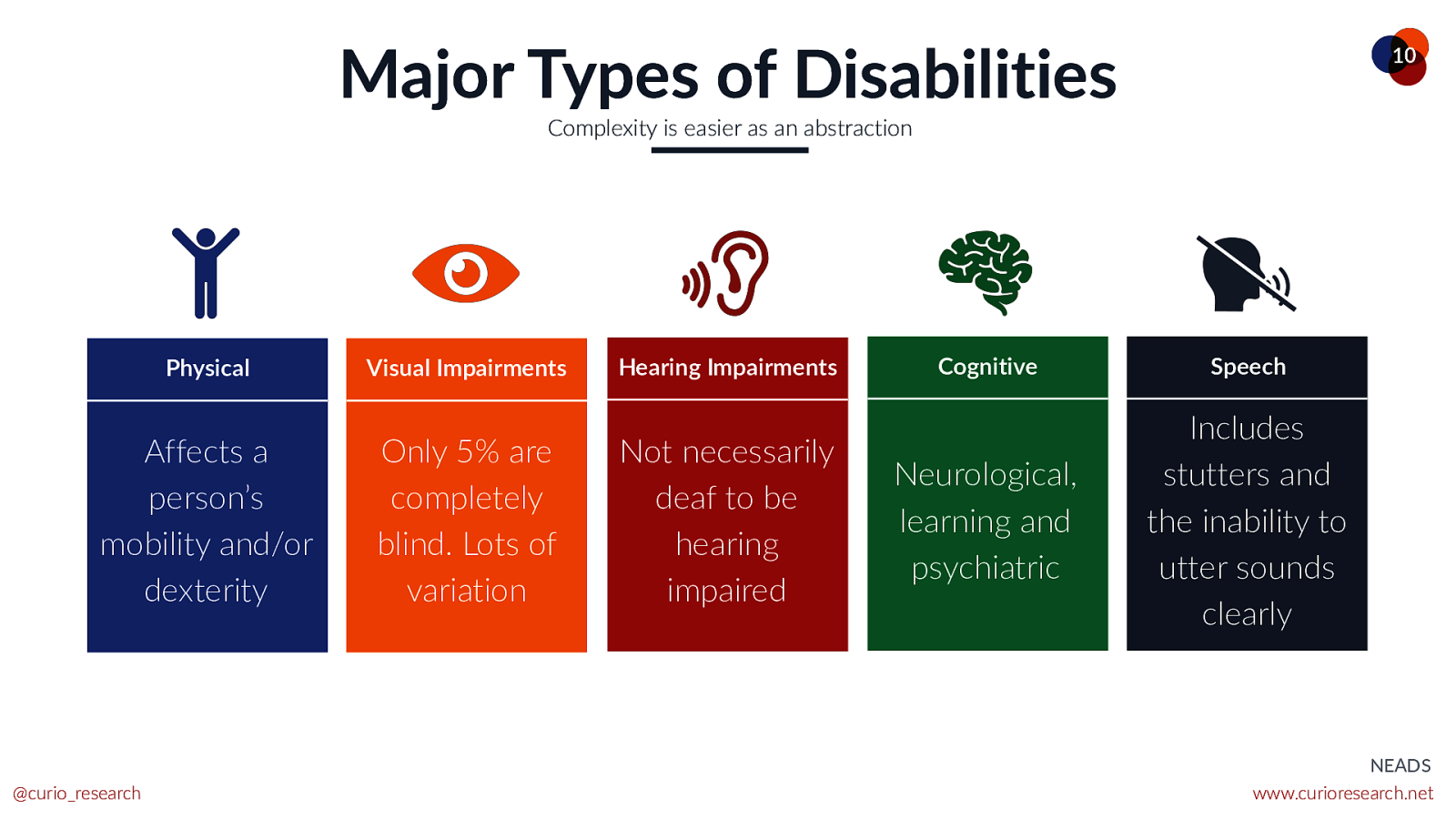
Major Types of Disabilities 10 Complexity is easier as an abstraction Physical Affects a person’s mobility and/or dexterity @curio_research Visual Impairments Only 5% are completely blind. Lots of variation Hearing Impairments Not necessarily deaf to be hearing impaired Cognitive Speech Neurological, learning and psychiatric Includes stutters and the inability to utter sounds clearly NEADS www.curioresearch.net

Great Variation Within Categories 11 But it’s still complex Visual Impairments Color Blindness @curio_research Low Vision Legal Blindness Blindness Innate Visual Impairment Acquired Visual Impairment www.curioresearch.net
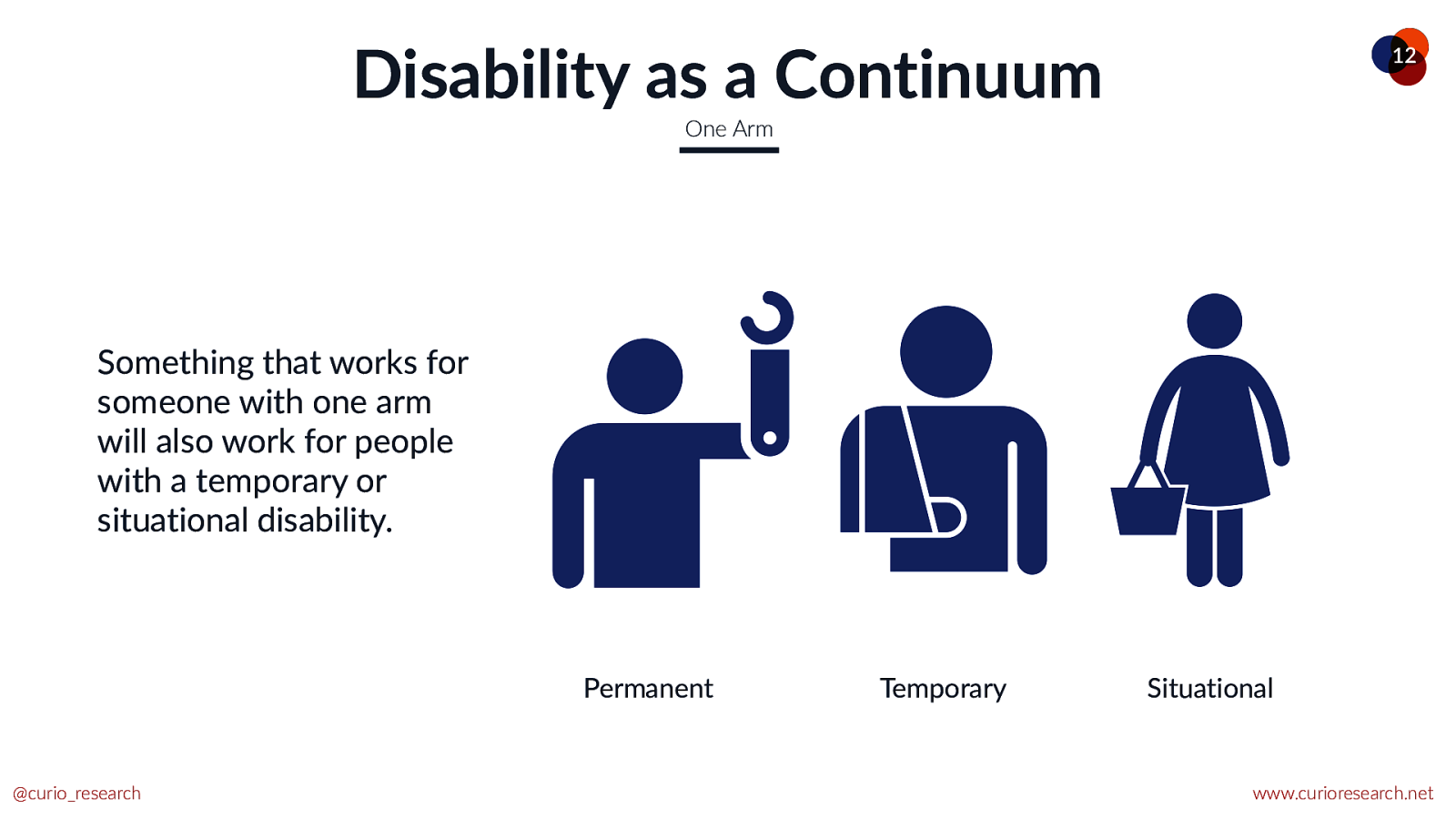
Disability as a Continuum 12 One Arm Something that works for someone with one arm will also work for people with a temporary or situational disability. Permanent @curio_research Temporary Situational www.curioresearch.net

13 People With Disabilities The size of the market @curio_research Photo by Audi Nissen on Unsplash www.curioresearch.net
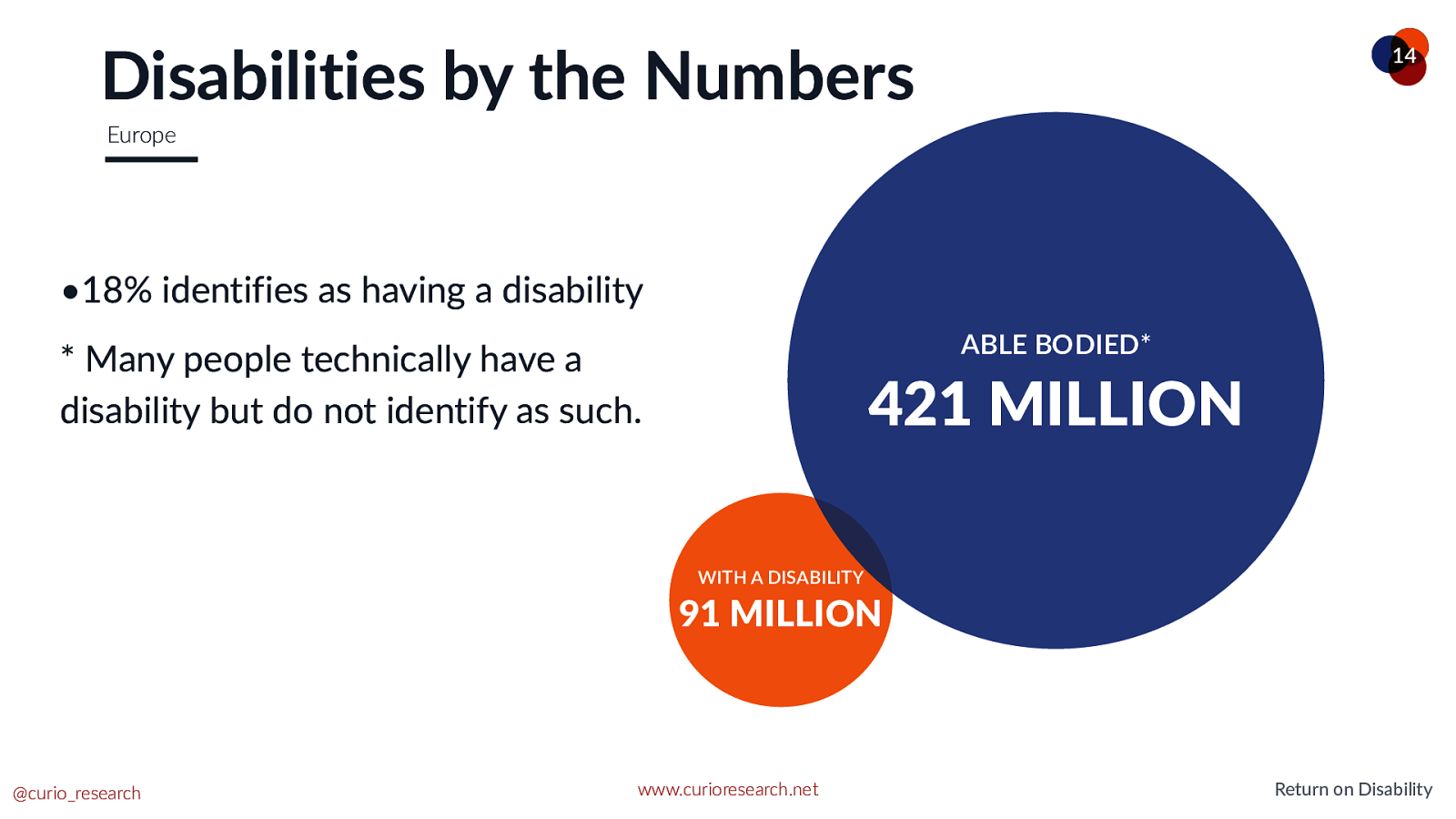
Disabilities by the Numbers 14 Europe •18% identifies as having a disability ABLE BODIED*

United Peoples With Disabilities 15 Bigger than Brexit, but not Brexit UPD 91 Germany Germany UPD 83 France 67 United Kingdom United Kingdom 66 France 60 Italy 0 25 50 €505.00 €428.00 €384.00 €365.00 €347.00 Netherlands 75 100 0 Popula\on Millions 150 300 450 600 Billion Euros Population Disposable Income Largest country in the EU Second largest disposable income @curio_research www.curioresearch.net Return on Disability
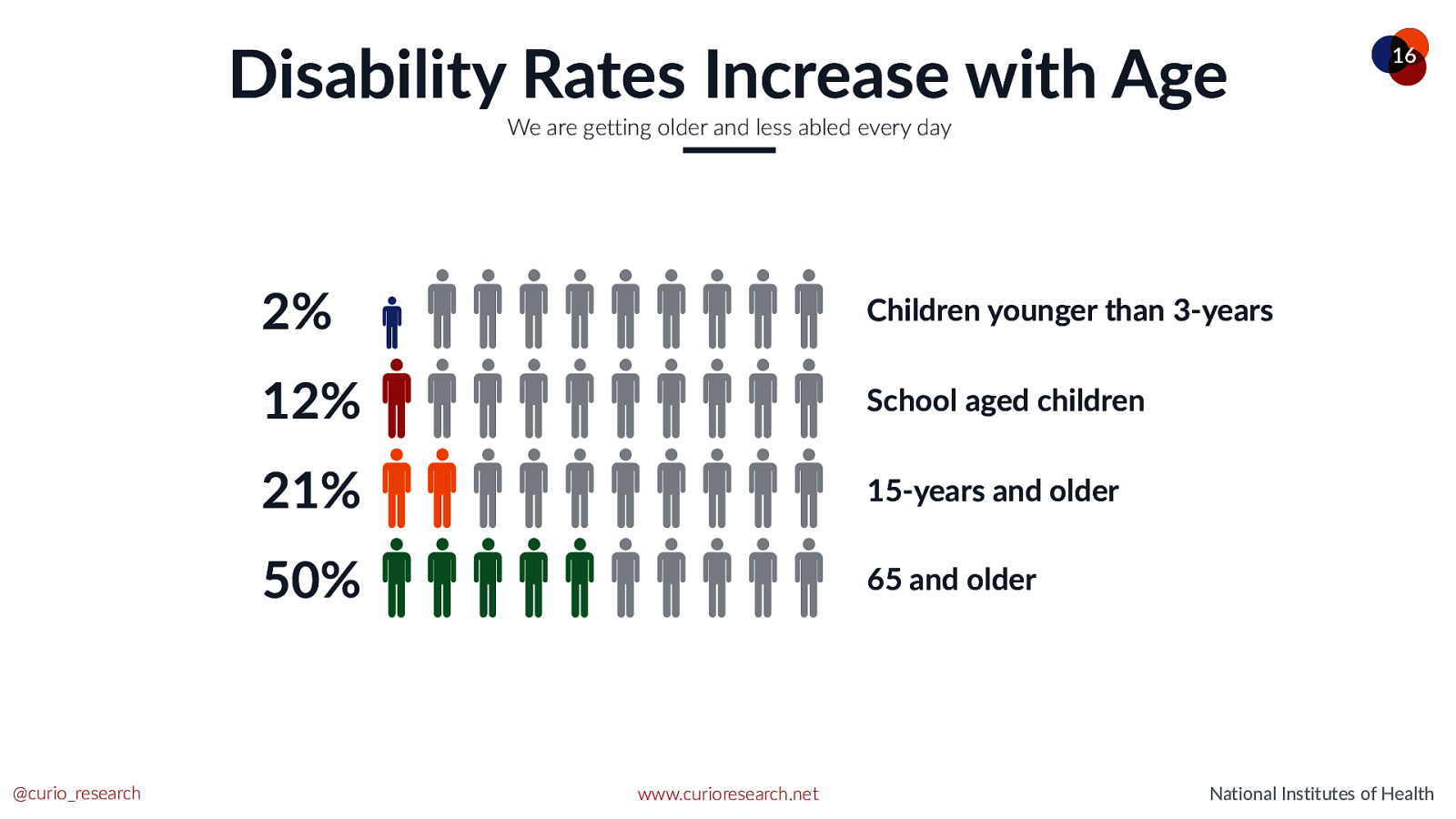
Disability Rates Increase with Age 16 We are getting older and less abled every day @curio_research 2% Children younger than 3-years 12% School aged children 21% 15-years and older 50% 65 and older www.curioresearch.net National Institutes of Health

17 Legal Implications Exclusivity Is a Liability @curio_research Photo by Robert Ruggiero on Unsplash www.curioresearch.net

18 Equality Act of 2020 This UK law combined several equal access regulations into one. Makes it unlawful to discriminate against people with disabilities, or other distinguishing factors, for employment, shopping, or building access and management. Covers anyone or anything that provides goods or services to the public. Websites provide a public service. www.companyname.com Level Access © 2016 Jetfabrik Multipurpose Theme. All Rights Reserved.

19 European Accessibility Act (EAA) New Europe The EAA is intended to encourage companies to integrate accessibility into their development process instead of as an afterthought. European Union of the Deaf • Ticketing and check-in machines • Computers and operating systems • Smartphones • Digital TV services • Telephones • Banking • AV media • E-Books • E-Commerce • Transportation www.companyname.com New Europe Autism Europe © 2016 Jetfabrik Multipurpose Theme. All Rights Reserved. 3PlayMedia
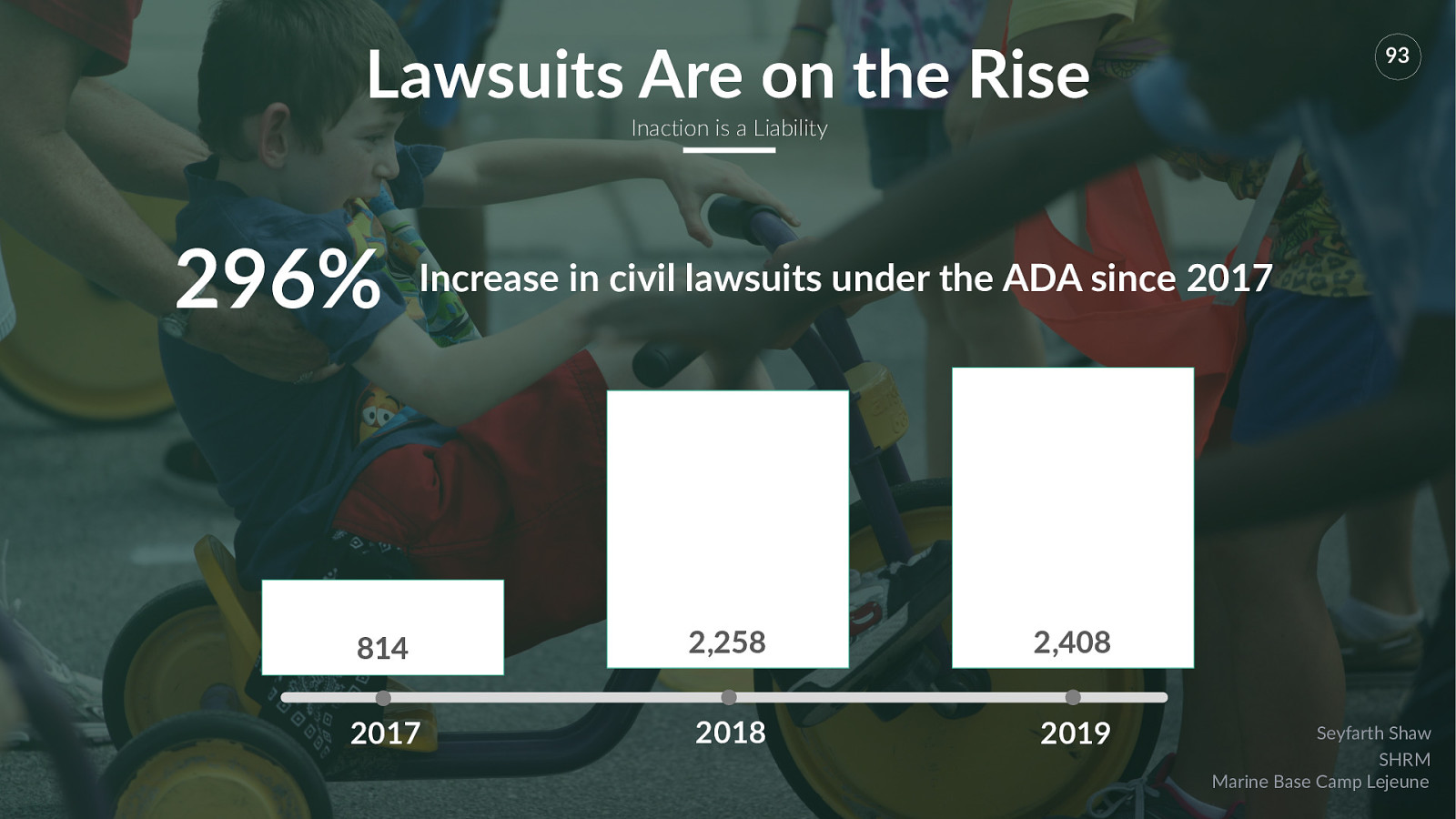
Lawsuits Are on the Rise 93 20 Inaction is a Liability 296% @curio_research Increase in civil lawsuits under the ADA since 2017 814 2,258 2,408 2017 2018 2019 Seyfarth Shaw SHRM Marine Base Camp Lejeune www.curioresearch.net
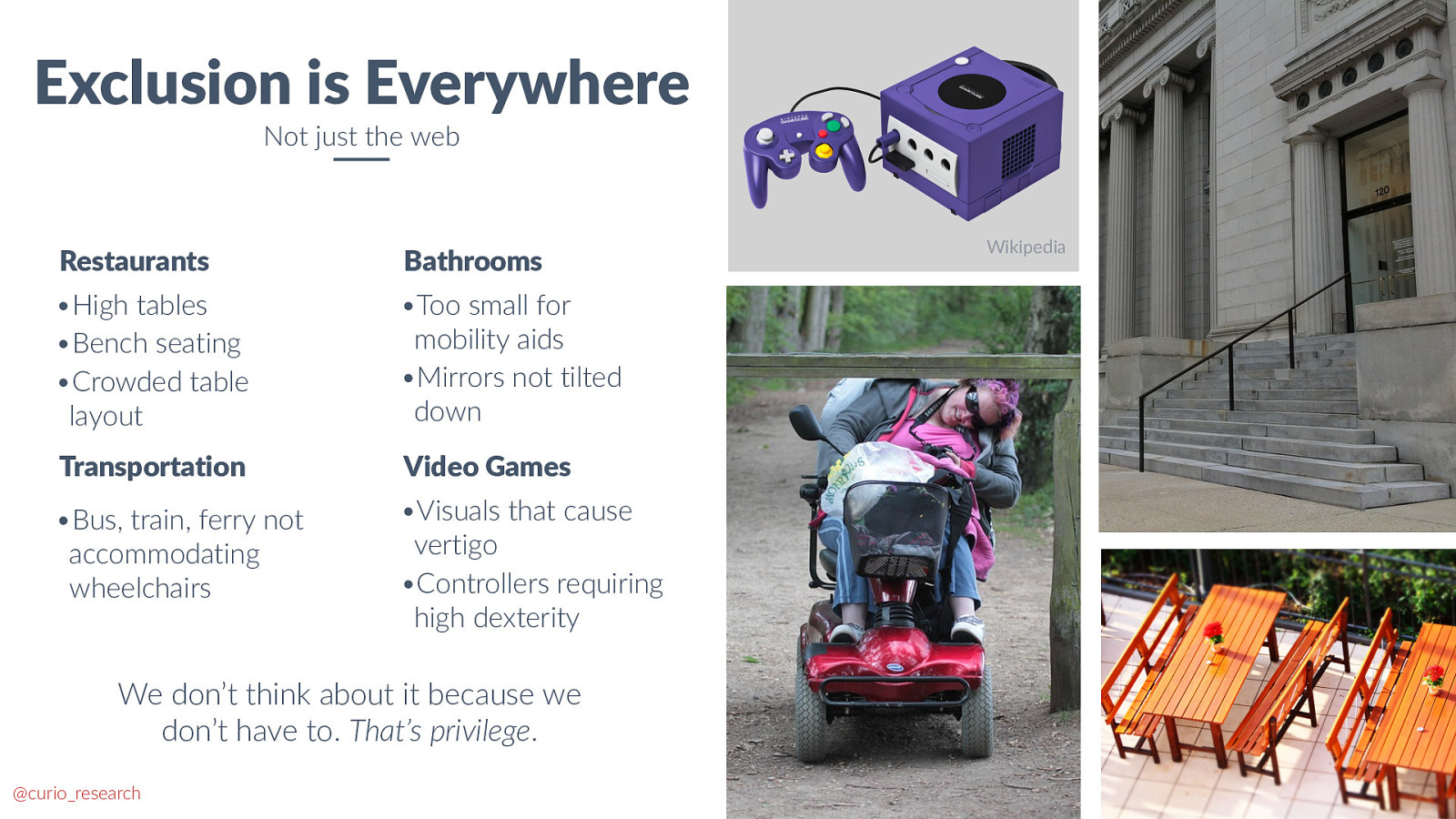
21 Exclusion is Everywhere Not just the web Restaurants Bathrooms •High tables •Bench seating •Crowded table layout •Too small for mobility aids •Mirrors not tilted down Transportation Video Games •Bus, train, ferry not accommodating wheelchairs •Visuals that cause vertigo •Controllers requiring high dexterity Wikipedia We don’t think about it because we don’t have to. That’s privilege. @curio_research www.curioresearch.net

22 Why Make Research Inclusive It’s more than a kindness Photo by Carlos Navas on Unsplash @curio_research www.curioresearch.net
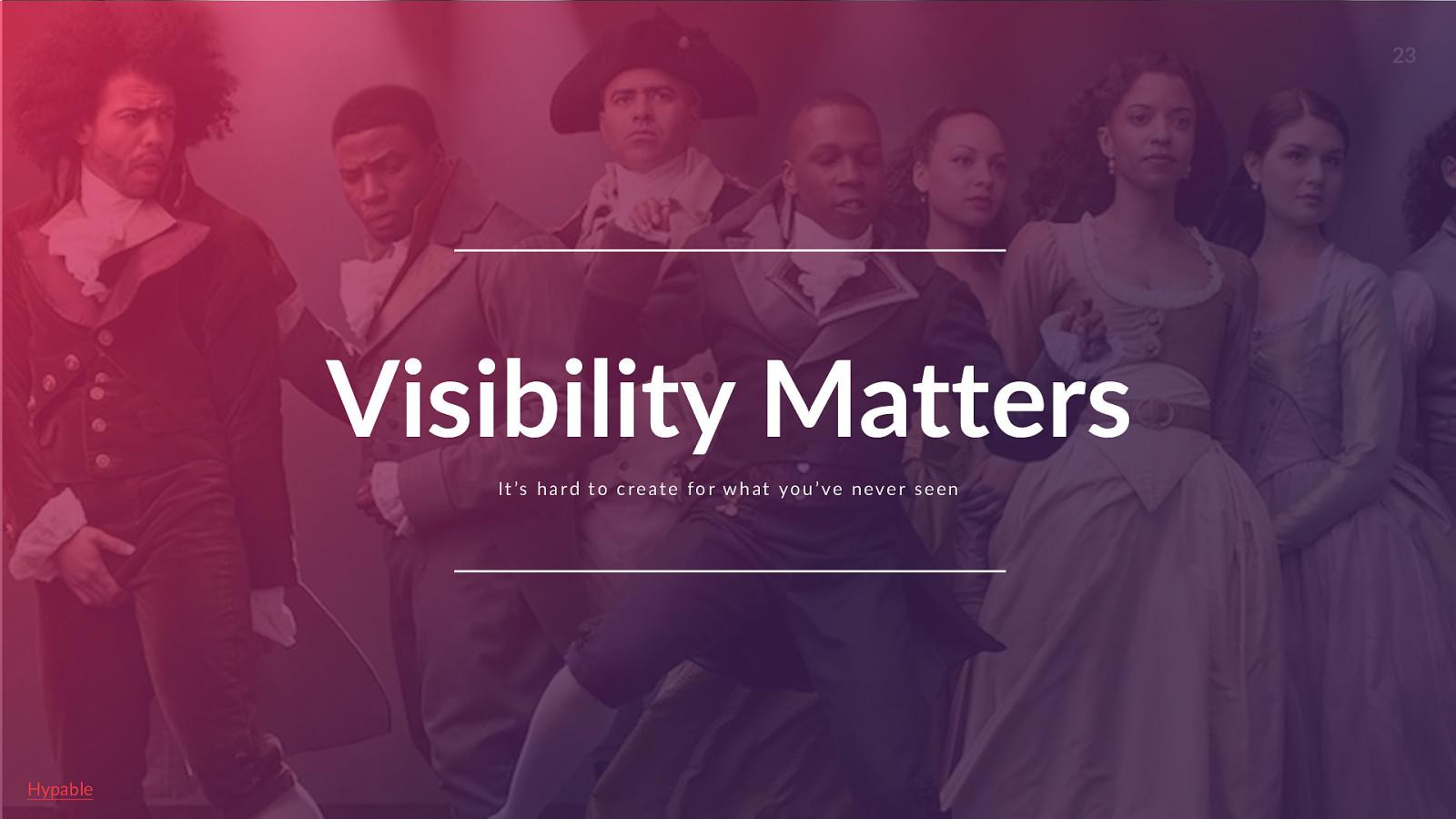
23 Visibility Matters It’s hard to create for what you’ve never seen Hypable @curio_research www.curioresearch.net
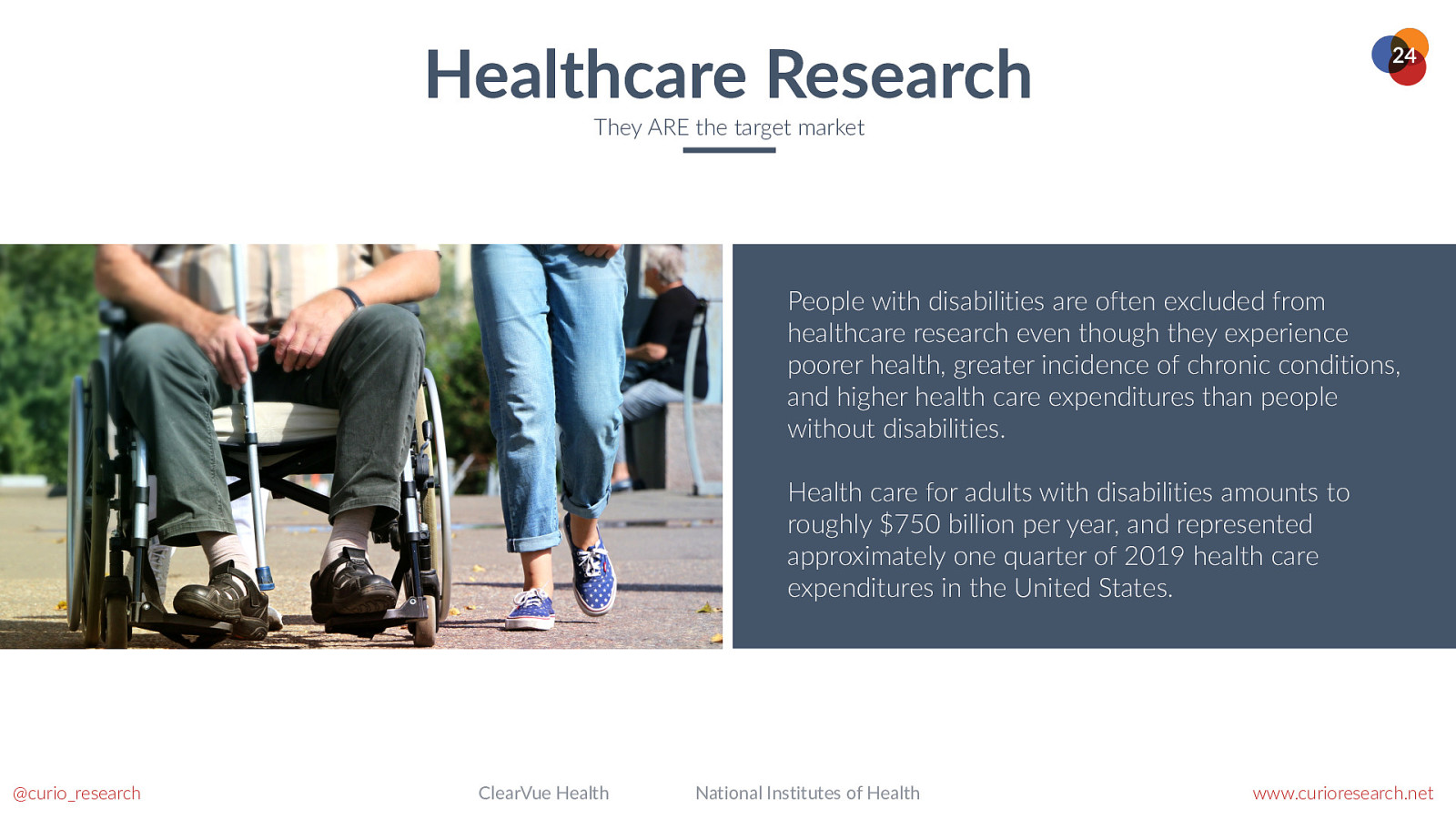
Healthcare Research 24 They ARE the target market People with disabilities are often excluded from healthcare research even though they experience poorer health, greater incidence of chronic conditions, and higher health care expenditures than people without disabilities. Health care for adults with disabilities amounts to roughly $750 billion per year, and represented approximately one quarter of 2019 health care expenditures in the United States. @curio_research ClearVue Health National Institutes of Health www.curioresearch.net
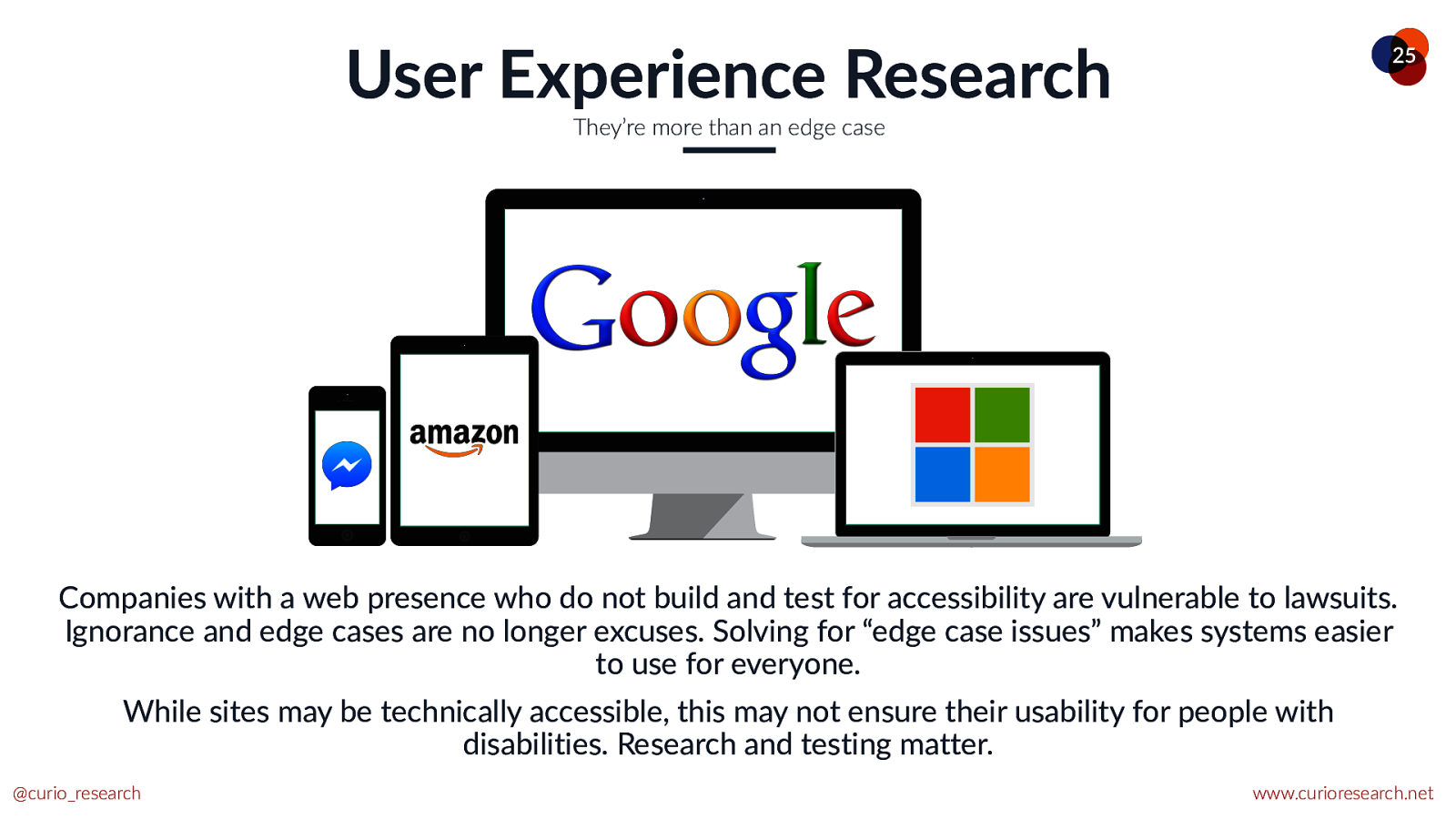
User Experience Research 25 They’re more than an edge case Companies with a web presence who do not build and test for accessibility are vulnerable to lawsuits. Ignorance and edge cases are no longer excuses. Solving for “edge case issues” makes systems easier to use for everyone. While sites may be technically accessible, this may not ensure their usability for people with disabilities. Research and testing matter. @curio_research www.curioresearch.net
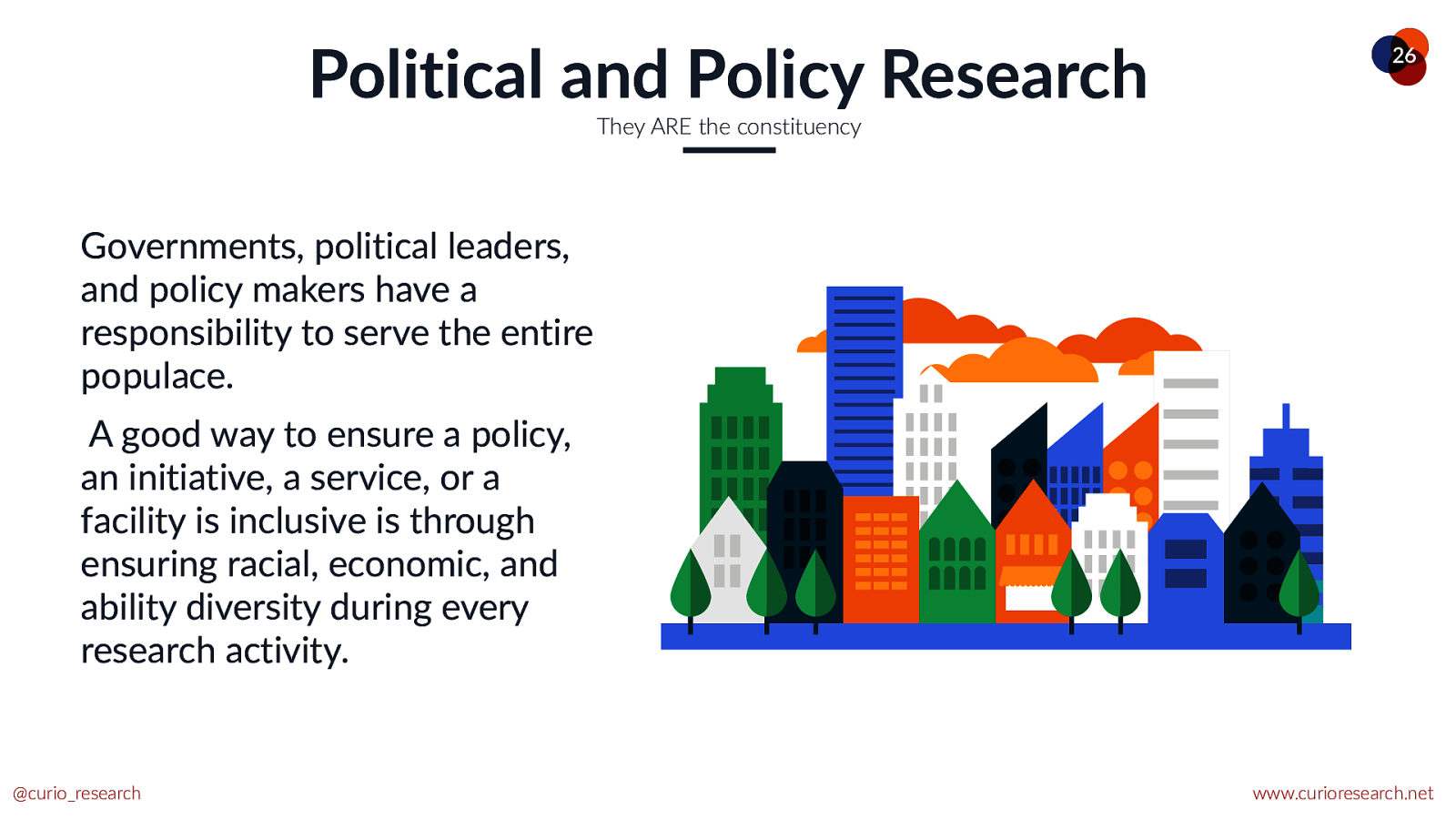
Political and Policy Research 26 They ARE the constituency Governments, political leaders, and policy makers have a responsibility to serve the entire populace. A good way to ensure a policy, an initiative, a service, or a facility is inclusive is through ensuring racial, economic, and ability diversity during every research activity. @curio_research www.curioresearch.net
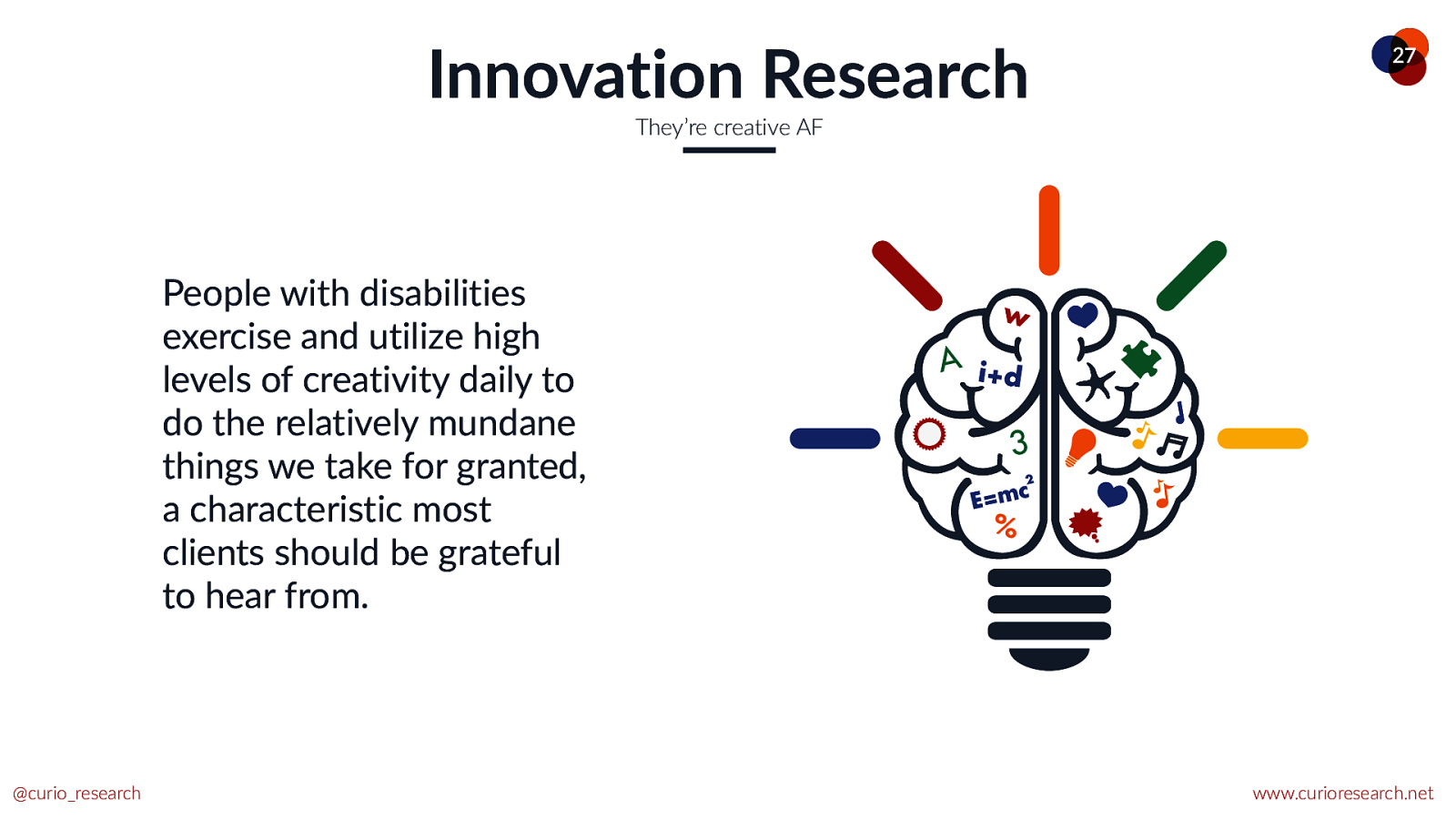
Innovation Research 27 They’re creative AF People with disabilities exercise and utilize high levels of creativity daily to do the relatively mundane things we take for granted, a characteristic most clients should be grateful to hear from. @curio_research www.curioresearch.net
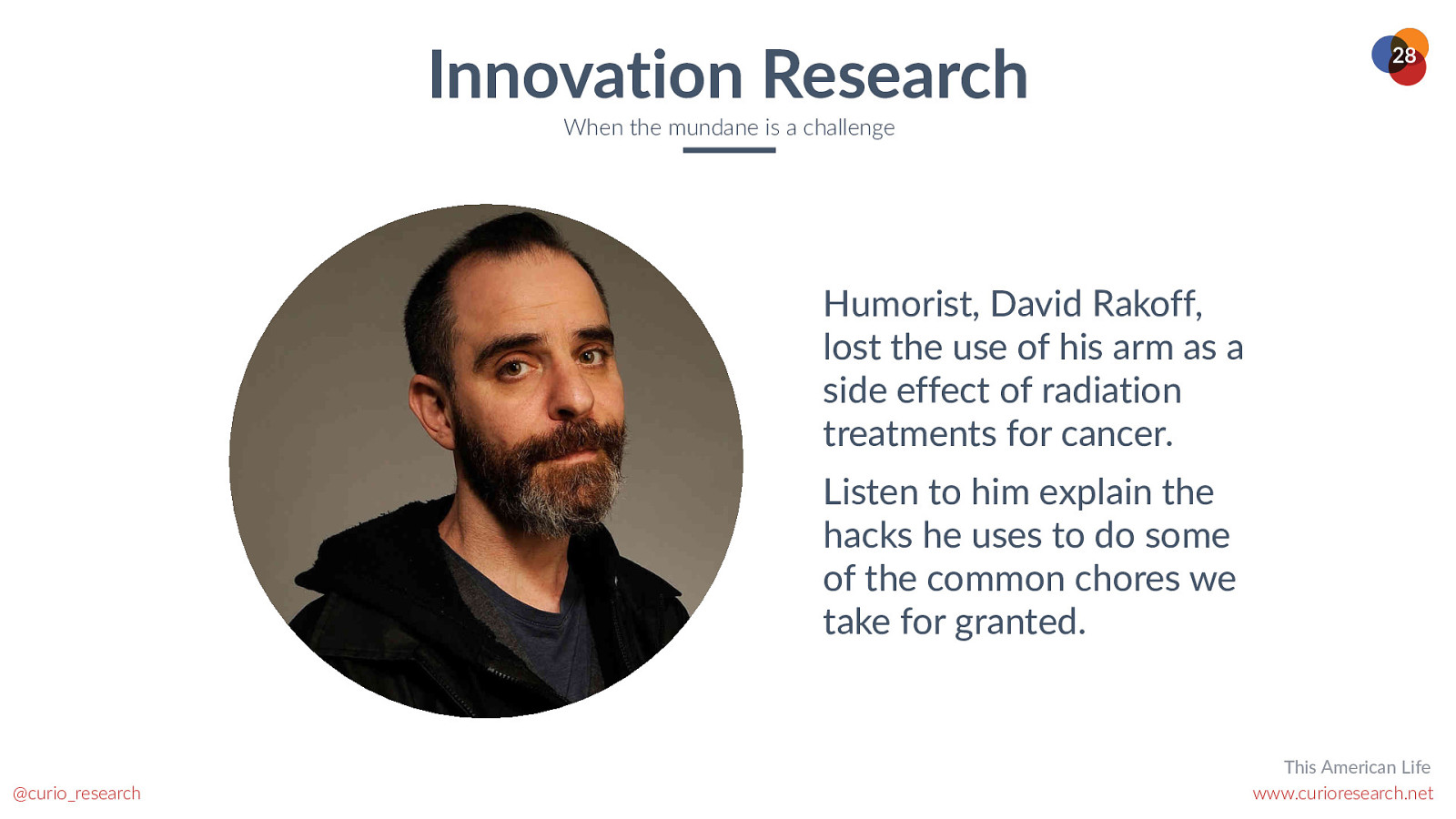
Innovation Research 28 When the mundane is a challenge Humorist, David Rakoff, lost the use of his arm as a side effect of radiation treatments for cancer. Listen to him explain the hacks he uses to do some of the common chores we take for granted. @curio_research This American Life www.curioresearch.net
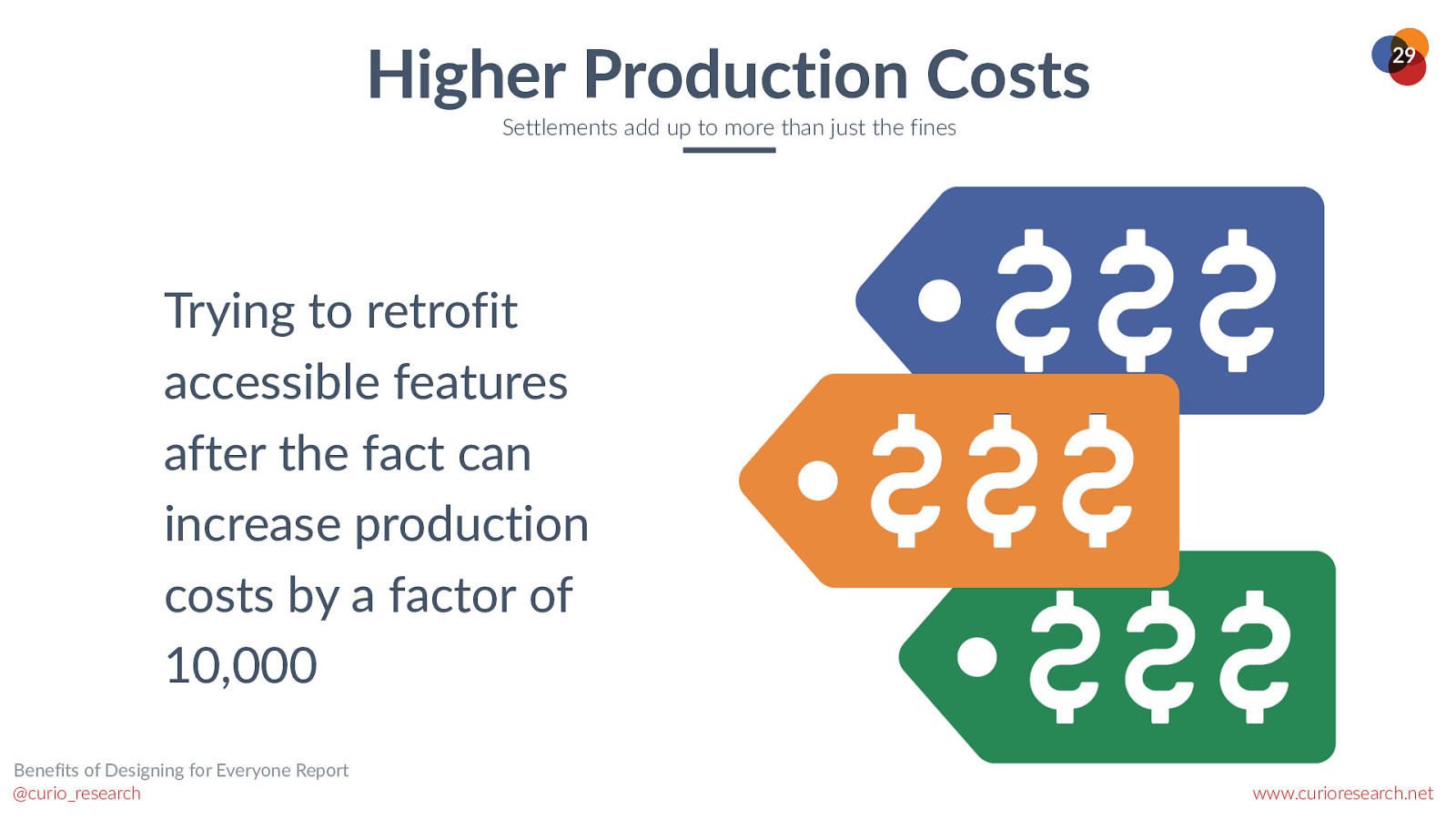
Higher Production Costs 29 Settlements add up to more than just the fines Trying to retrofit accessible features after the fact can increase production costs by a factor of 10,000 Benefits of Designing for Everyone Report @curio_research www.curioresearch.net
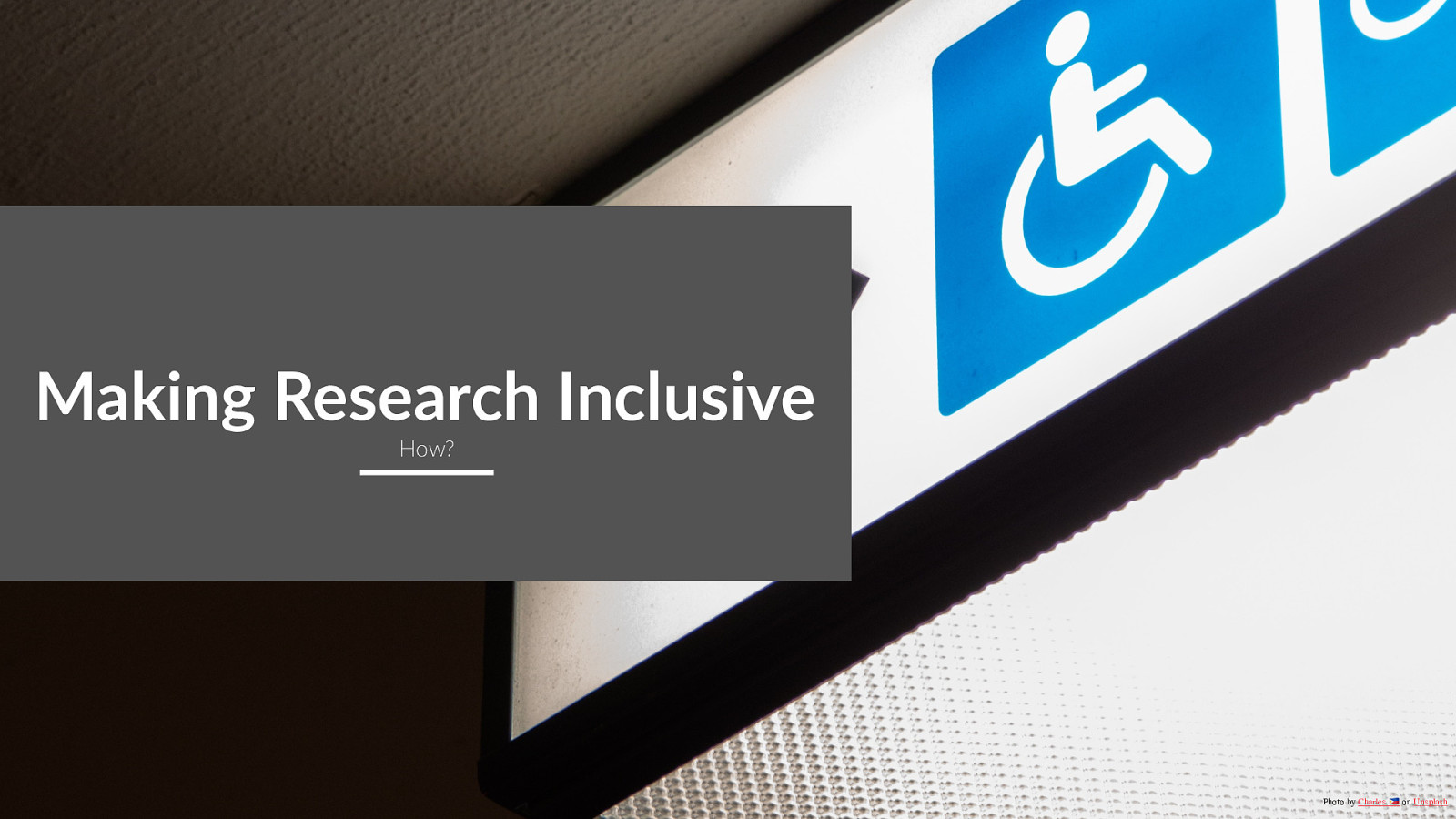
30 Making Research Inclusive How? @curio_research www.curioresearch.net Photo by Charles 🇵🇭 on Unsplash
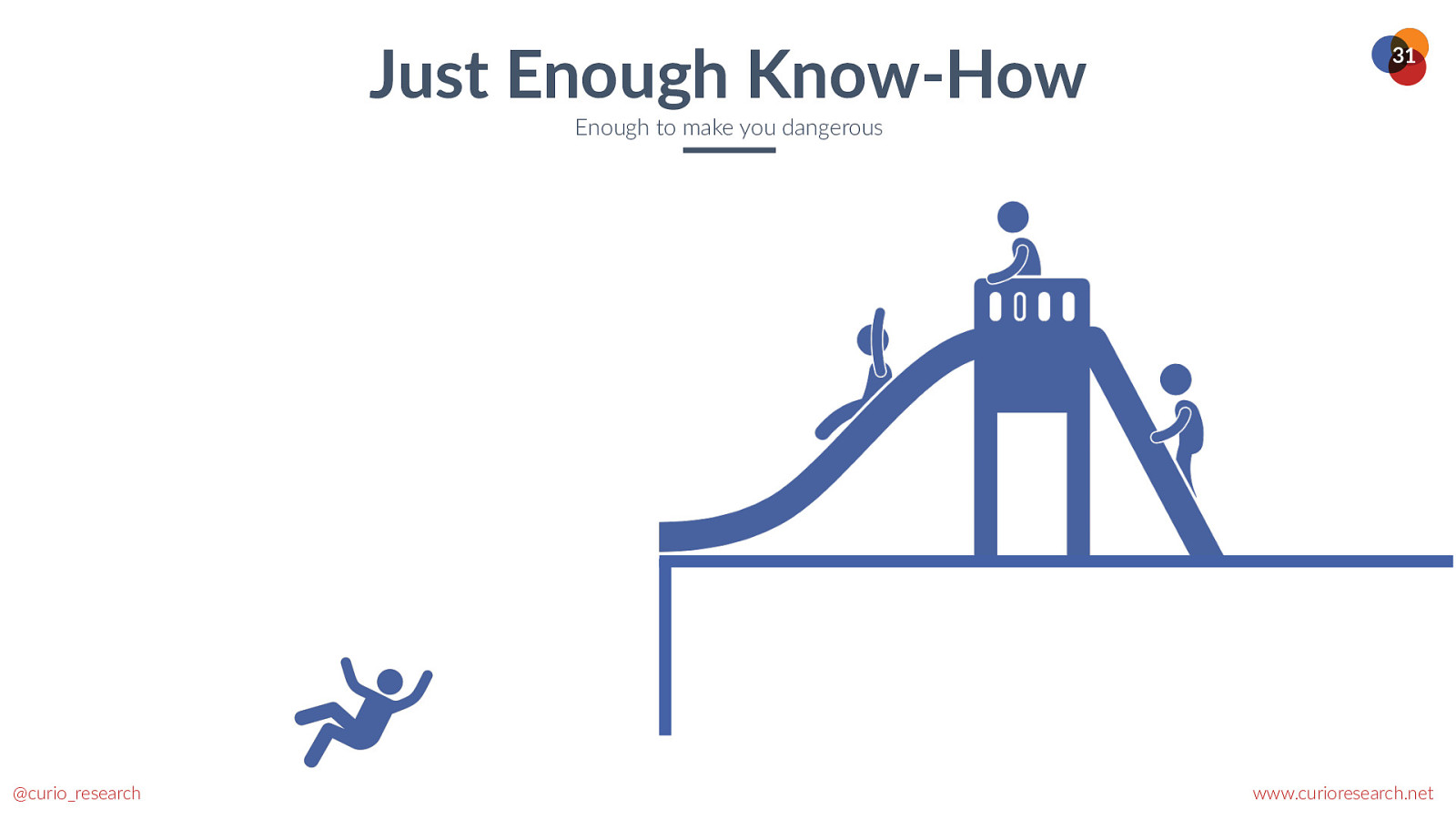
Just Enough Know-How 31 Enough to make you dangerous @curio_research www.curioresearch.net
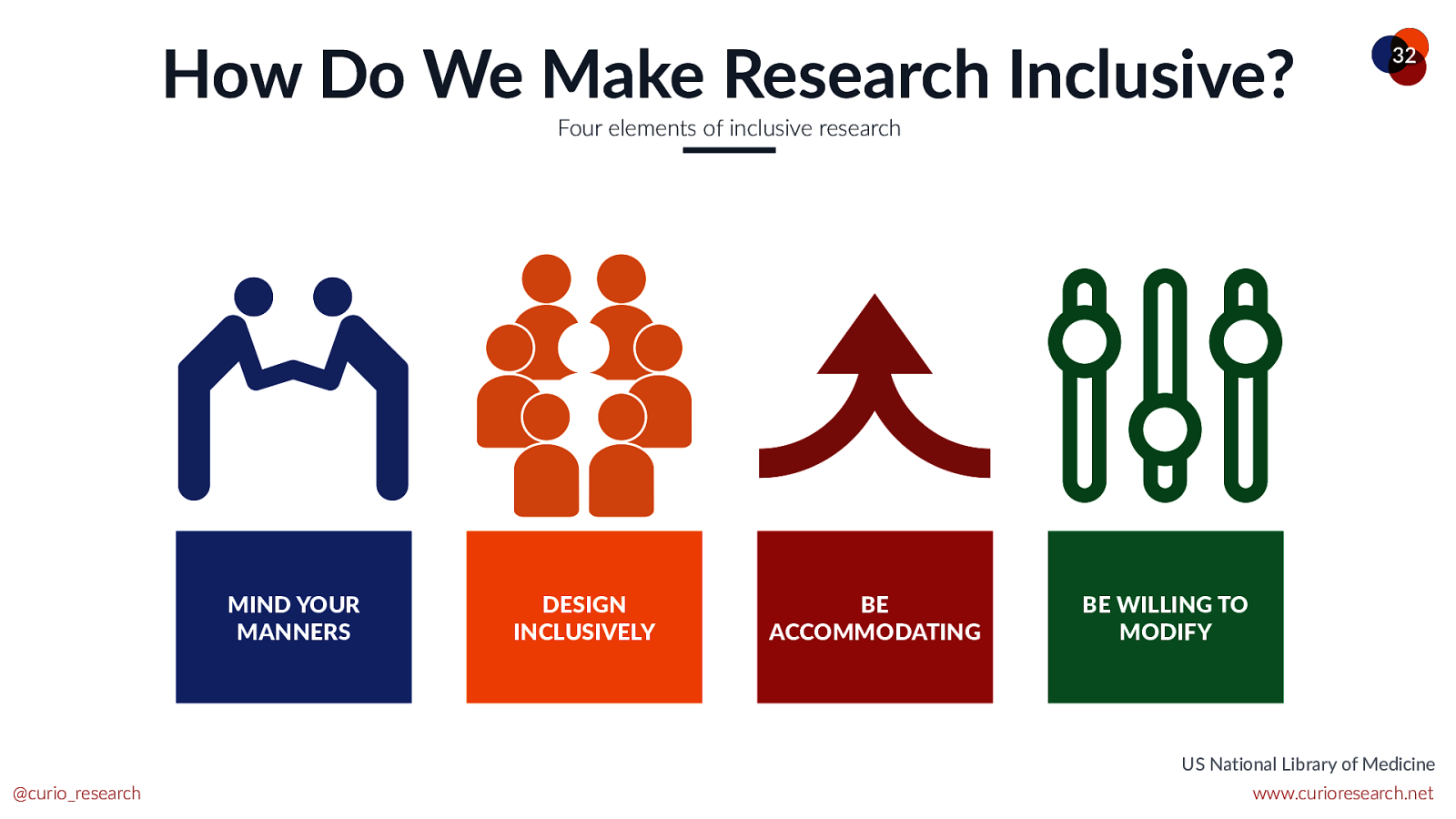
How Do We Make Research Inclusive? 32 Four elements of inclusive research MIND YOUR MANNERS DESIGN INCLUSIVELY BE ACCOMMODATING BE WILLING TO MODIFY US National Library of Medicine @curio_research www.curioresearch.net
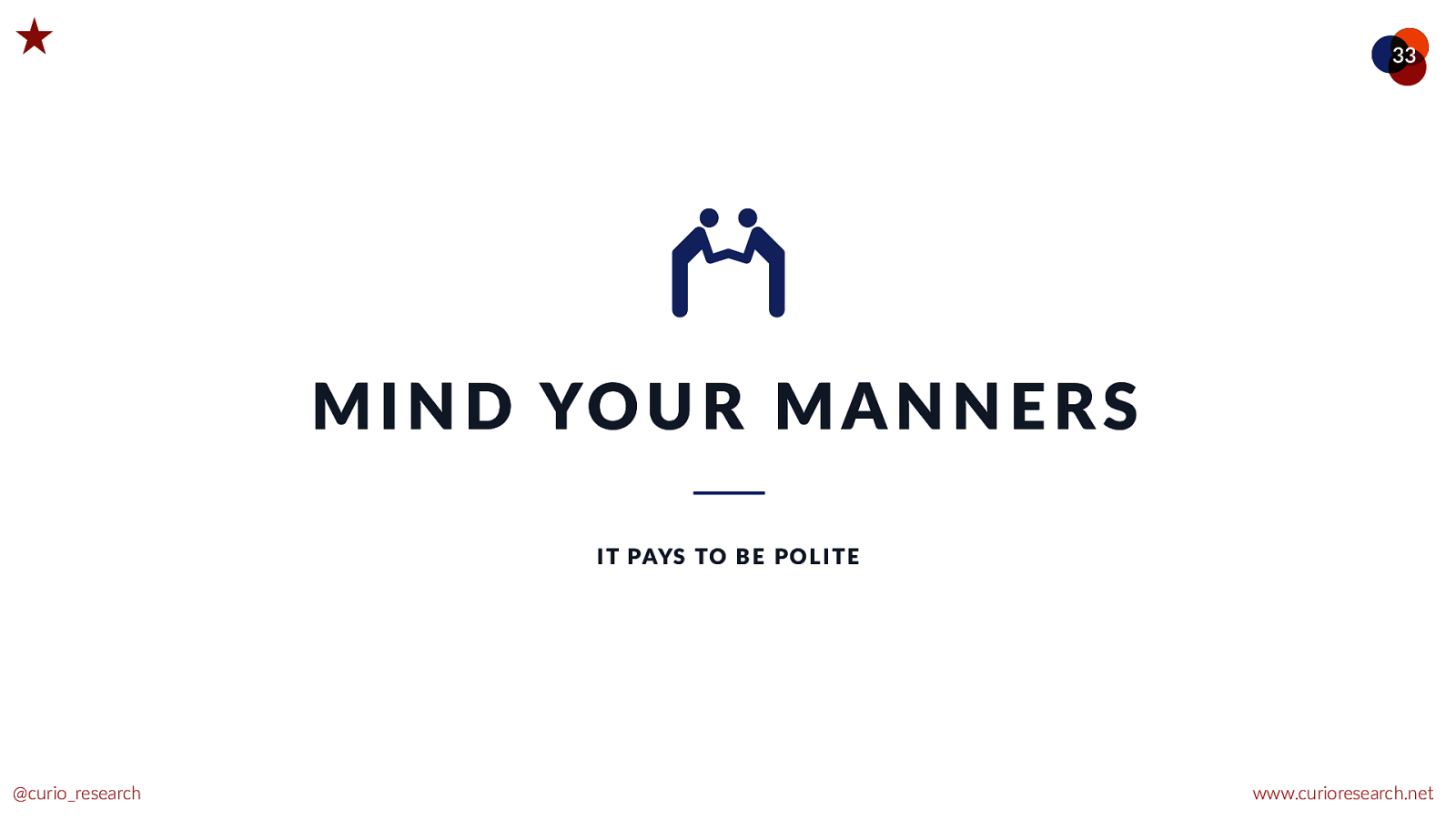
33 M I N D YO U R M A N N E R S I T PAYS TO B E P O L I T E @curio_research www.curioresearch.net
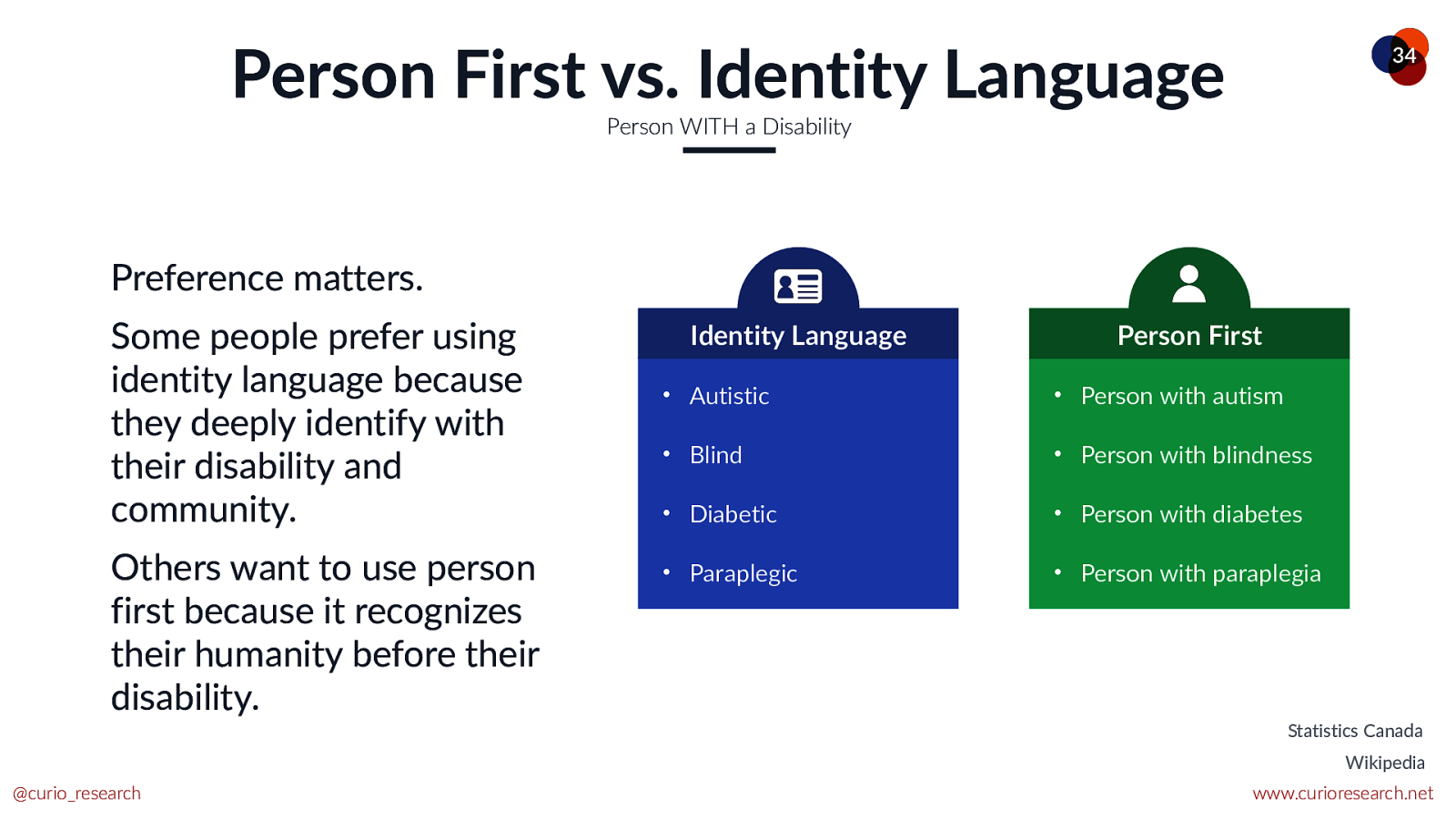
Person First vs. Identity Language 34 Person WITH a Disability Preference matters. Some people prefer using identity language because they deeply identify with their disability and community. Others want to use person first because it recognizes their humanity before their disability. Identity Language Person First • Autistic • Person with autism • Blind • Person with blindness • Diabetic • Person with diabetes • Paraplegic • Person with paraplegia Statistics Canada Wikipedia @curio_research www.curioresearch.net
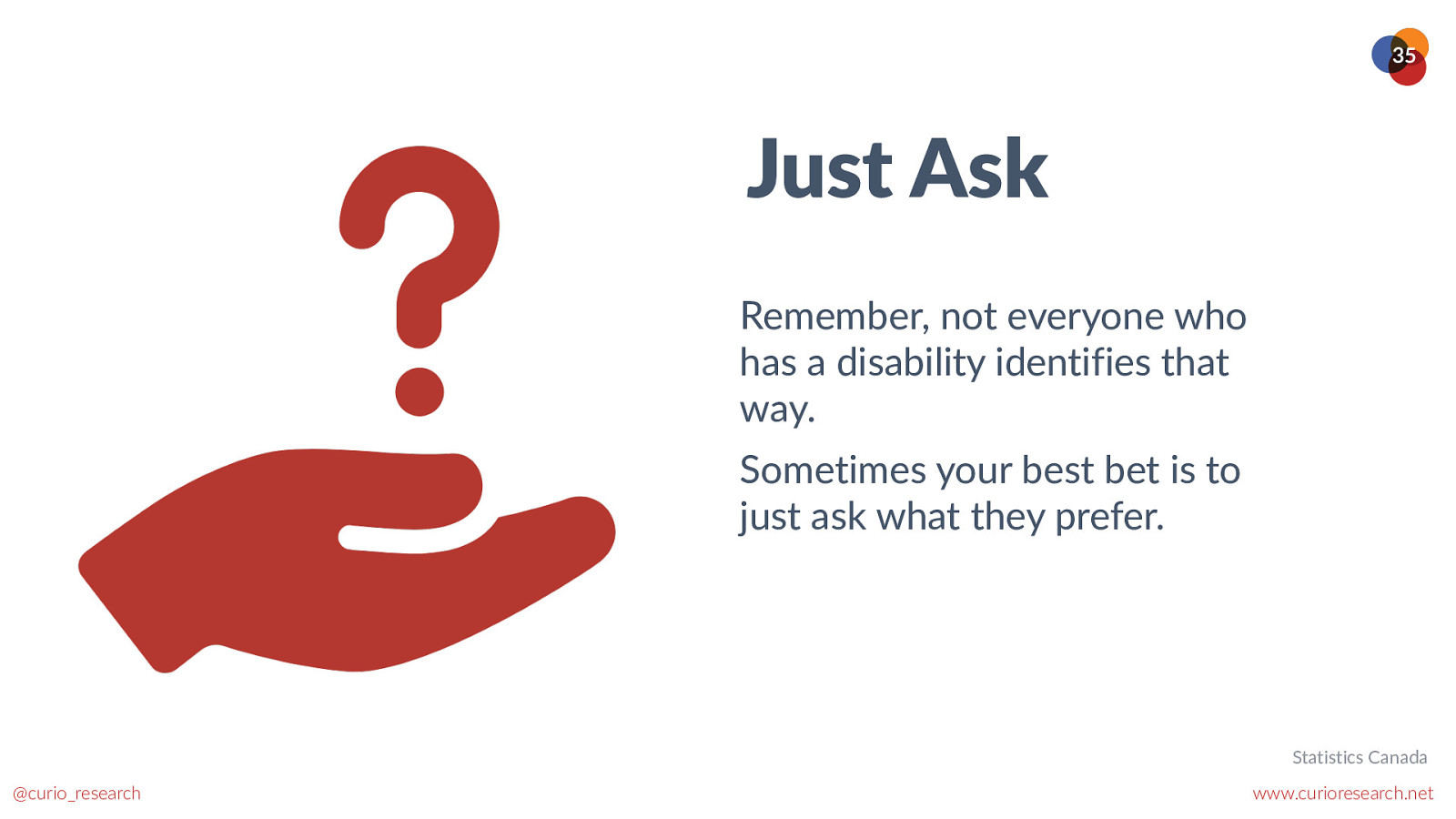
35 Just Ask Remember, not everyone who has a disability identifies that way. Sometimes your best bet is to just ask what they prefer. Statistics Canada @curio_research www.curioresearch.net
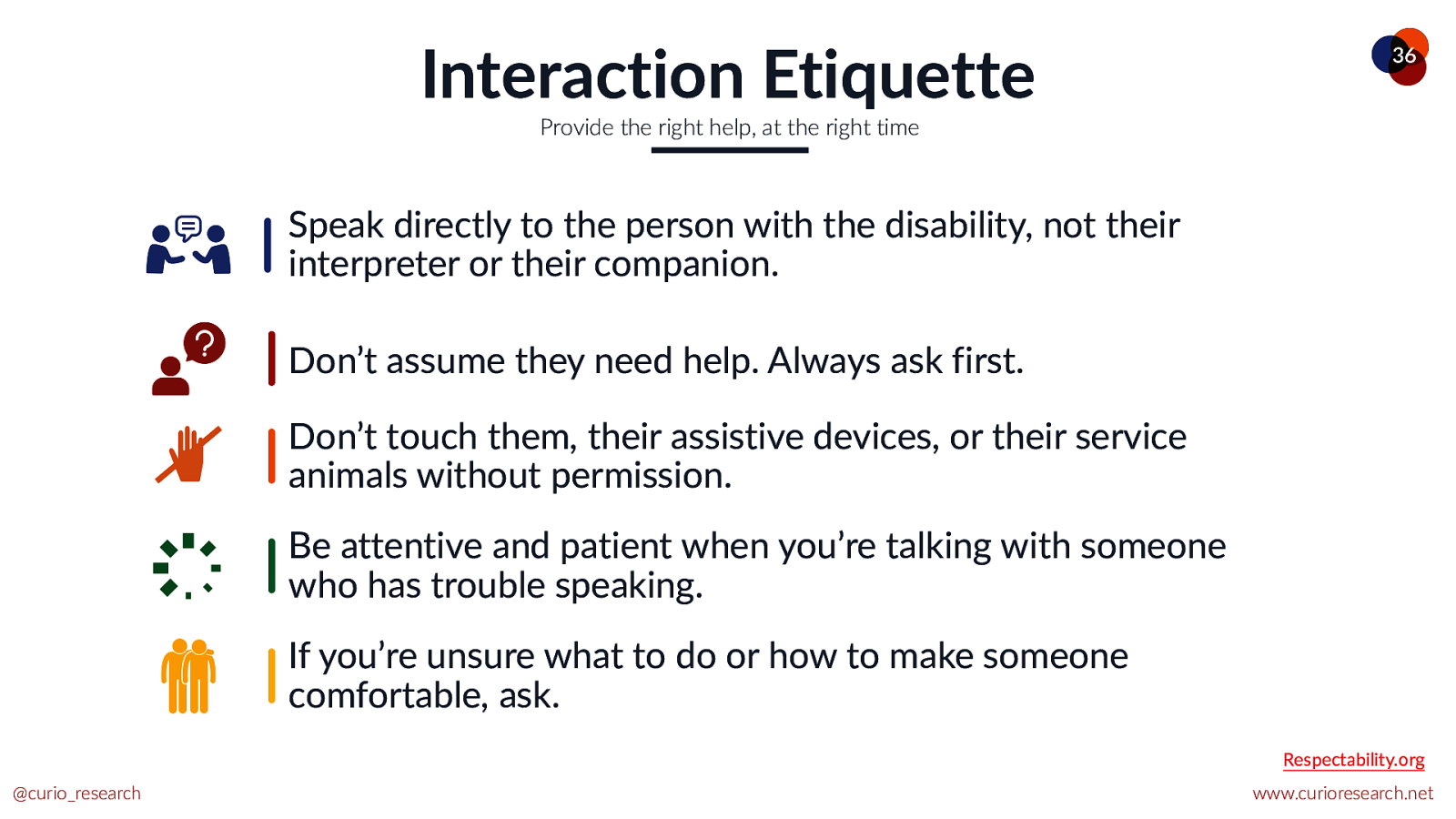
Interaction Etiquette 36 Provide the right help, at the right time Speak directly to the person with the disability, not their interpreter or their companion. Don’t assume they need help. Always ask first. Don’t touch them, their assistive devices, or their service animals without permission. Be attentive and patient when you’re talking with someone who has trouble speaking. If you’re unsure what to do or how to make someone comfortable, ask. Respectability.org @curio_research www.curioresearch.net
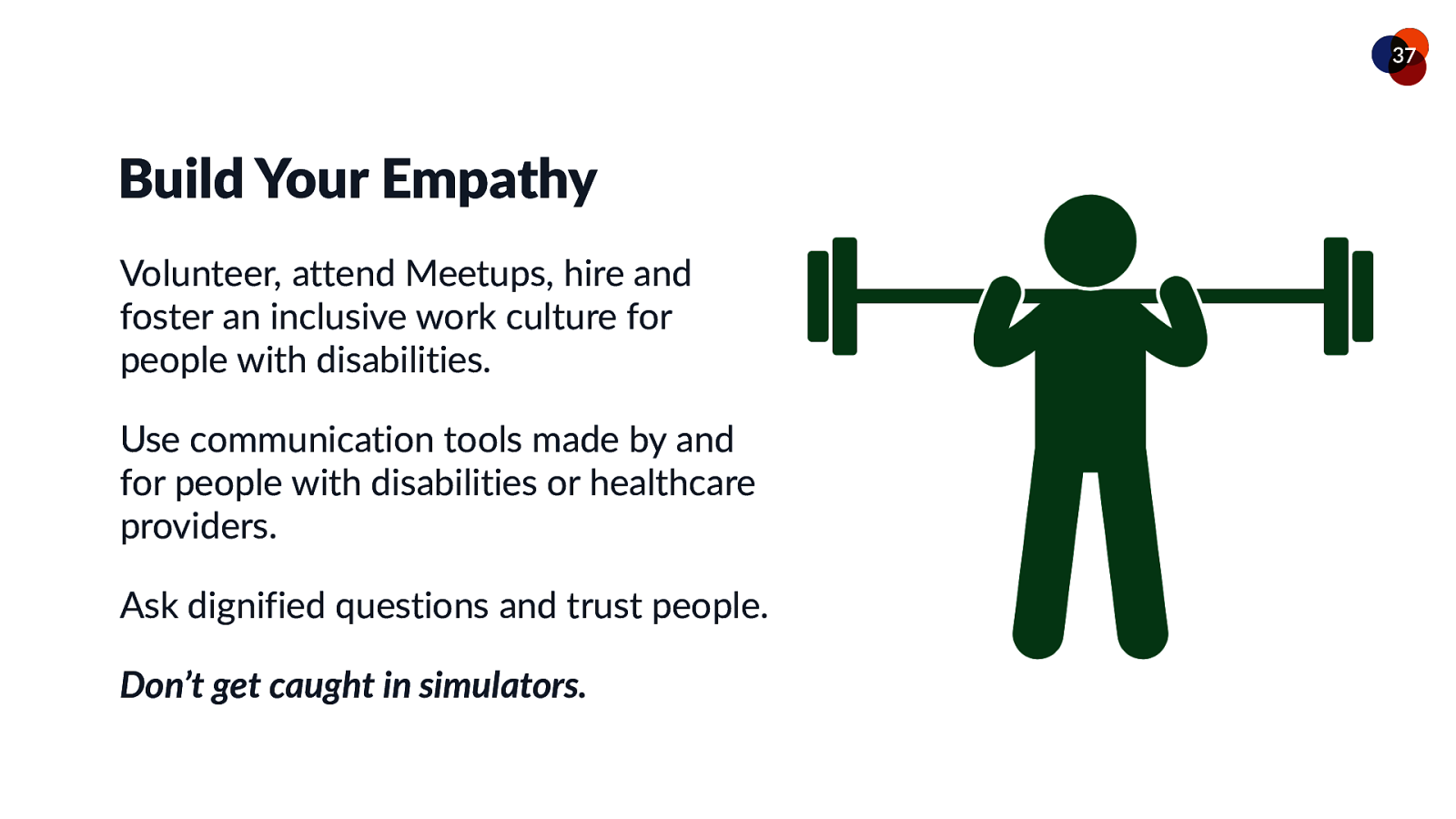
37 Build Your Empathy Volunteer, attend Meetups, hire and foster an inclusive work culture for people with disabilities. Use communication tools made by and for people with disabilities or healthcare providers. Ask dignified questions and trust people. Don’t get caught in simulators. www.companyname.com © 2016 Jetfabrik Multipurpose Theme. All Rights Reserved.
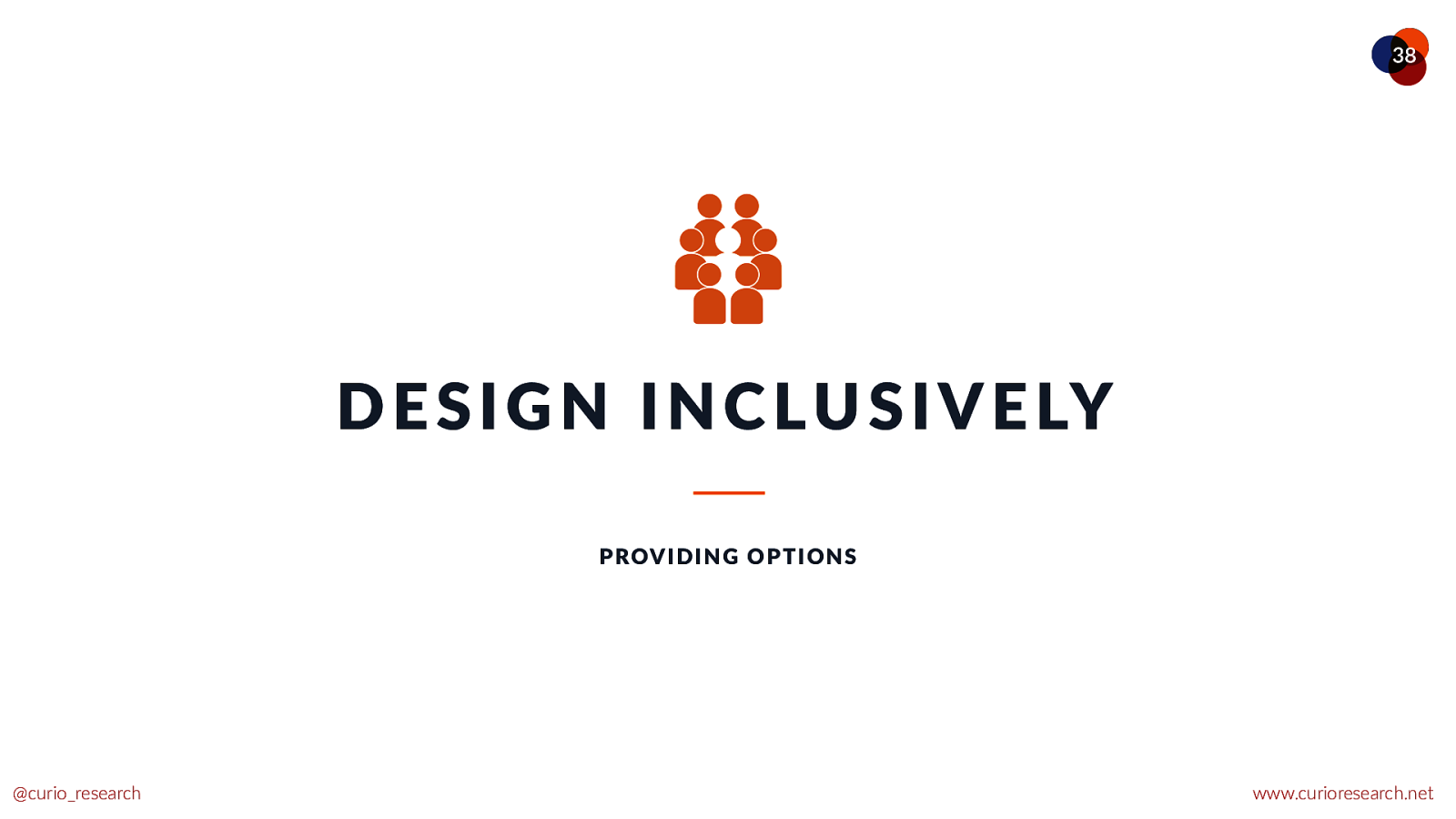
38 D E S I G N I N C L U S I V E LY P ROV I D I N G O P T I O N S @curio_research www.curioresearch.net
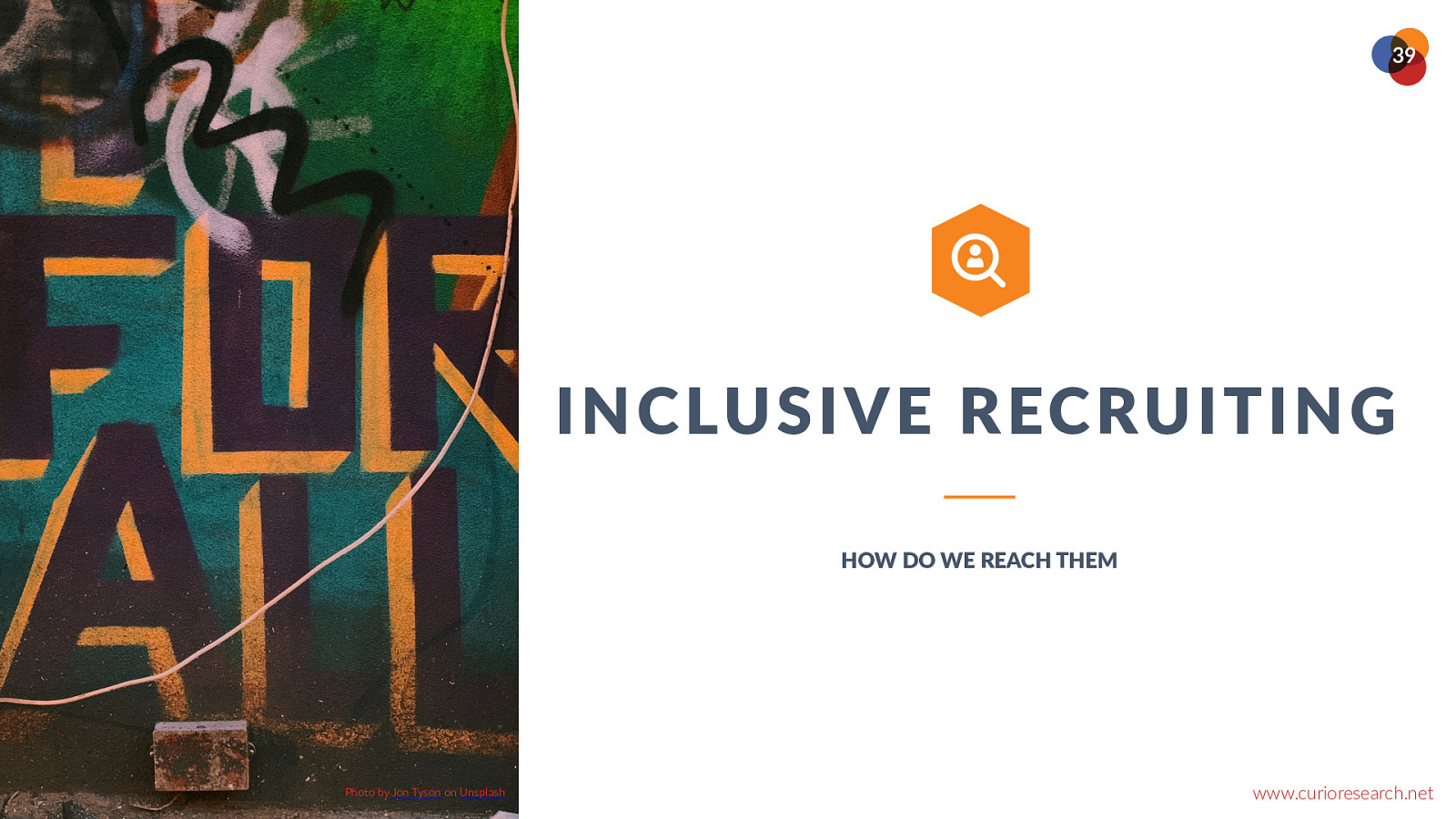
39 ABOUT Over the course of the last decade, however, we seem to have reached a general agreement that creativity involves the production of novel, useful products words, the production of something original and worthwhile. Authors have diverged. Hundred different analyses can be found in INCLUSIVE RECRUITING the literature. As an illustration, one process given described it as a process of becoming sensitive to problems, deficiencies, gaps in knowledge, missing elements, disharmonies, HOW DO WE REACH THEM and so on identifying the difficulty searching for solutions. @curio_research Photo by Jon Tyson on Unsplash www.curioresearch.net
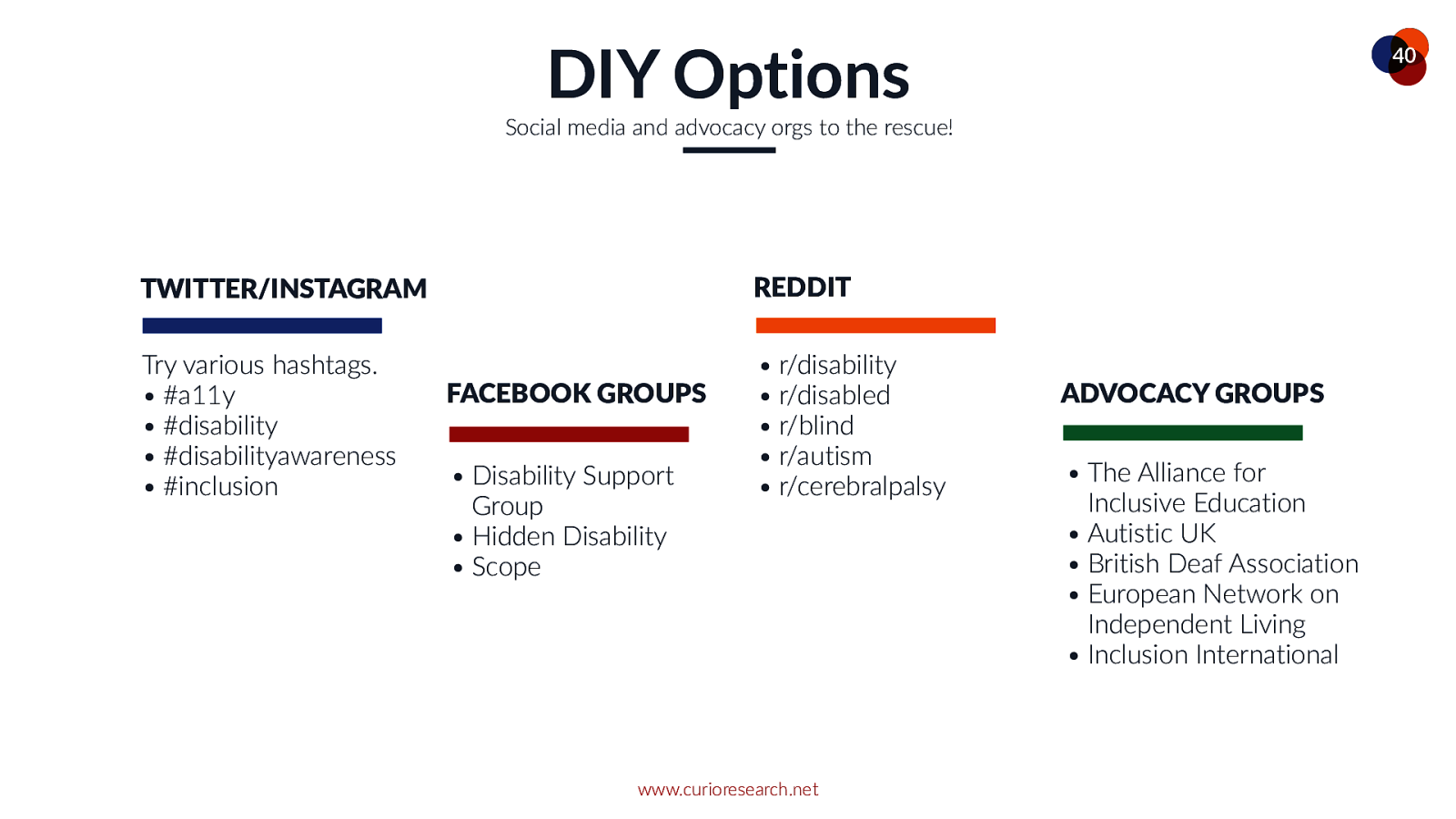
DIY Options 40 Social media and advocacy orgs to the rescue! TWITTER/INSTAGRAM REDDIT Try various hashtags. • #a11y • #disability • #disabilityawareness • #inclusion • r/disability • r/disabled • r/blind • r/autism • r/cerebralpalsy FACEBOOK GROUPS • Disability Support Group • Hidden Disability • Scope www.curioresearch.net ADVOCACY GROUPS • The Alliance for Inclusive Education • Autistic UK • British Deaf Association • European Network on Independent Living • Inclusion International
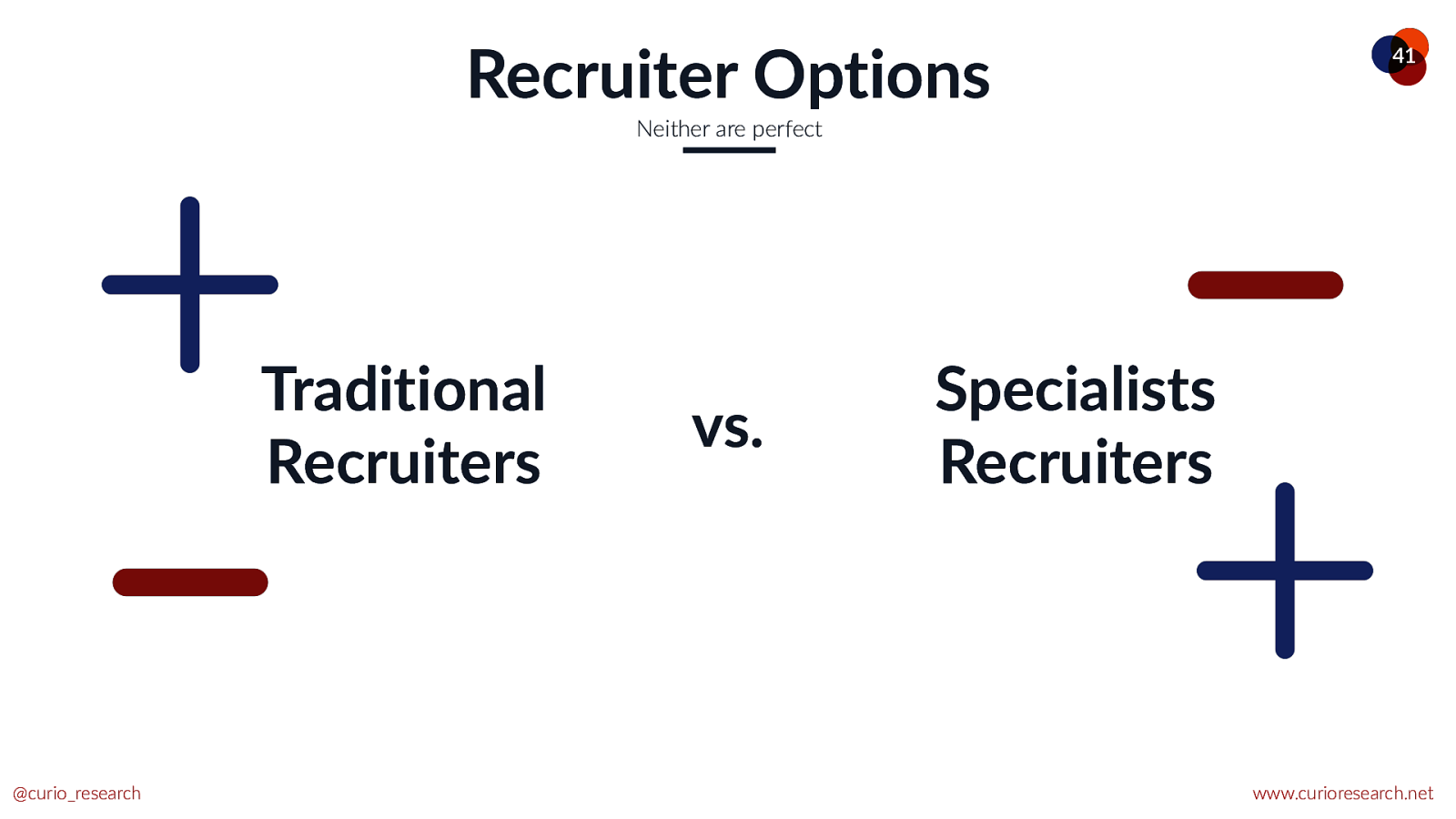
Recruiter Options 41 Neither are perfect Traditional Recruiters @curio_research vs. Specialists Recruiters www.curioresearch.net
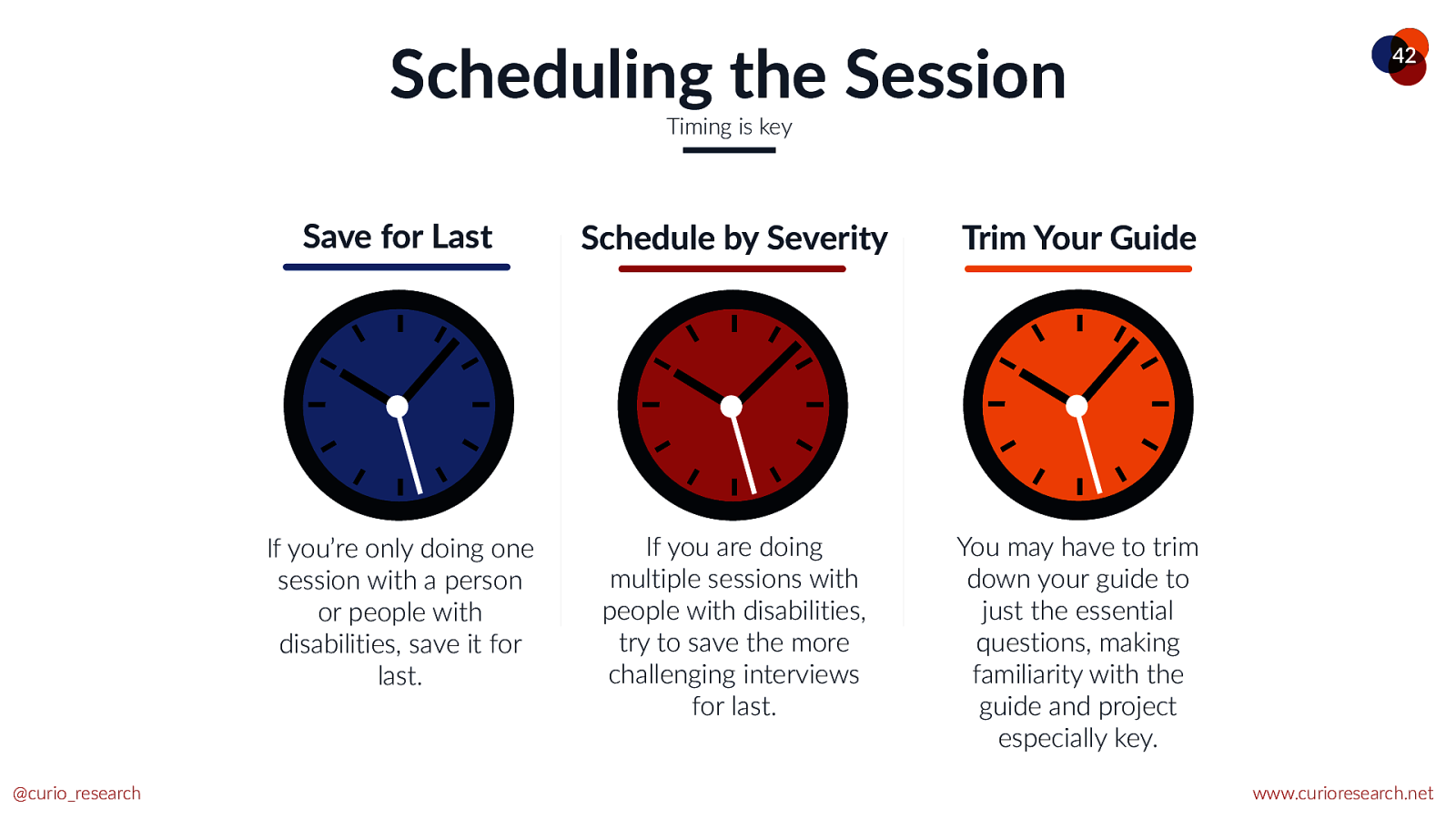
Scheduling the Session 42 Timing is key @curio_research Save for Last Schedule by Severity Trim Your Guide If you’re only doing one session with a person or people with disabilities, save it for last. If you are doing multiple sessions with people with disabilities, try to save the more challenging interviews for last. You may have to trim down your guide to just the essential questions, making familiarity with the guide and project especially key. www.curioresearch.net
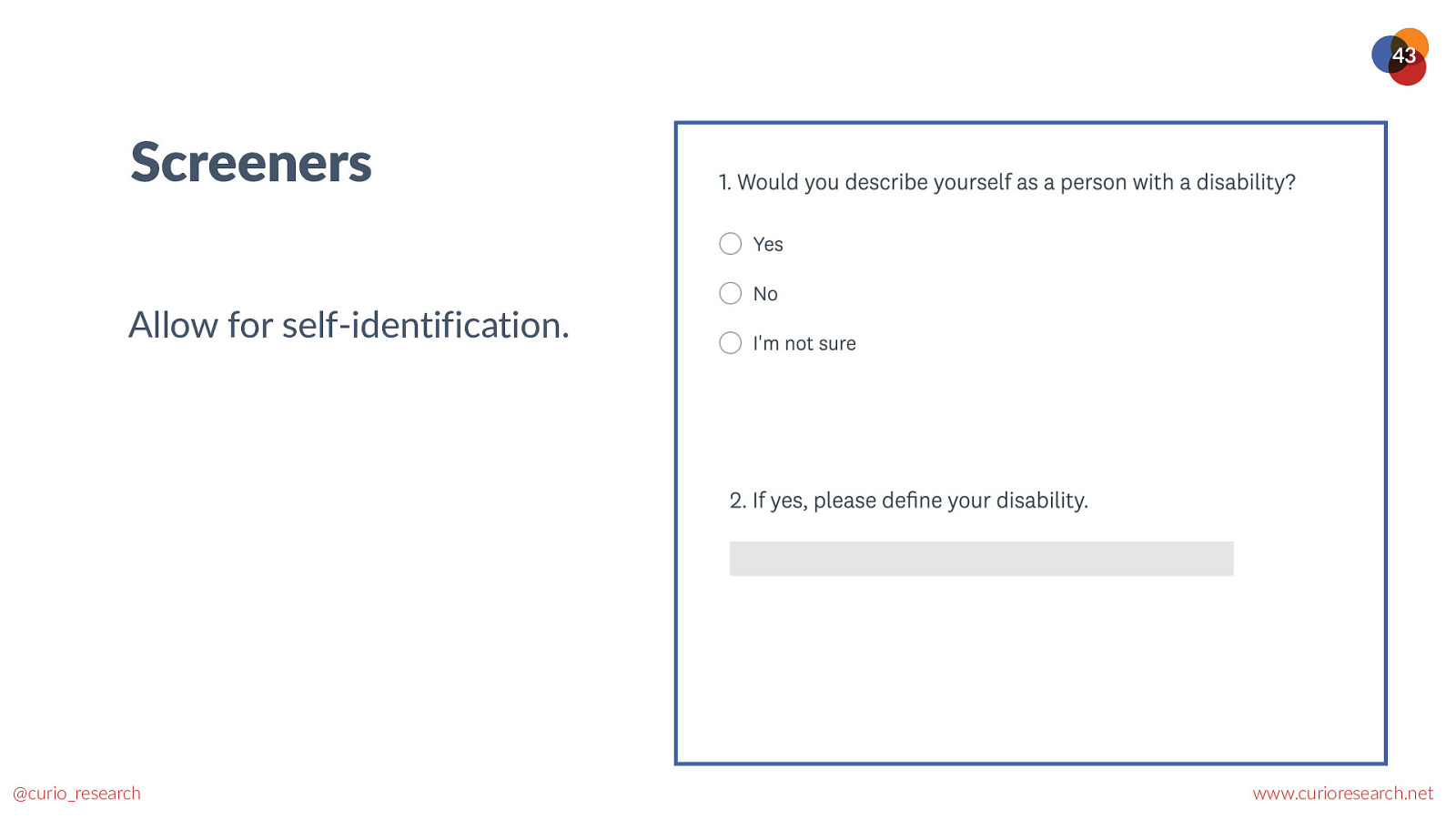
43 Screeners Allow for self-identification. @curio_research www.curioresearch.net
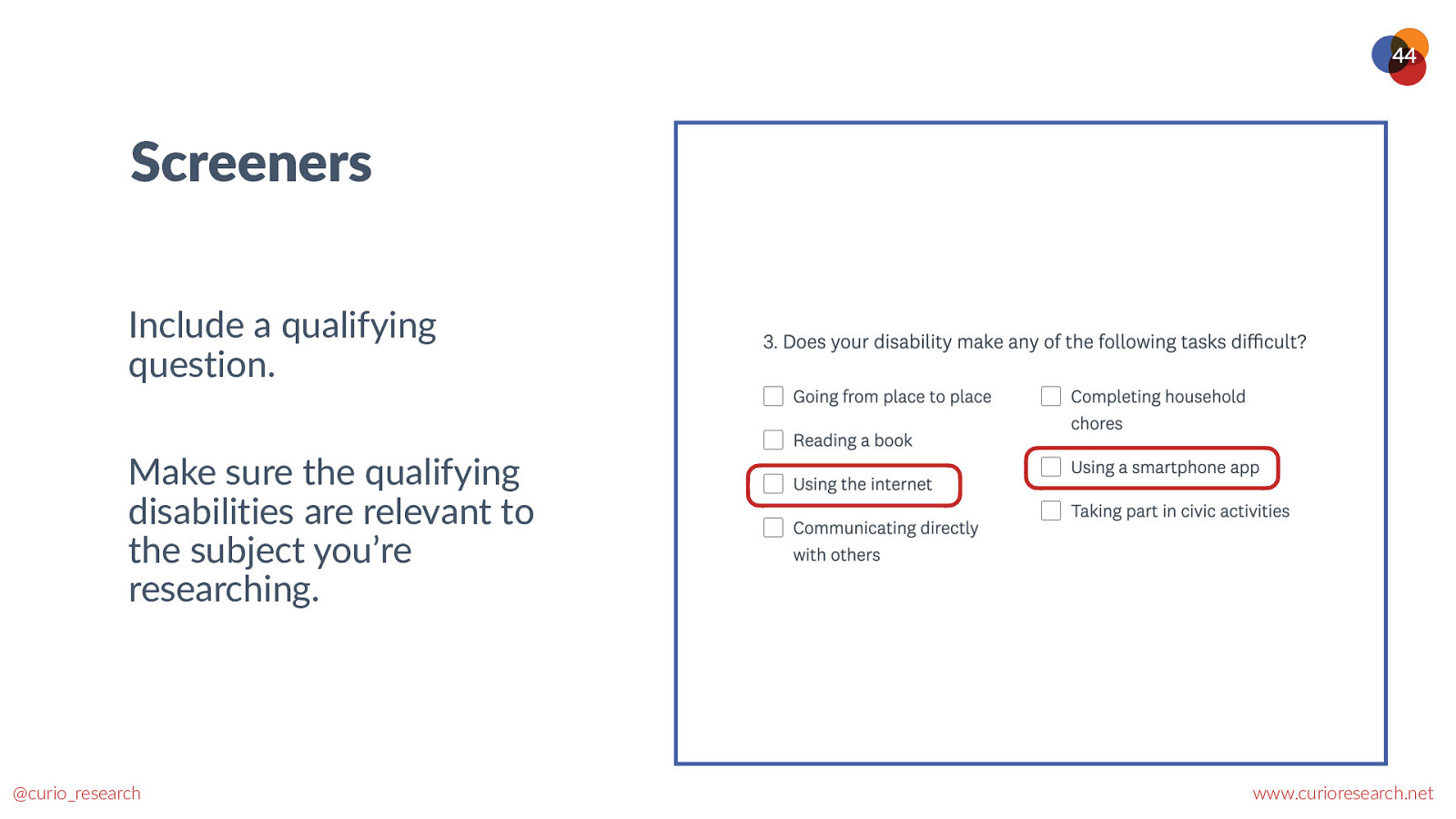
44 Screeners Include a qualifying question. Make sure the qualifying disabilities are relevant to the subject you’re researching. @curio_research www.curioresearch.net
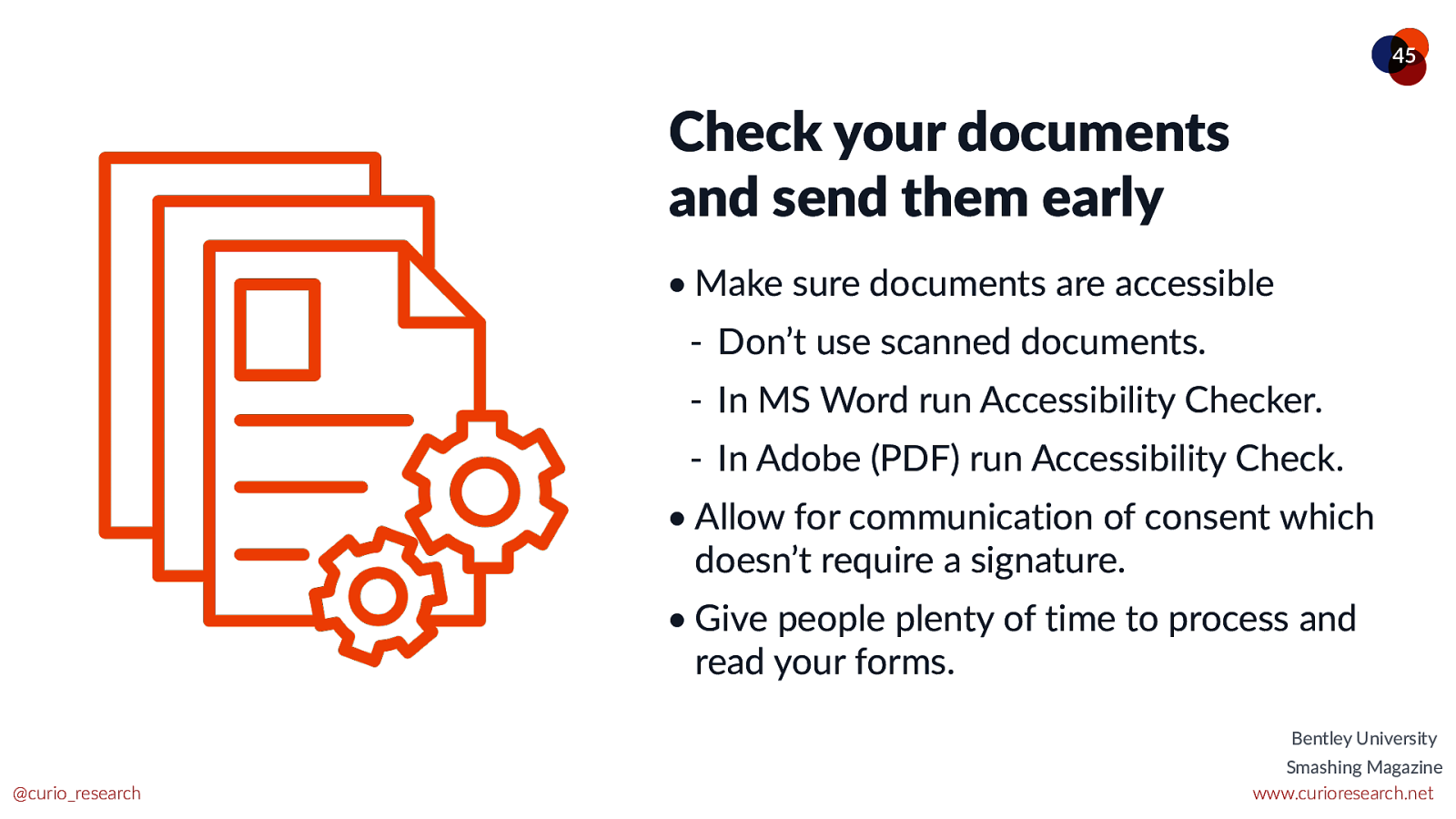
45 Check your documents and send them early • Make sure documents are accessible - Don’t use scanned documents. - In MS Word run Accessibility Checker. - In Adobe (PDF) run Accessibility Check. • Allow for communication of consent which doesn’t require a signature. • Give people plenty of time to process and read your forms. Bentley University @curio_research Smashing Magazine www.curioresearch.net
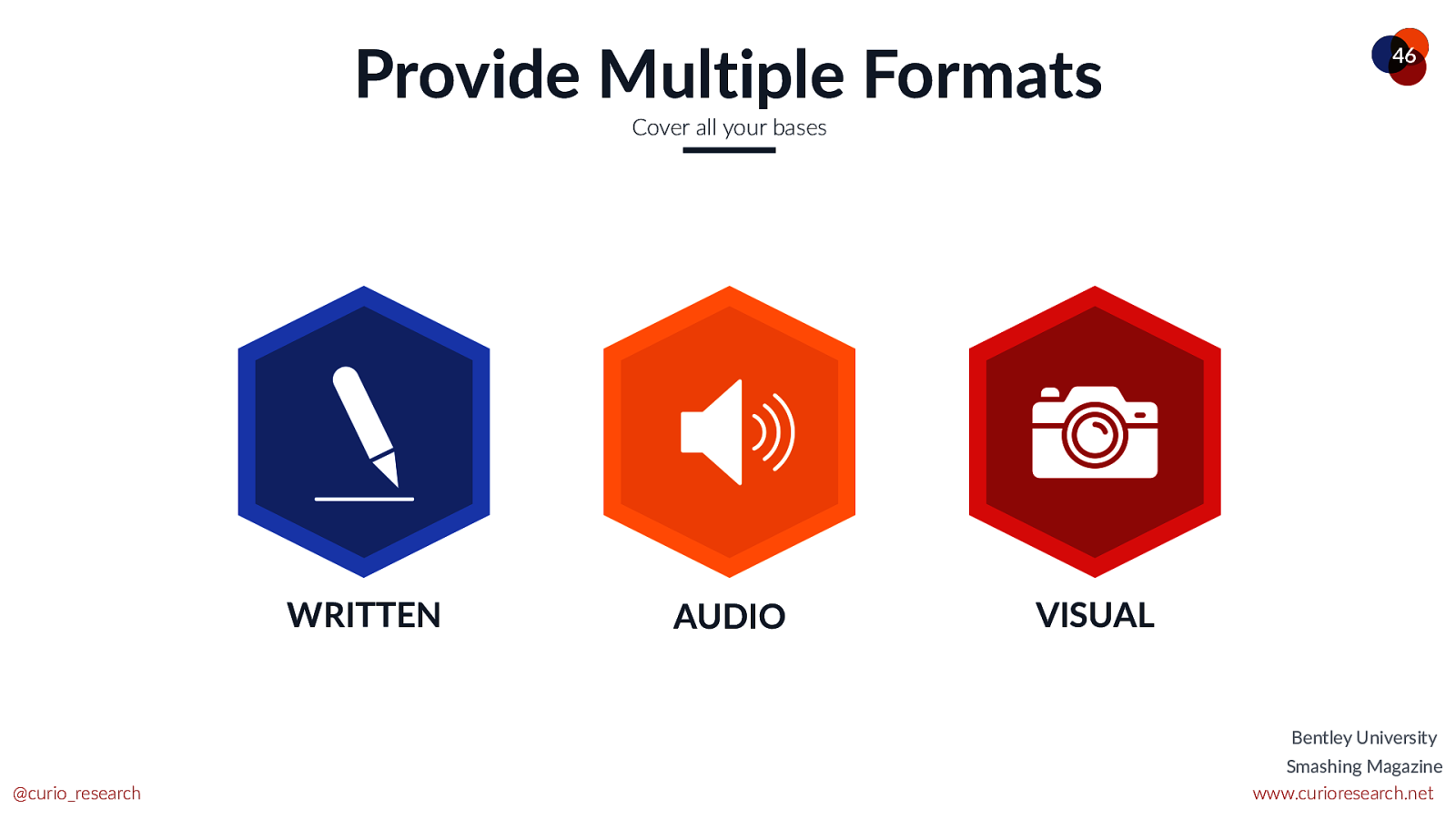
Provide Multiple Formats 46 Cover all your bases WRITTEN AUDIO VISUAL Bentley University @curio_research Smashing Magazine www.curioresearch.net
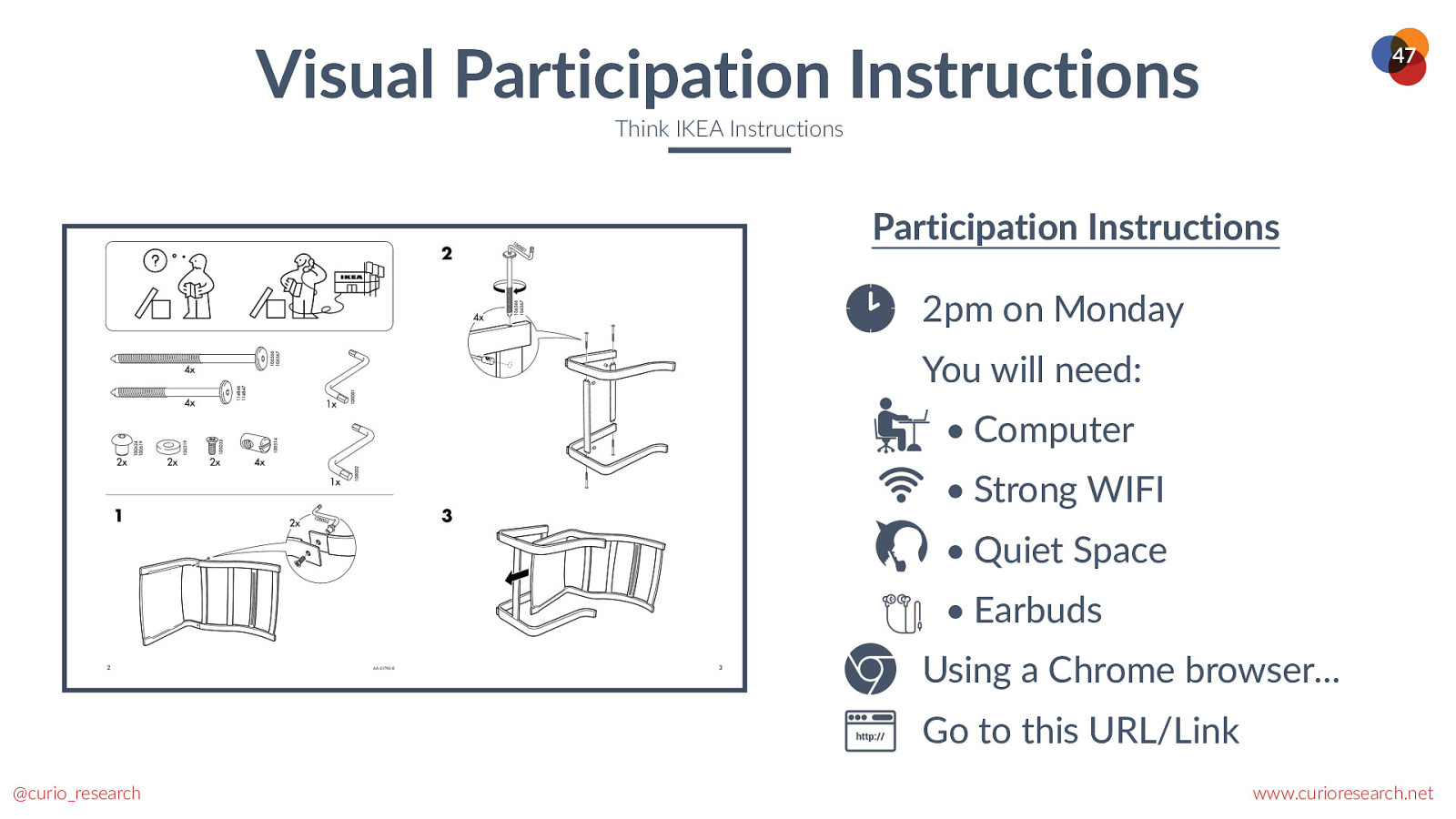
Visual Participation Instructions 47 Think IKEA Instructions Participation Instructions 2pm on Monday You will need: • Computer • Strong WIFI • Quiet Space • Earbuds Using a Chrome browser… Go to this URL/Link @curio_research www.curioresearch.net
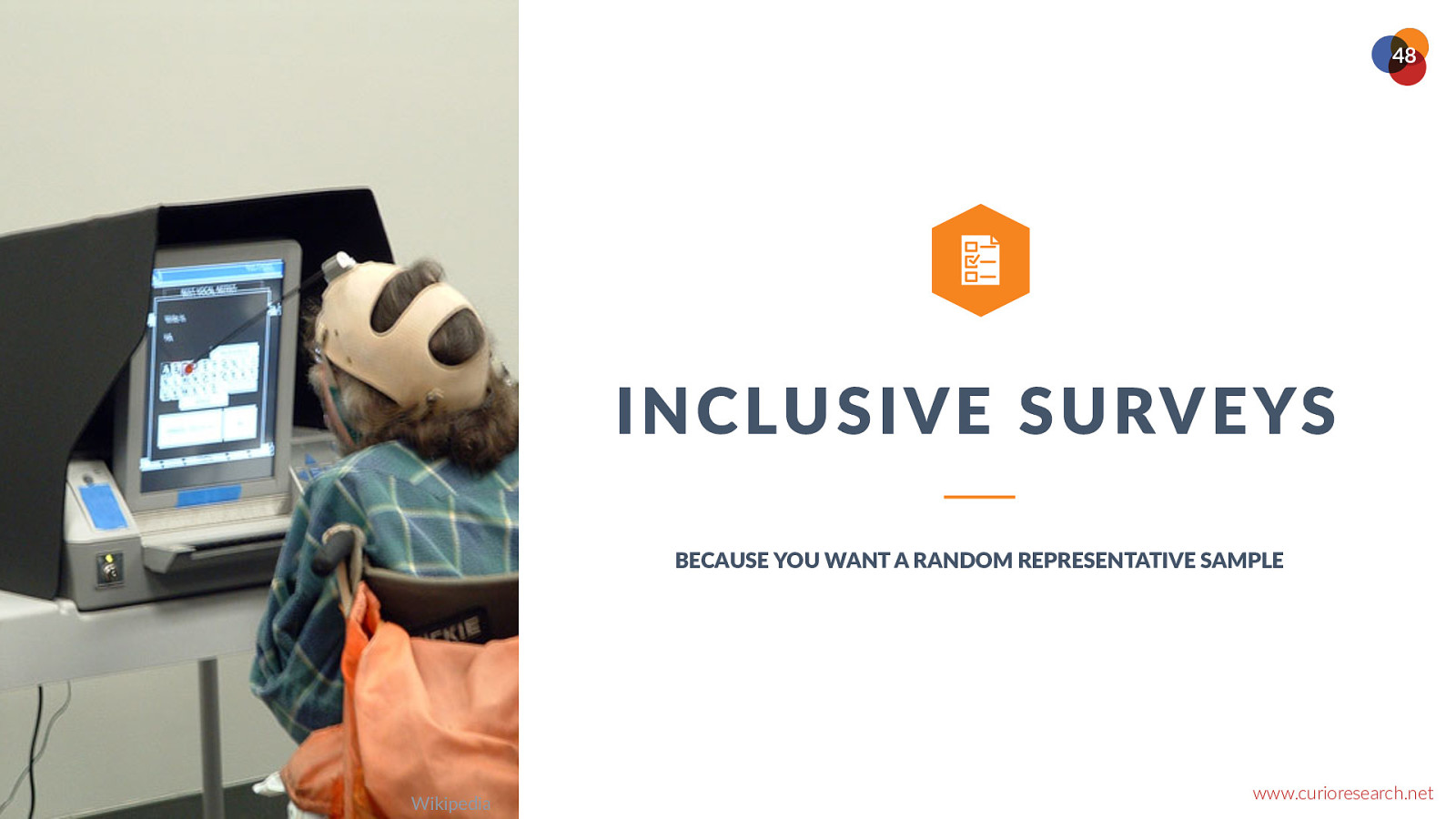
48 ABOUT Over the course of the last decade, however, we seem to have reached a general agreement that creativity involves the production of novel, useful products words, the production of something original and worthwhile. Authors have diverged. Hundred different analyses can be found in INCLUSIVE SURVEYS the literature. As an illustration, one process given described it as a process of becoming sensitive to problems, deficiencies, gaps in knowledge, missing elements, disharmonies, BECAUSE YOU WANT A RANDOM REPRESENTATIVE SAMPLE and so on identifying the difficulty searching for solutions. @curio_research Wikipedia www.curioresearch.net
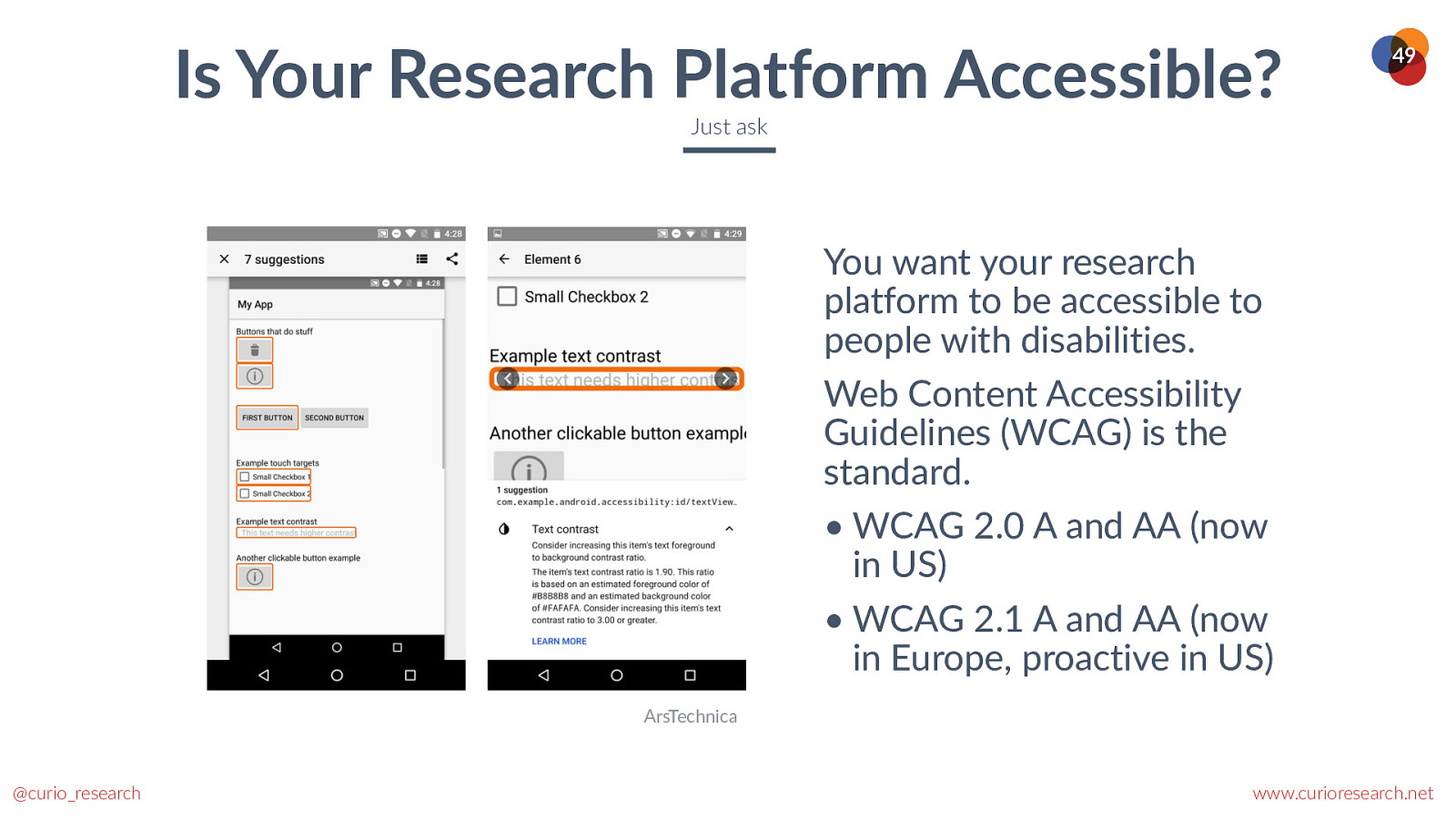
Is Your Research Platform Accessible? 49 Just ask You want your research platform to be accessible to people with disabilities. Web Content Accessibility Guidelines (WCAG) is the standard. • WCAG 2.0 A and AA (now in US) • WCAG 2.1 A and AA (now in Europe, proactive in US) ArsTechnica @curio_research www.curioresearch.net
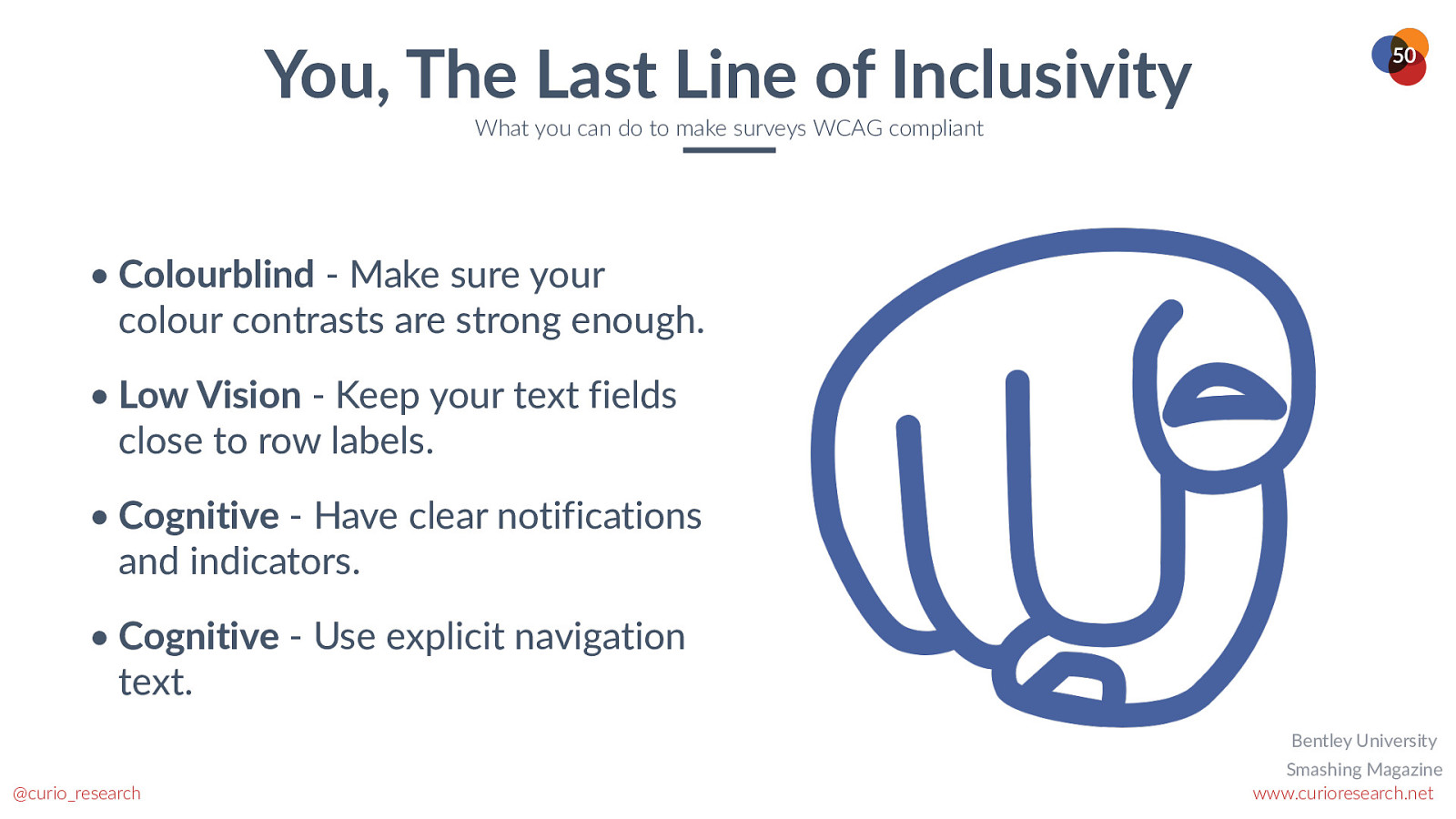
You, The Last Line of Inclusivity 50 What you can do to make surveys WCAG compliant • Colourblind - Make sure your colour contrasts are strong enough. • Low Vision - Keep your text fields close to row labels. • Cognitive - Have clear notifications and indicators. • Cognitive - Use explicit navigation text. Bentley University @curio_research Smashing Magazine www.curioresearch.net
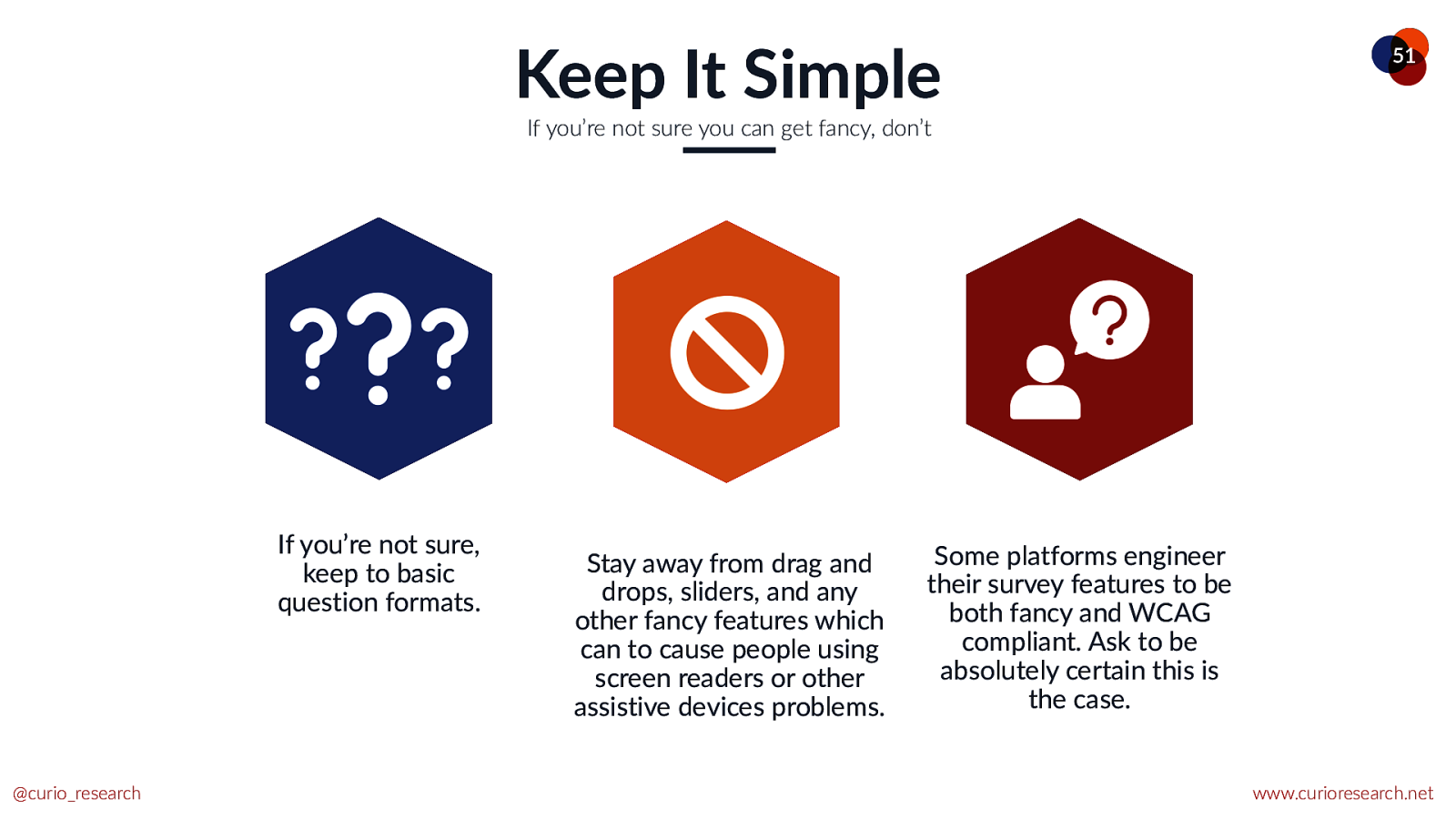
Keep It Simple 51 If you’re not sure you can get fancy, don’t If you’re not sure, keep to basic question formats. @curio_research Stay away from drag and drops, sliders, and any other fancy features which can to cause people using screen readers or other assistive devices problems. Some platforms engineer their survey features to be both fancy and WCAG compliant. Ask to be absolutely certain this is the case. www.curioresearch.net
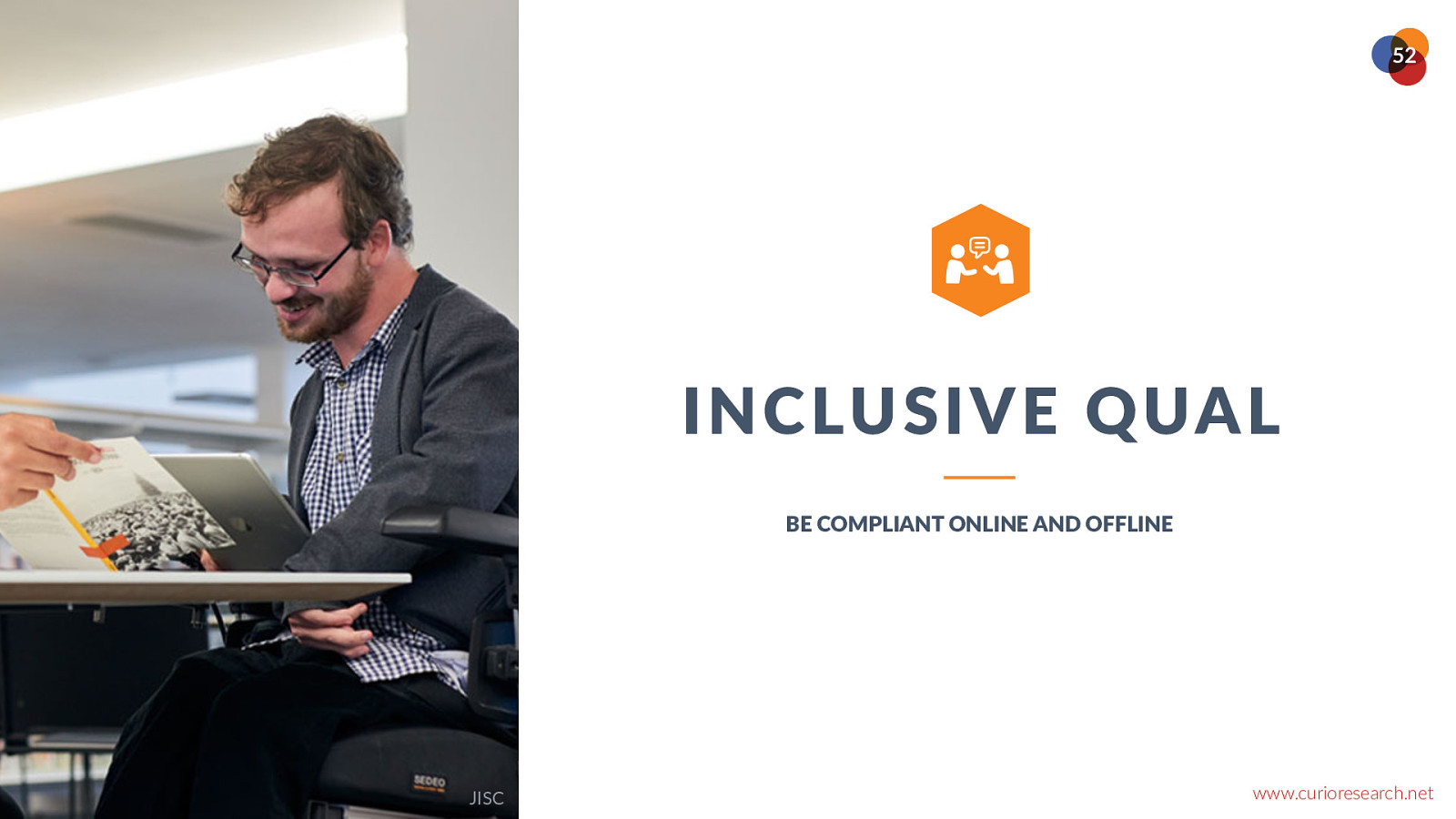
52 ABOUT Over the course of the last decade, however, we seem to have reached a general agreement that creativity involves the production of novel, useful products words, the production of something original and worthwhile. Authors have diverged. INCLUSIVE QUAL Hundred different analyses can be found in the literature. As an illustration, one process given described it as a process of becoming BE COMPLIANT ONLINE AND OFFLINE sensitive to problems, deficiencies, gaps in knowledge, missing elements, disharmonies, and so on identifying the difficulty searching for solutions. @curio_research JISC www.curioresearch.net
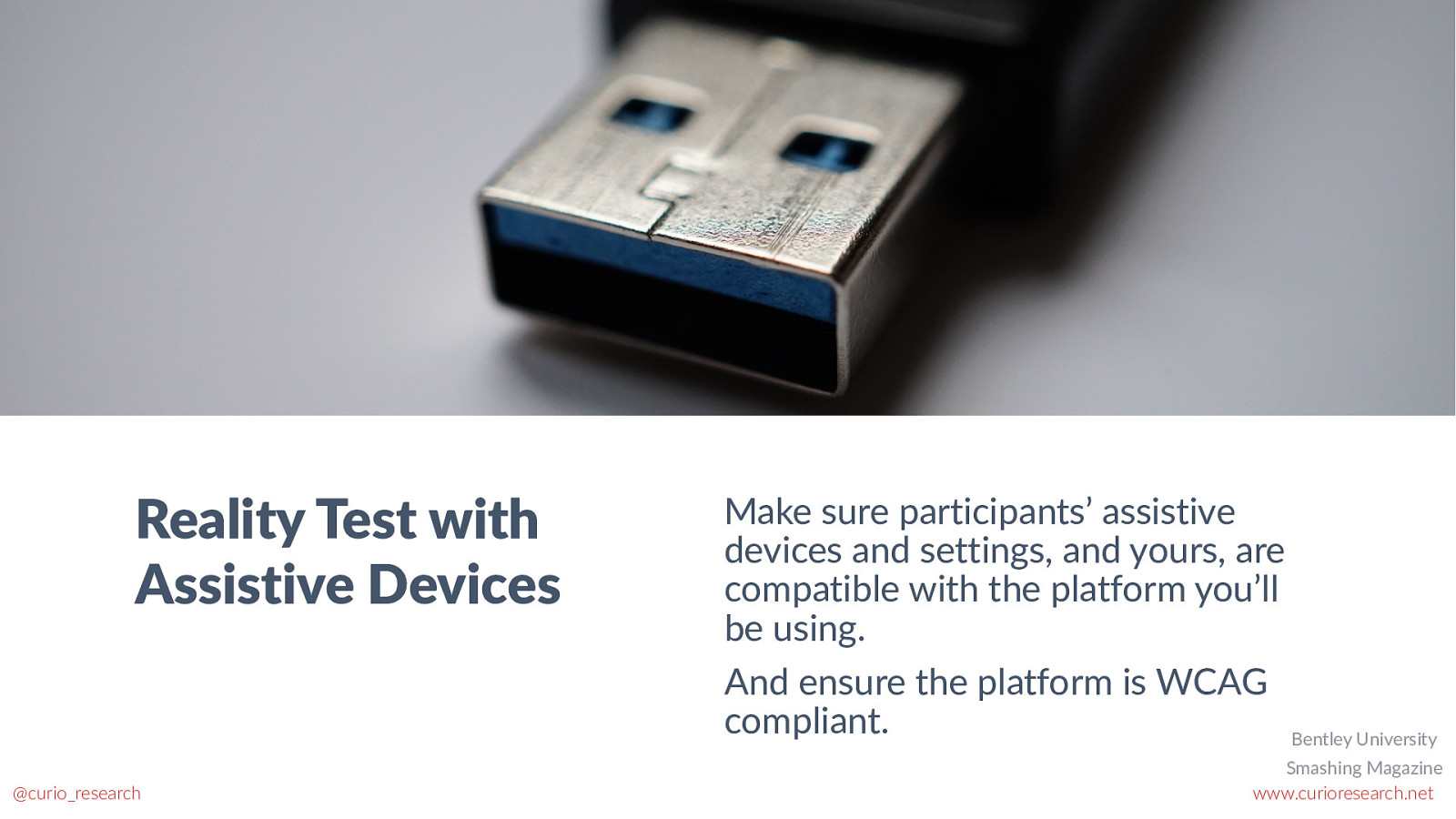
53 Reality Test with Assistive Devices @curio_research Make sure participants’ assistive devices and settings, and yours, are compatible with the platform you’ll be using. And ensure the platform is WCAG compliant. Bentley University Smashing Magazine www.curioresearch.net
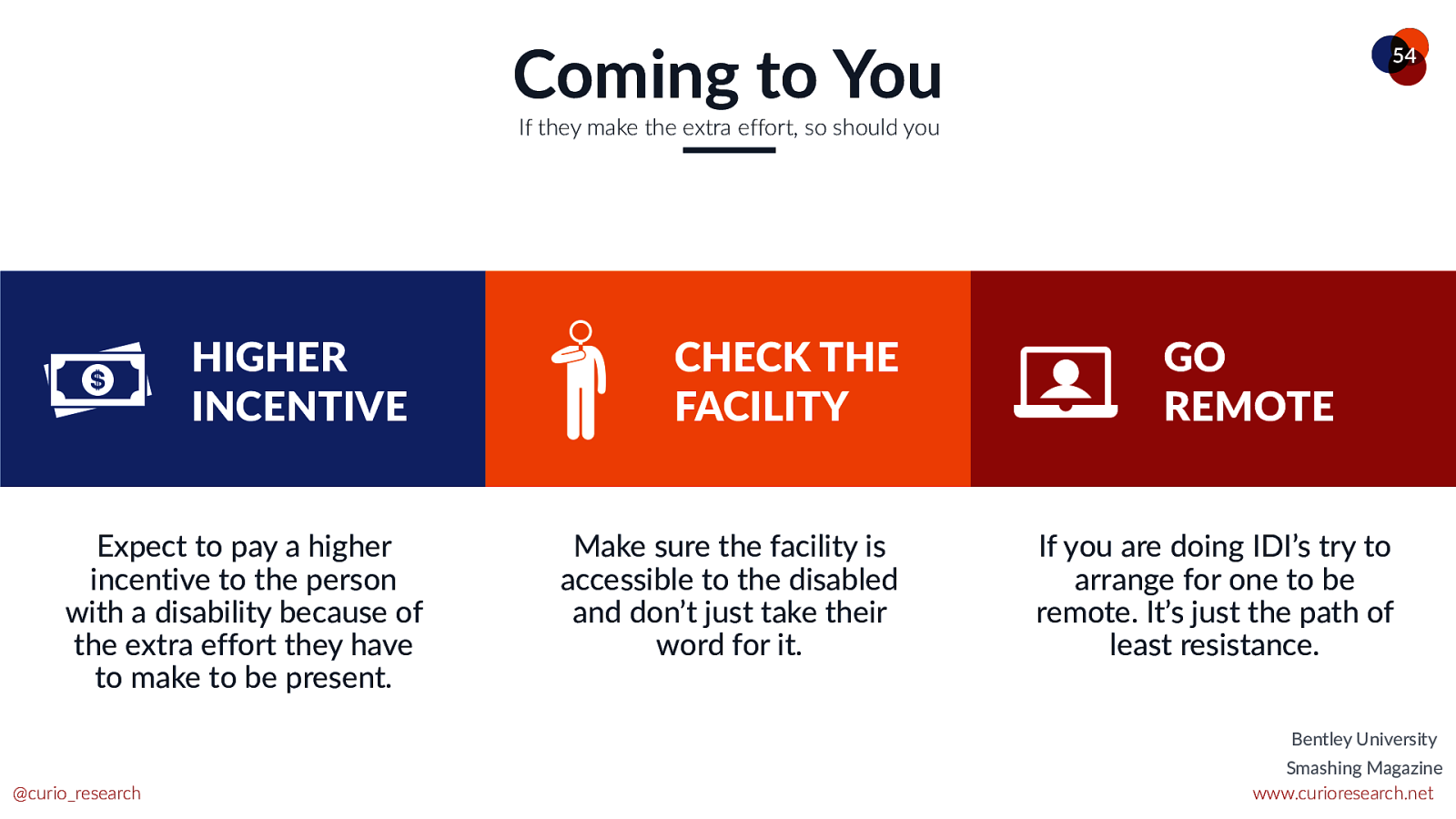
Coming to You 54 If they make the extra effort, so should you HIGHER INCENTIVE Expect to pay a higher incentive to the person with a disability because of the extra effort they have to make to be present. CHECK THE FACILITY Make sure the facility is accessible to the disabled and don’t just take their word for it. GO REMOTE If you are doing IDI’s try to arrange for one to be remote. It’s just the path of least resistance. Bentley University @curio_research Smashing Magazine www.curioresearch.net
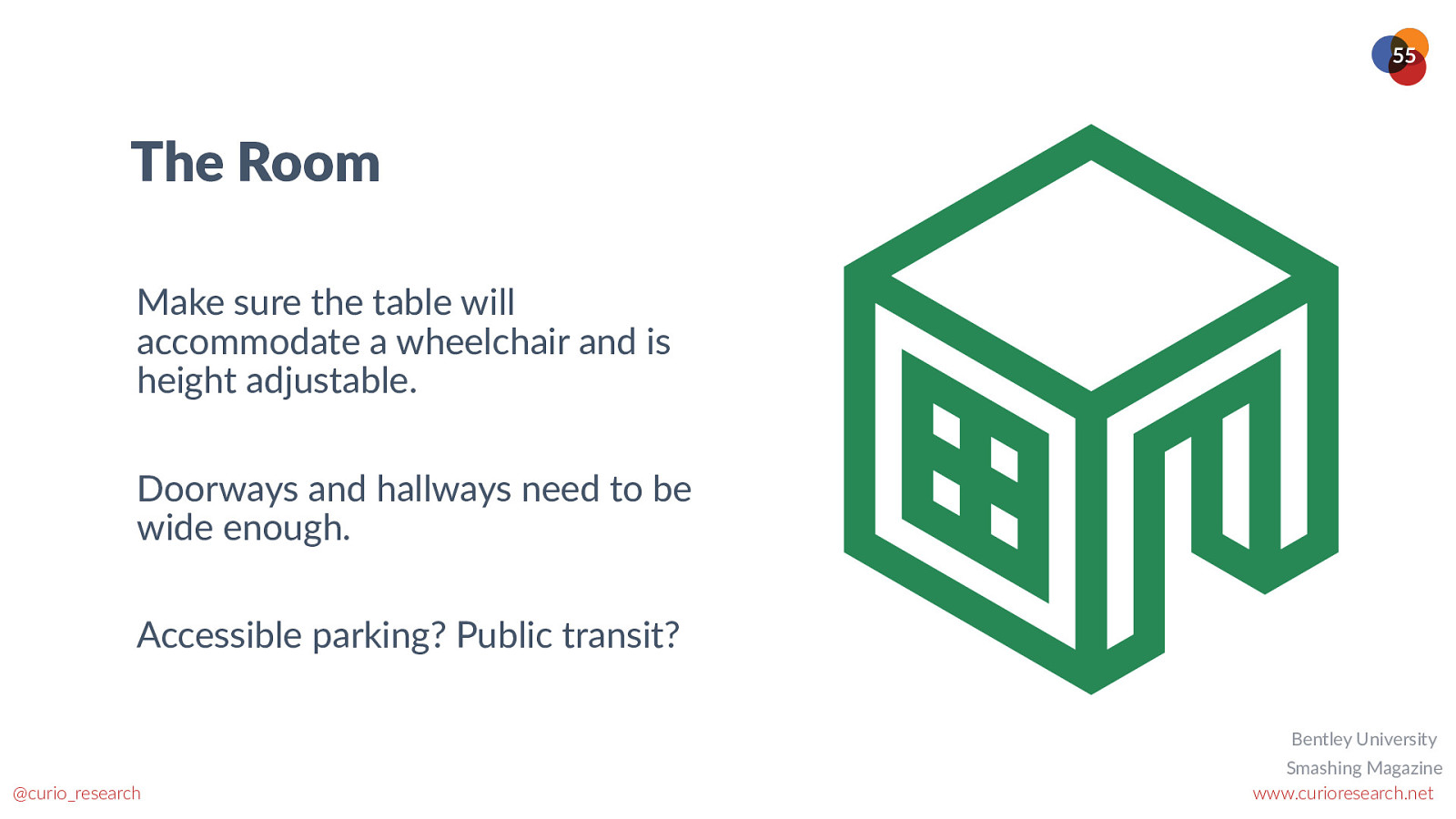
55 The Room Make sure the table will accommodate a wheelchair and is height adjustable. Doorways and hallways need to be wide enough. Accessible parking? Public transit? Bentley University @curio_research Smashing Magazine www.curioresearch.net
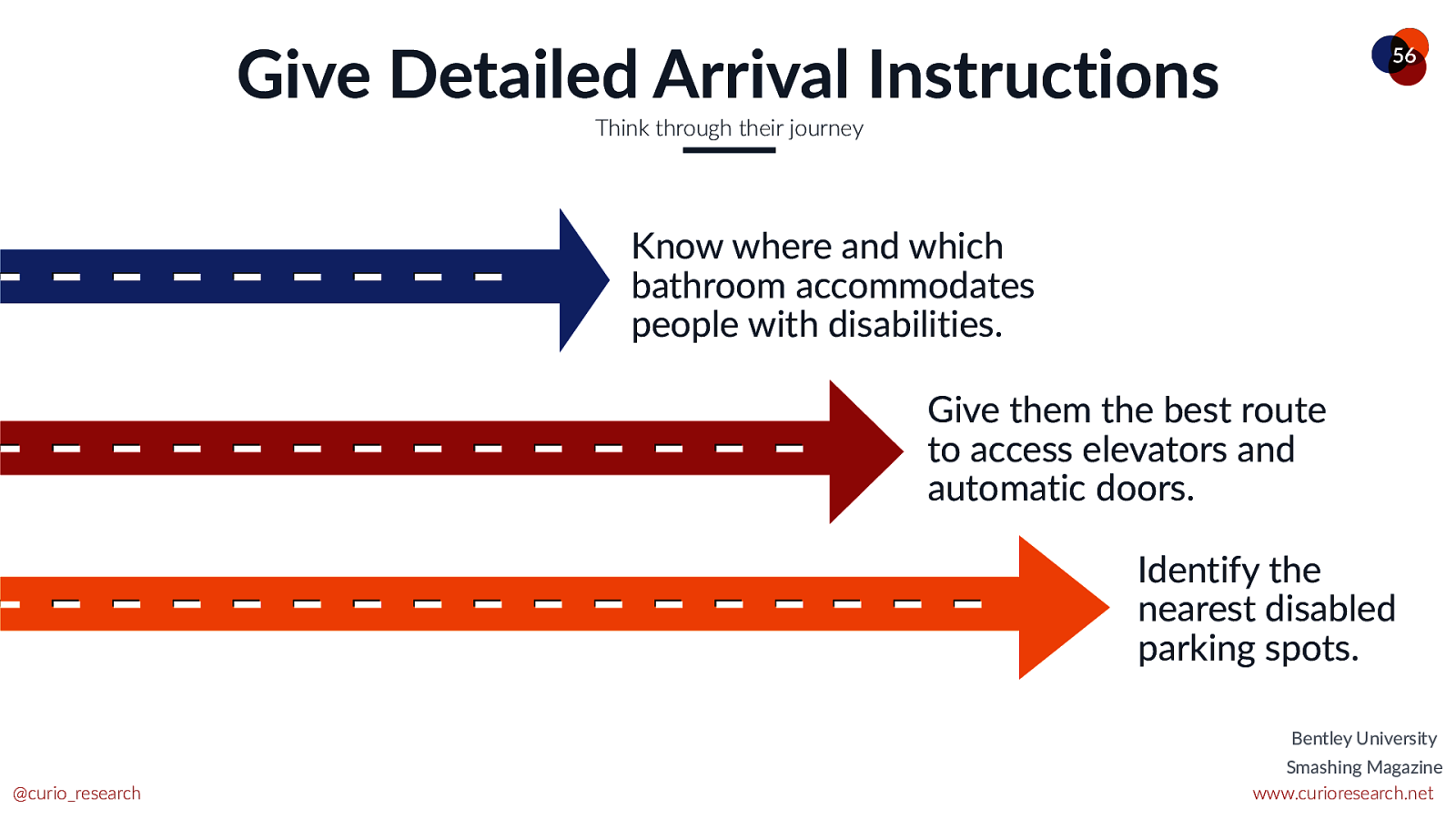
Give Detailed Arrival Instructions 56 Think through their journey Know where and which bathroom accommodates people with disabilities. Give them the best route to access elevators and automatic doors. Identify the nearest disabled parking spots. Bentley University @curio_research Smashing Magazine www.curioresearch.net
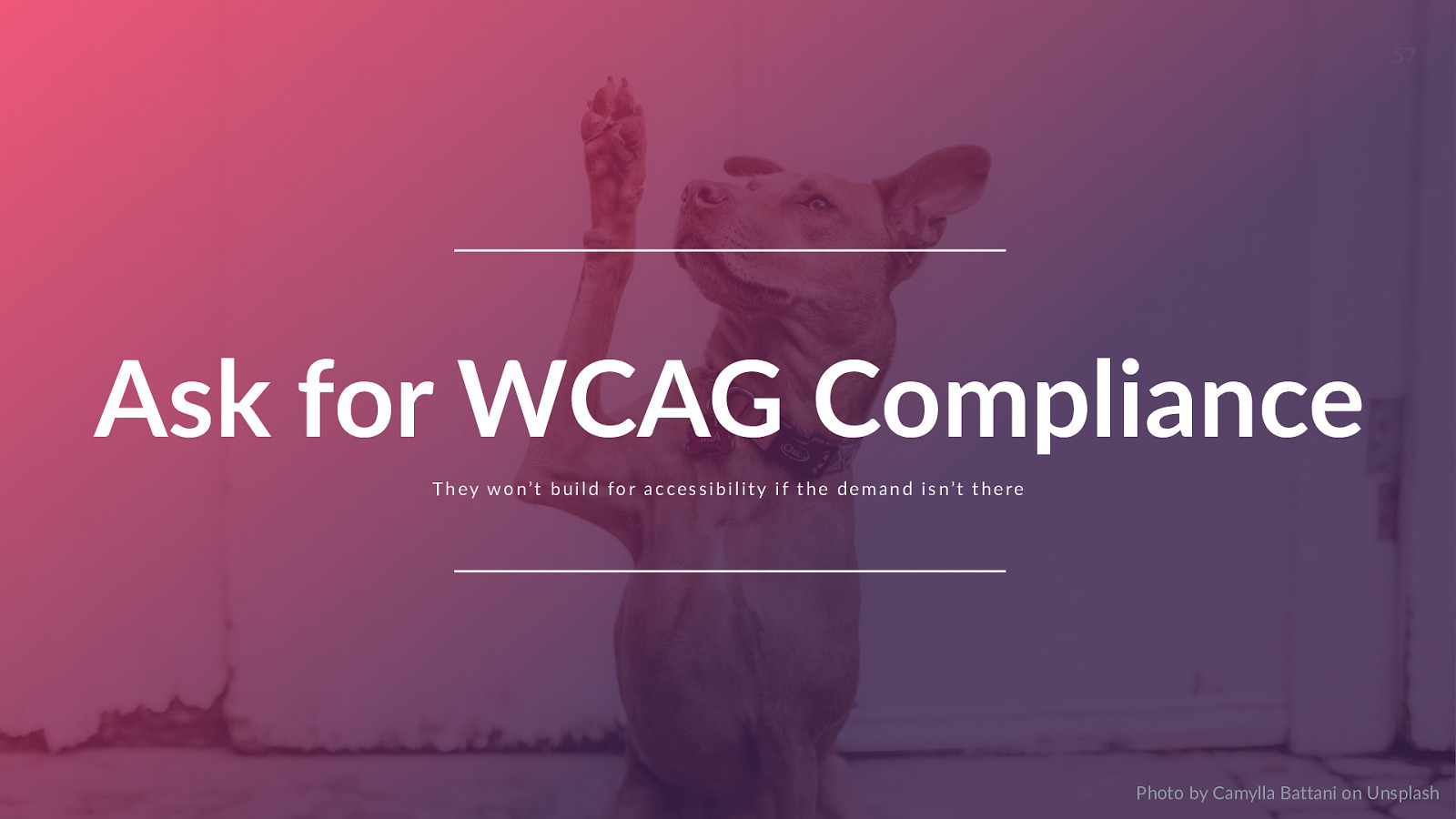
57 Ask for WCAG Compliance They won’t build for accessibility if the demand isn’t there @curio_research Photo by Camylla www.curioresearch.net Battani on Unsplash
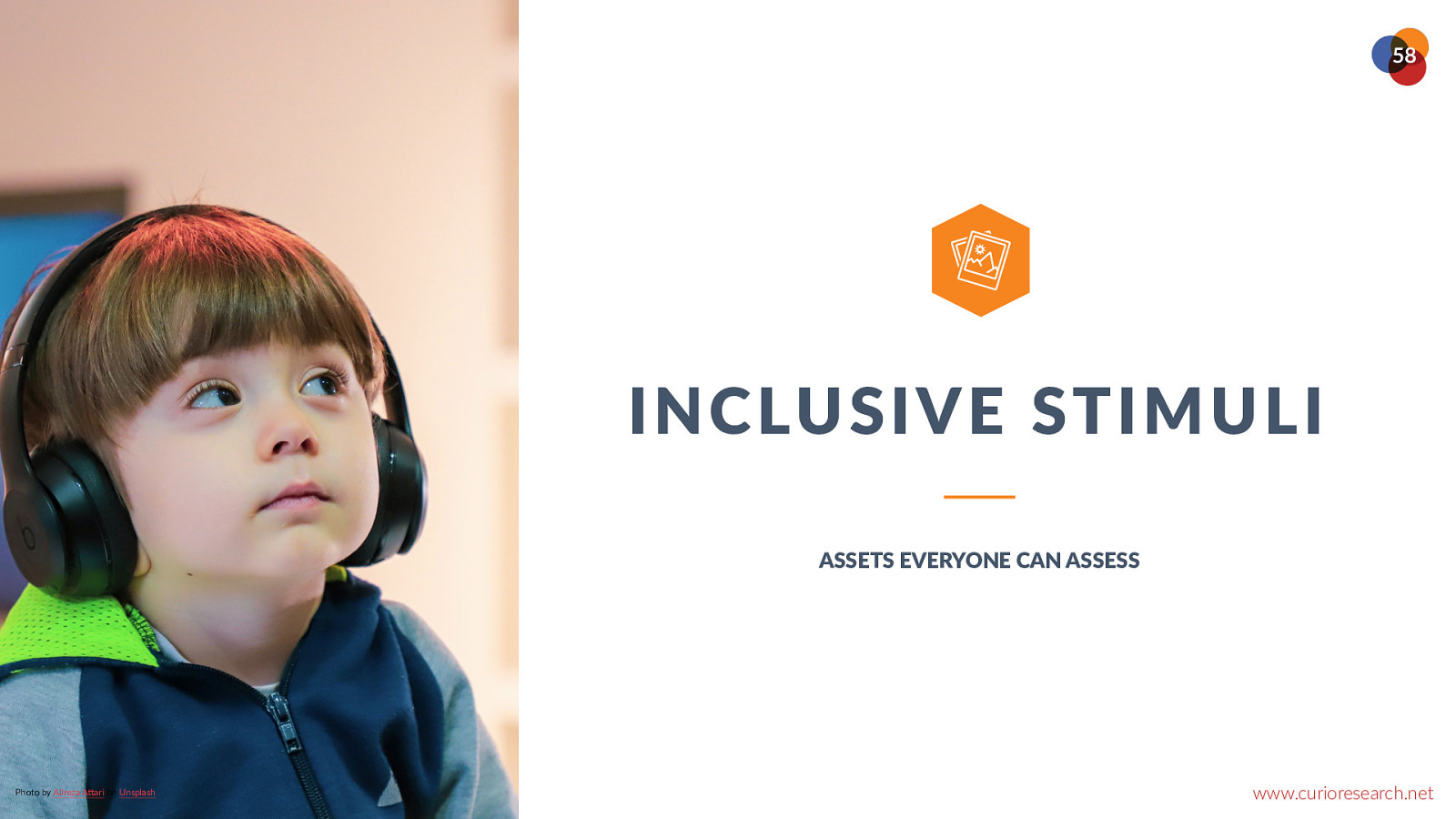
58 ABOUT Over the course of the last decade, however, we seem to have reached a general agreement that creativity involves the production of novel, useful products words, the production of something original and worthwhile. Authors have diverged. Hundred different analyses can be found in INCLUSIVE STIMULI the literature. As an illustration, one process given described it as a process of becoming sensitive to problems, deficiencies, gaps in knowledge, missing elements, disharmonies, ASSETS EVERYONE CAN ASSESS and so on identifying the difficulty searching for solutions. Photo by Alireza AFari on Unsplash @curio_research www.curioresearch.net
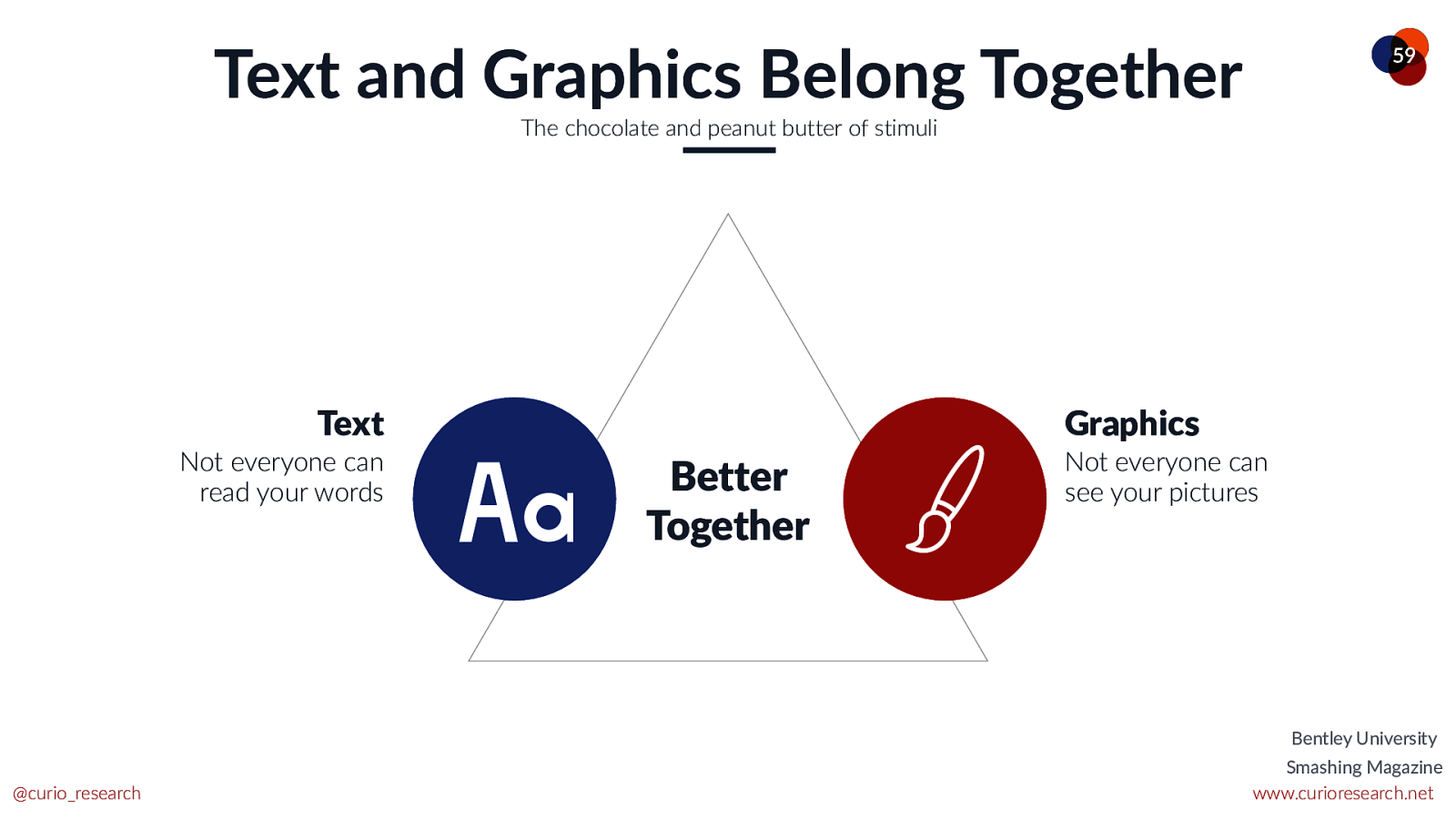
Text and Graphics Belong Together 59 The chocolate and peanut butter of stimuli Text Not everyone can read your words Graphics Better Together Not everyone can see your pictures Bentley University @curio_research Smashing Magazine www.curioresearch.net
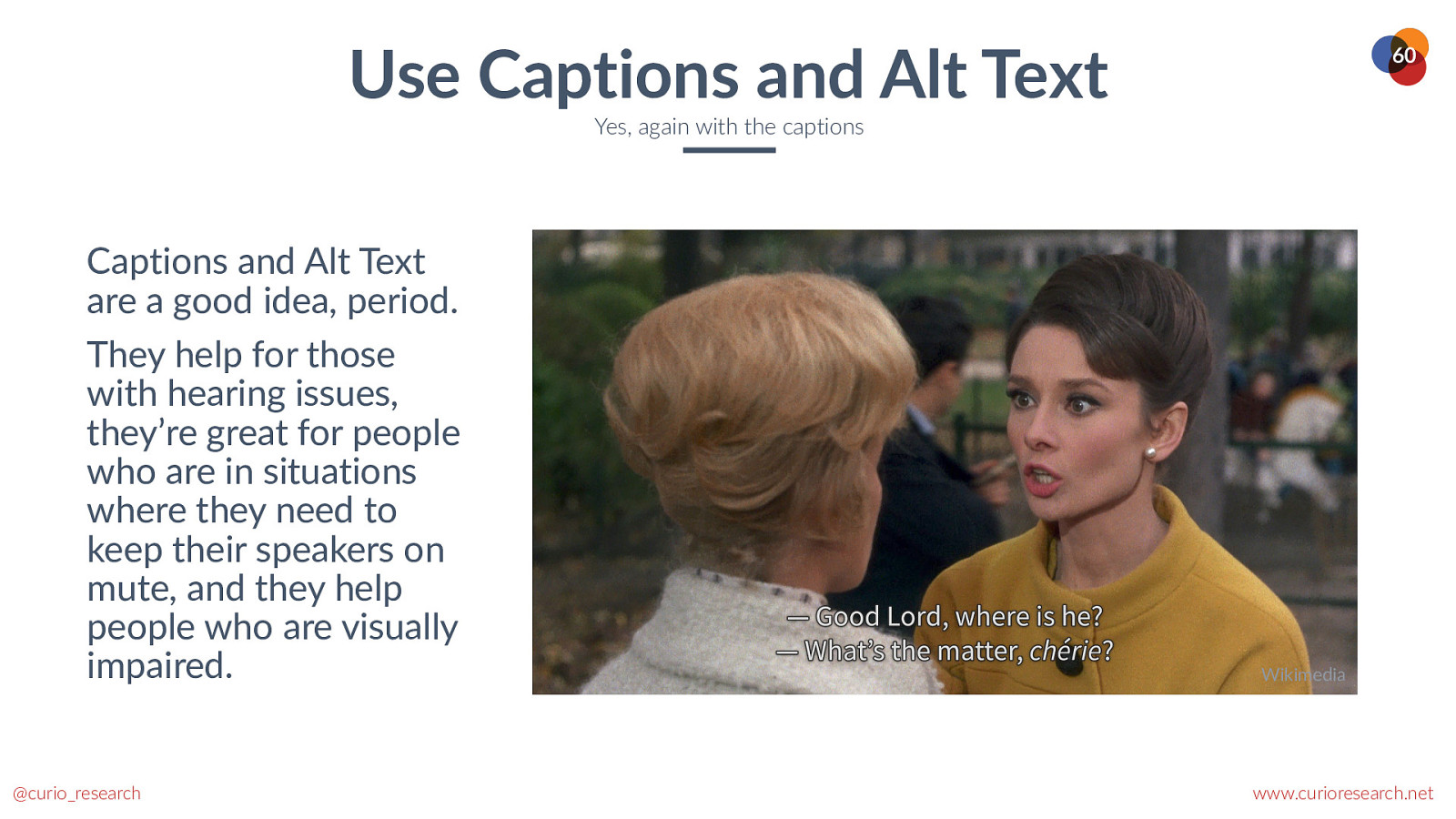
Use Captions and Alt Text 60 Yes, again with the captions Captions and Alt Text are a good idea, period. They help for those with hearing issues, they’re great for people who are in situations where they need to keep their speakers on mute, and they help people who are visually impaired. @curio_research Wikimedia www.curioresearch.net
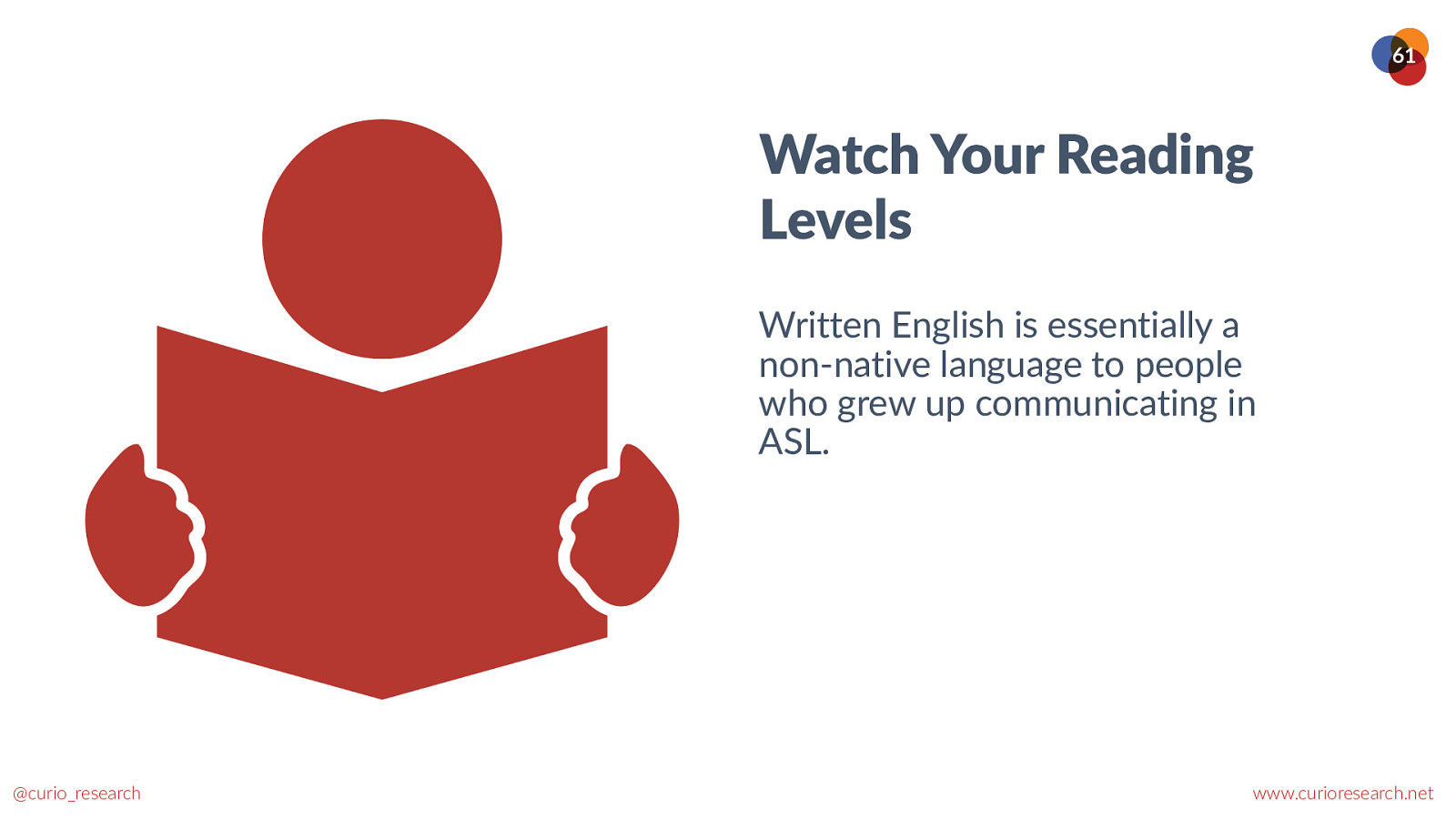
61 Watch Your Reading Levels Written English is essentially a non-native language to people who grew up communicating in ASL. @curio_research www.curioresearch.net
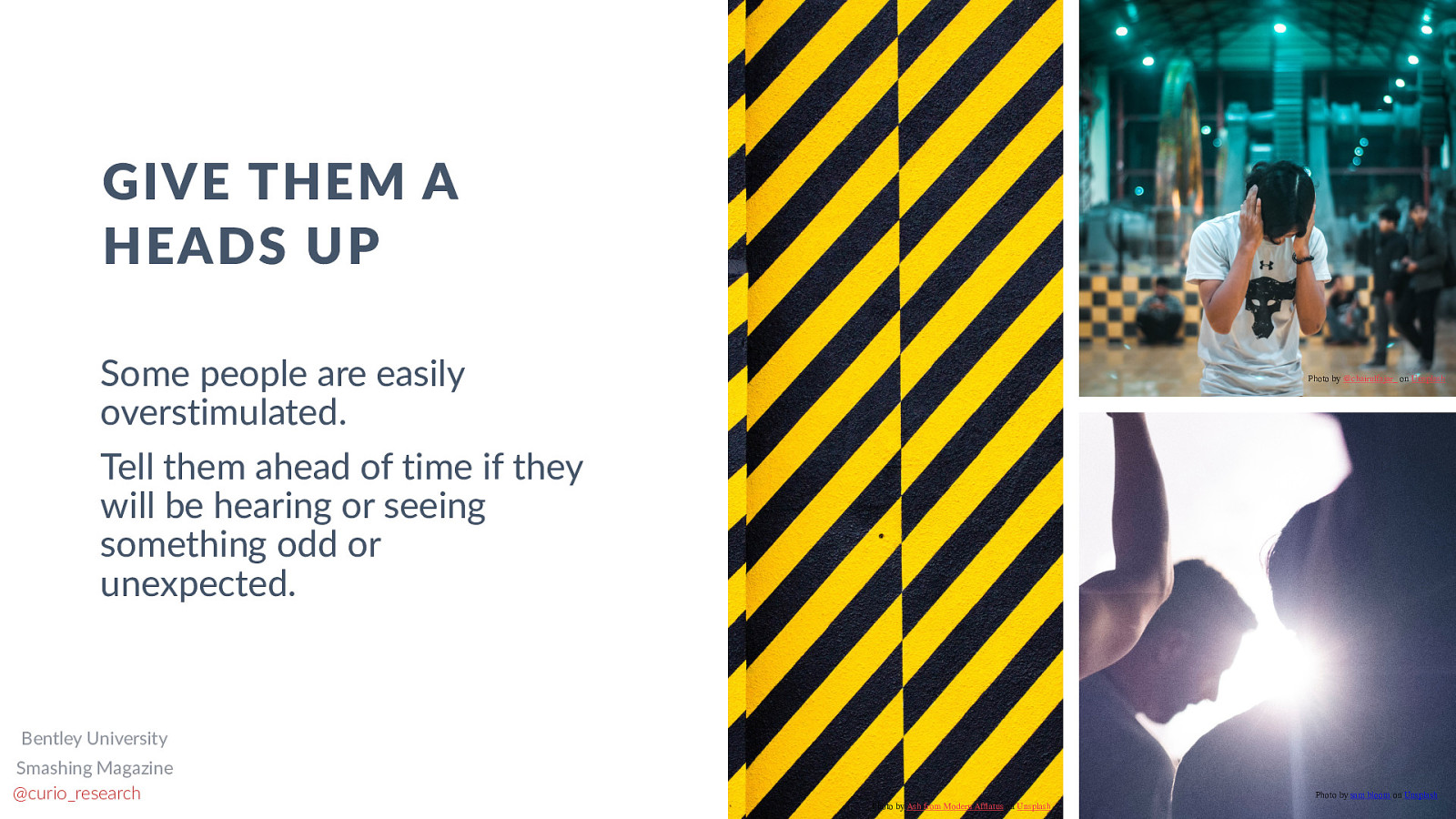
62 GIVE THEM A HEADS UP Some people are easily overstimulated. Tell them ahead of time if they will be hearing or seeing something odd or unexpected. Photo by @chairulfajar_ on Unsplash Bentley University Smashing Magazine @curio_research Photo by Ash from Modern Afflatus on Unsplash Photo by sam bloom on Unsplash www.curioresearch.net
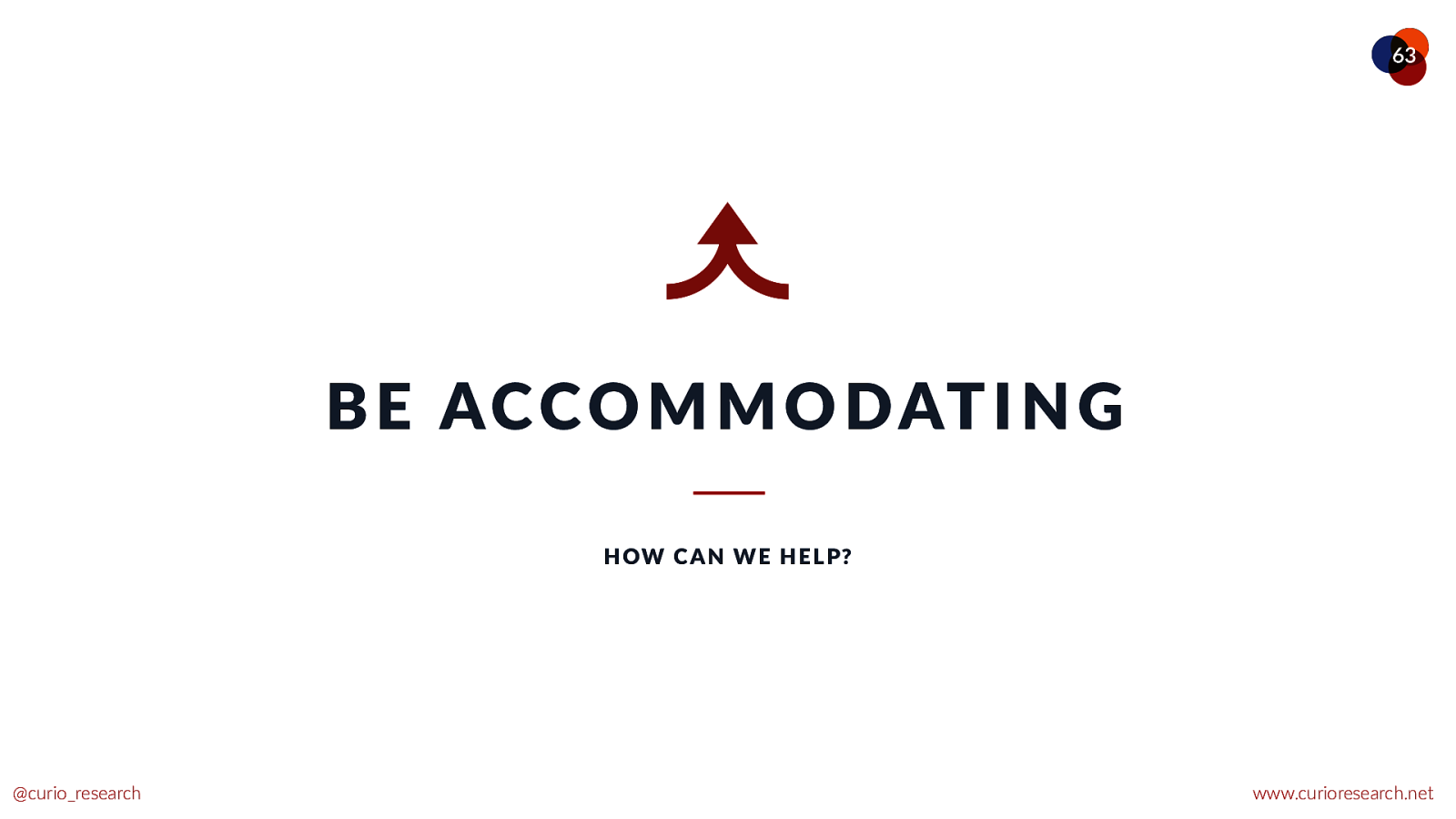
63 B E AC C O M M O DAT I N G H OW C A N W E H E L P ? @curio_research www.curioresearch.net
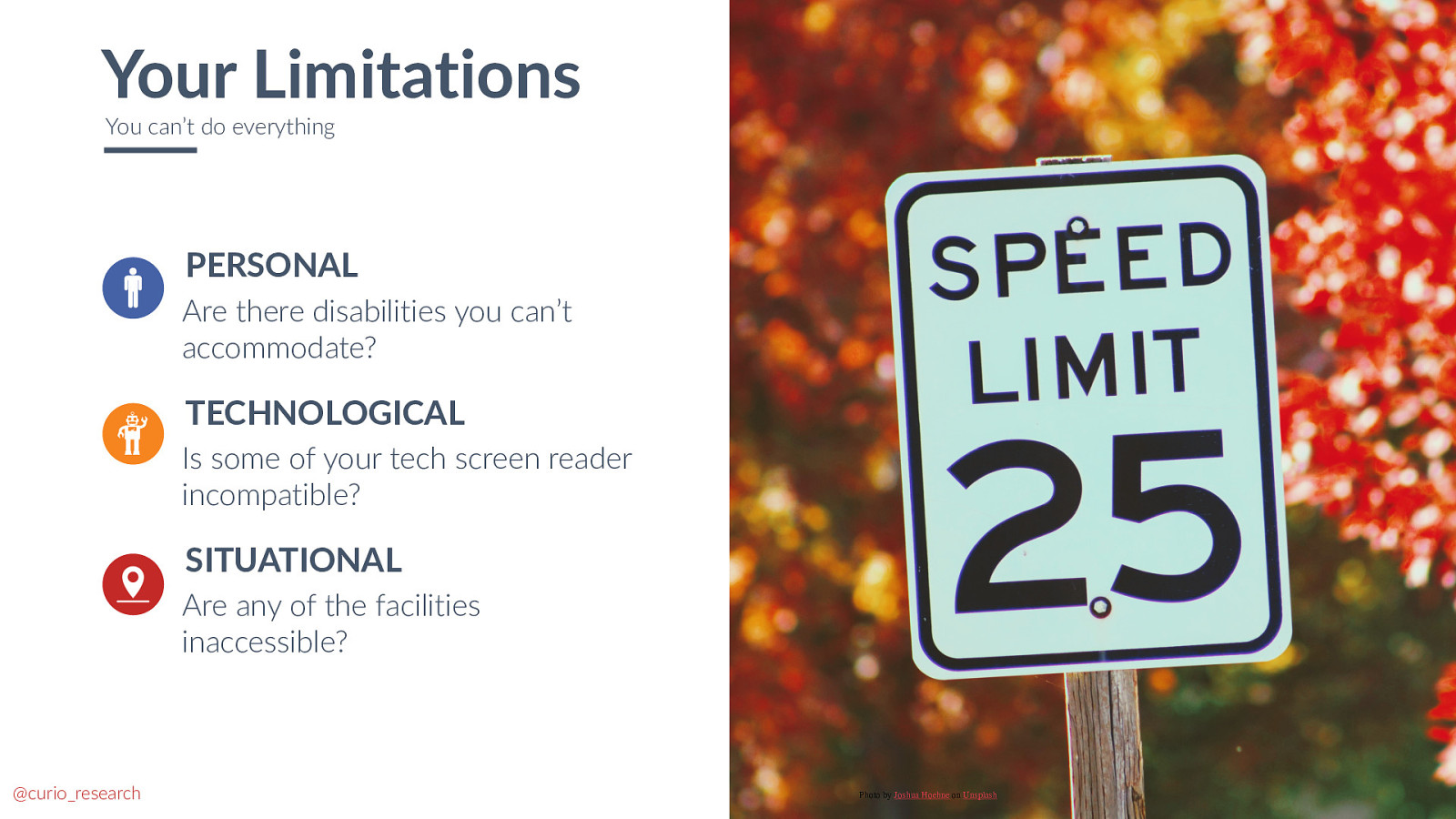
Your Limitations 64 You can’t do everything PERSONAL Are there disabilities you can’t accommodate? TECHNOLOGICAL Is some of your tech screen reader incompatible? SITUATIONAL Are any of the facilities inaccessible? @curio_research Photo by Joshua Hoehne on Unsplash www.curioresearch.net
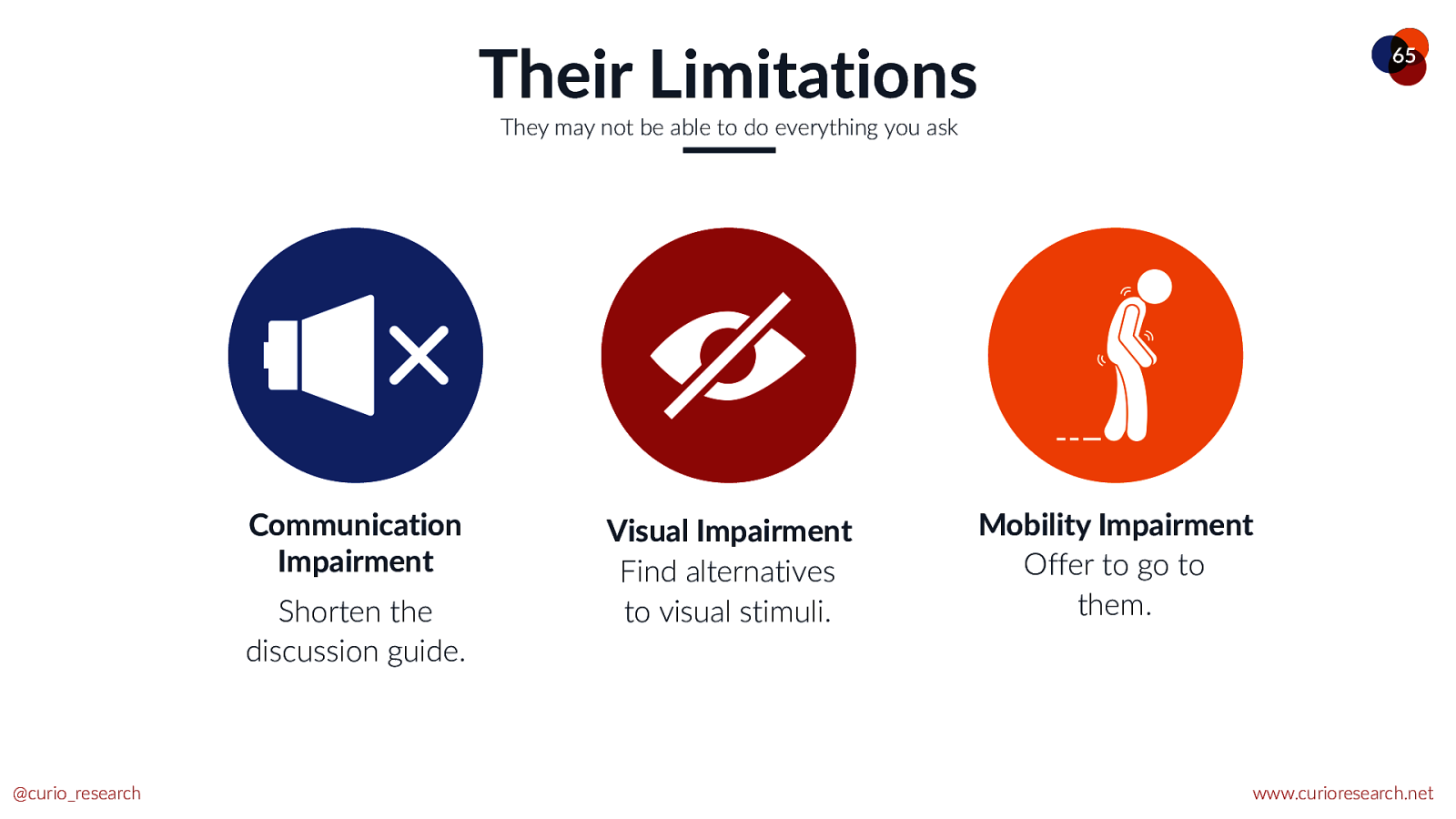
Their Limitations 65 They may not be able to do everything you ask Communication Impairment Shorten the discussion guide. @curio_research Visual Impairment Find alternatives to visual stimuli. Mobility Impairment Offer to go to them. www.curioresearch.net
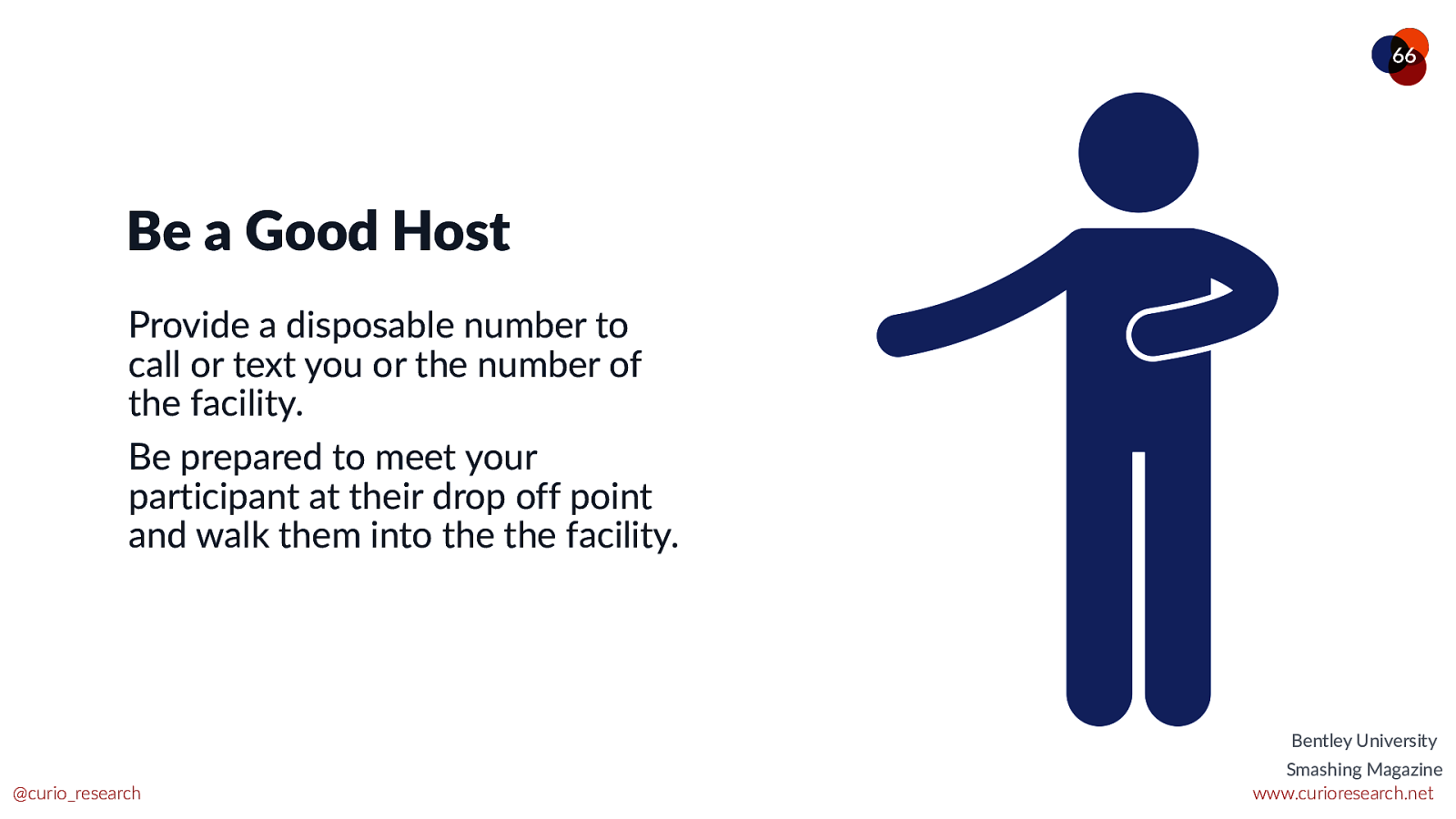
66 Be a Good Host Provide a disposable number to call or text you or the number of the facility. Be prepared to meet your participant at their drop off point and walk them into the the facility. Bentley University @curio_research Smashing Magazine www.curioresearch.net
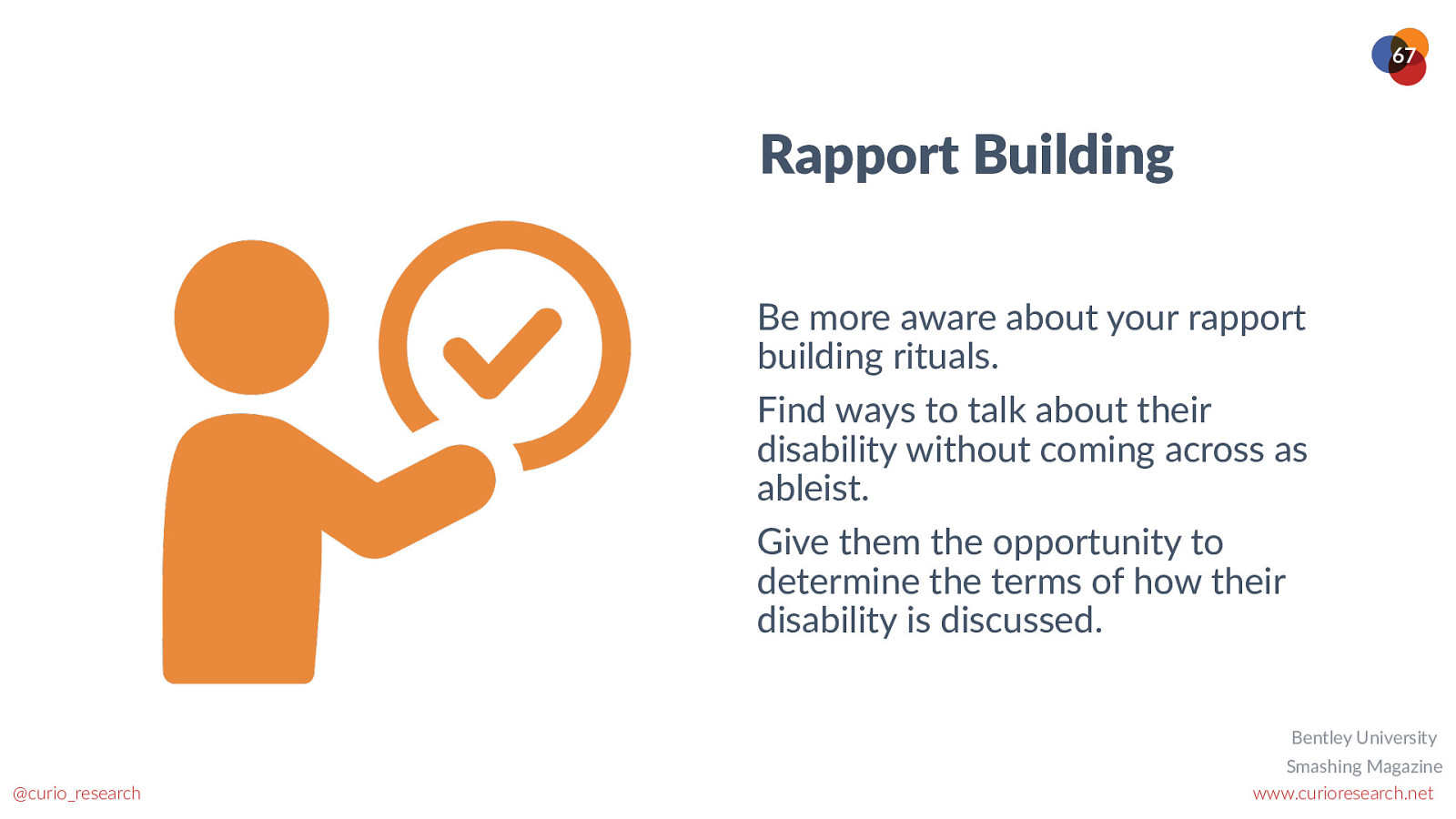
67 Rapport Building Be more aware about your rapport building rituals. Find ways to talk about their disability without coming across as ableist. Give them the opportunity to determine the terms of how their disability is discussed. Bentley University @curio_research Smashing Magazine www.curioresearch.net
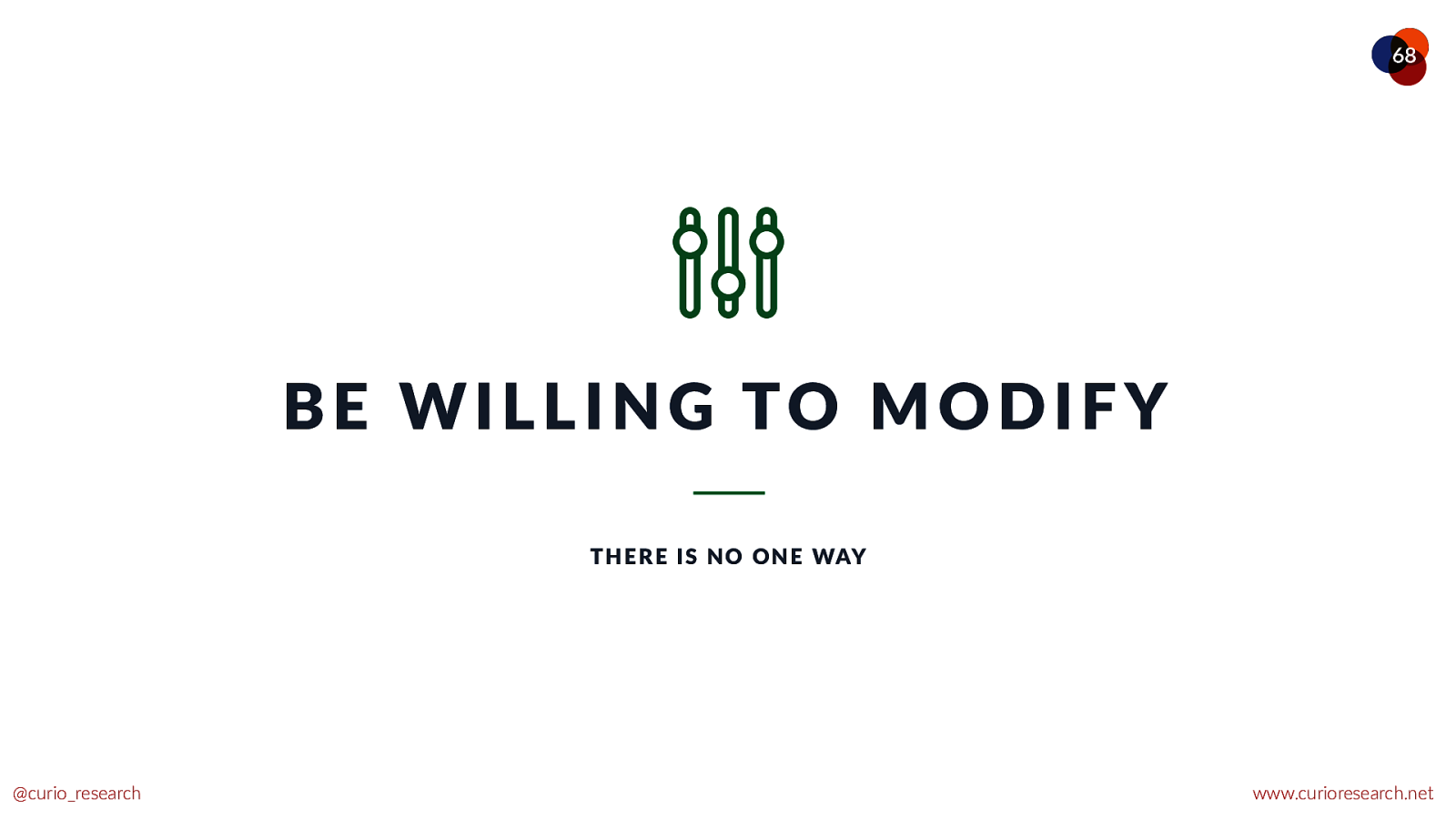
68 BE WILLING TO MODIFY T H E R E I S N O O N E WAY @curio_research www.curioresearch.net
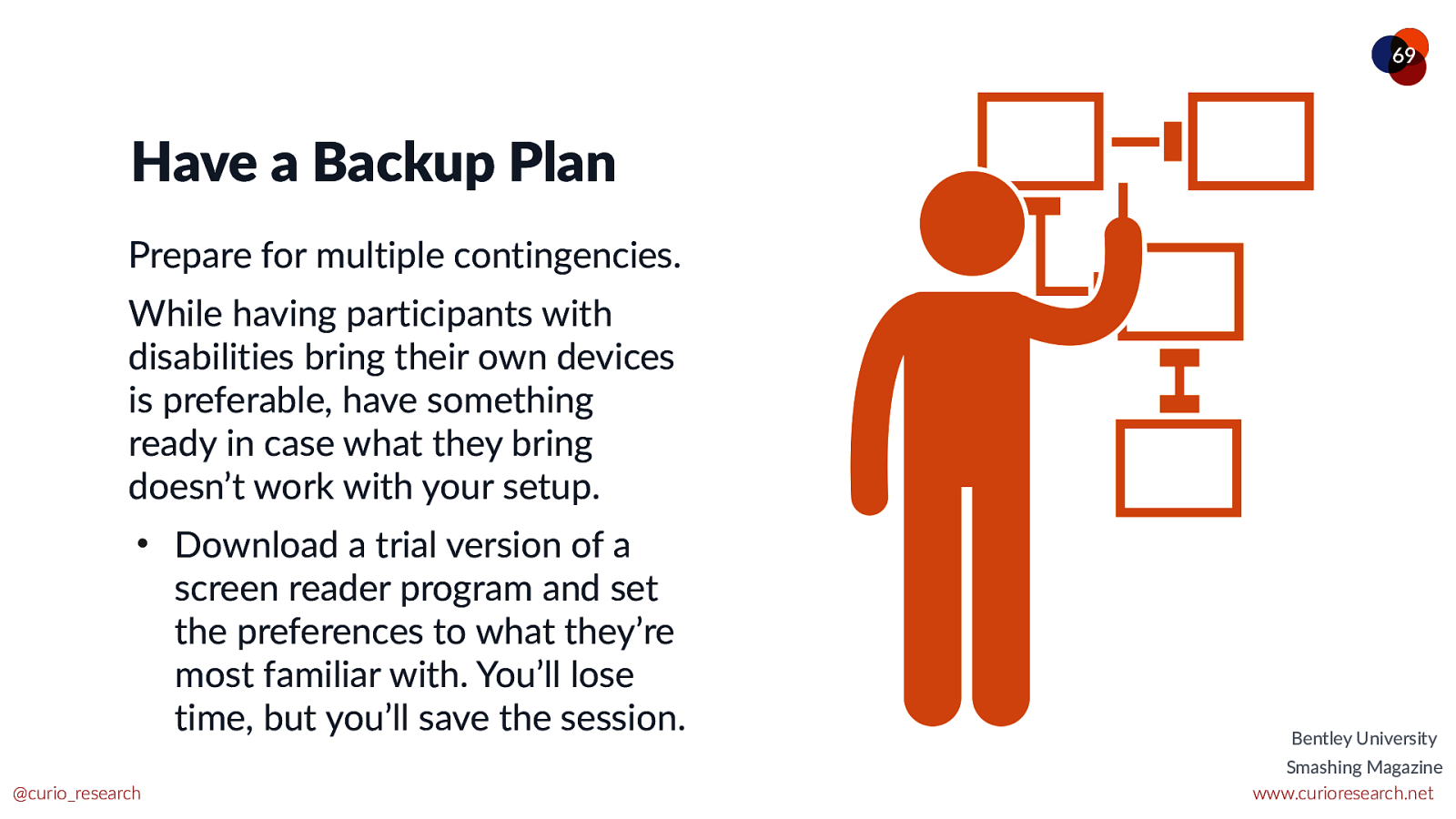
69 Have a Backup Plan Prepare for multiple contingencies. While having participants with disabilities bring their own devices is preferable, have something ready in case what they bring doesn’t work with your setup. • Download a trial version of a screen reader program and set the preferences to what they’re most familiar with. You’ll lose time, but you’ll save the session. @curio_research Bentley University Smashing Magazine www.curioresearch.net
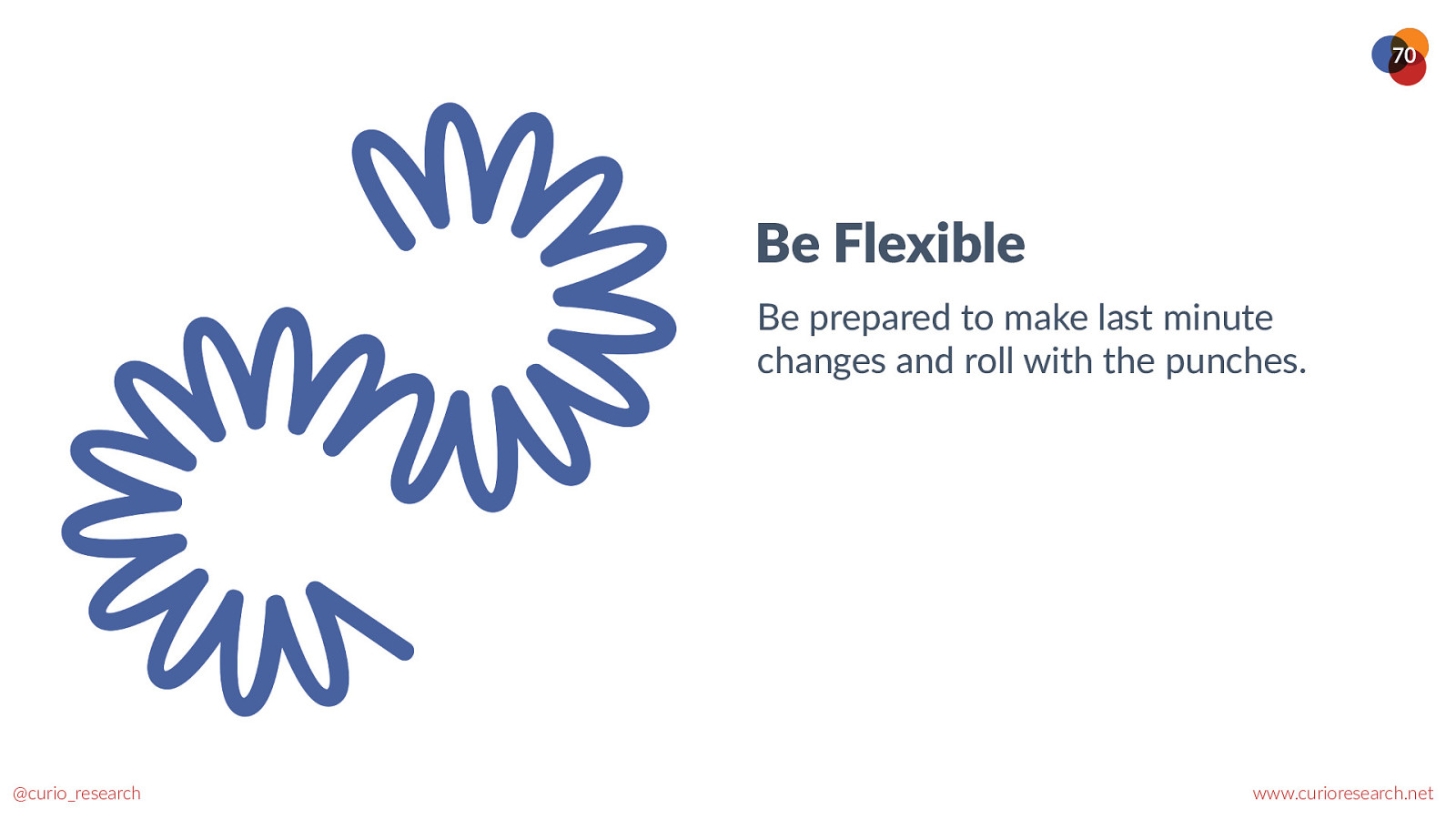
70 Be Flexible Be prepared to make last minute changes and roll with the punches. @curio_research www.curioresearch.net
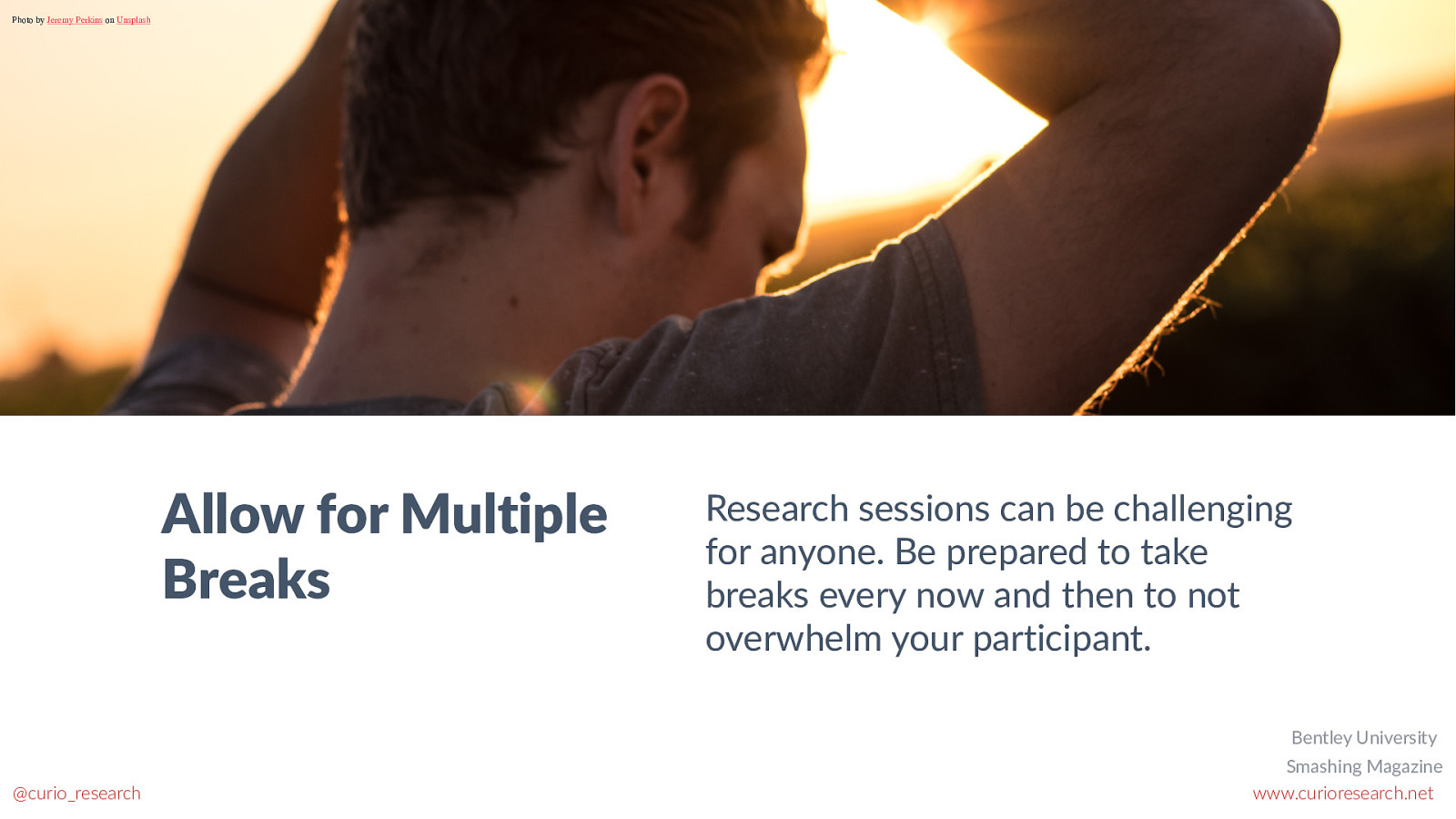
Photo by Jeremy Perkins on Unsplash 71 Allow for Multiple Breaks Research sessions can be challenging for anyone. Be prepared to take breaks every now and then to not overwhelm your participant. Bentley University @curio_research Smashing Magazine www.curioresearch.net
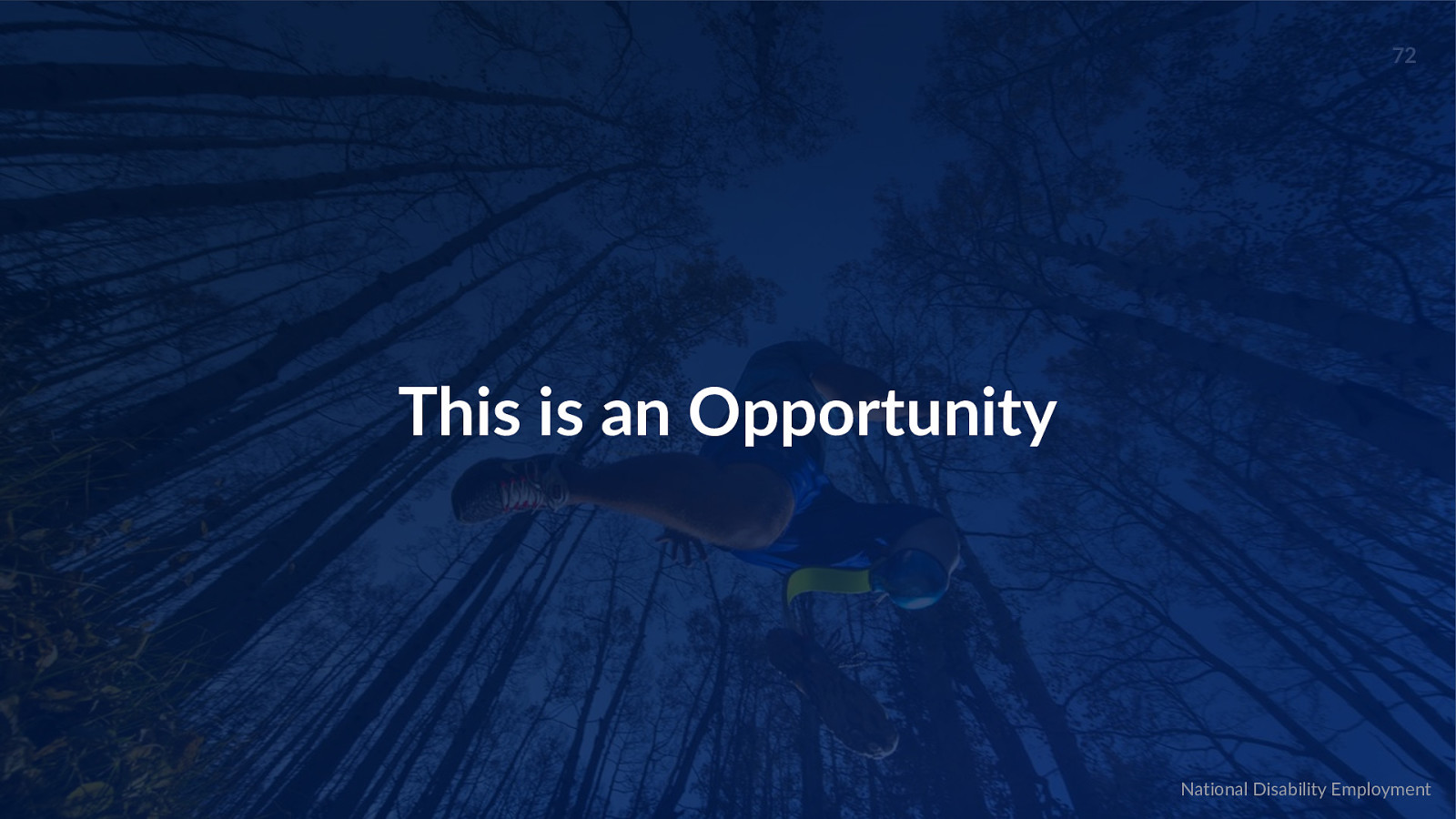
72 This is an Opportunity @curio_research National www.curioresearch.net Disability Employment
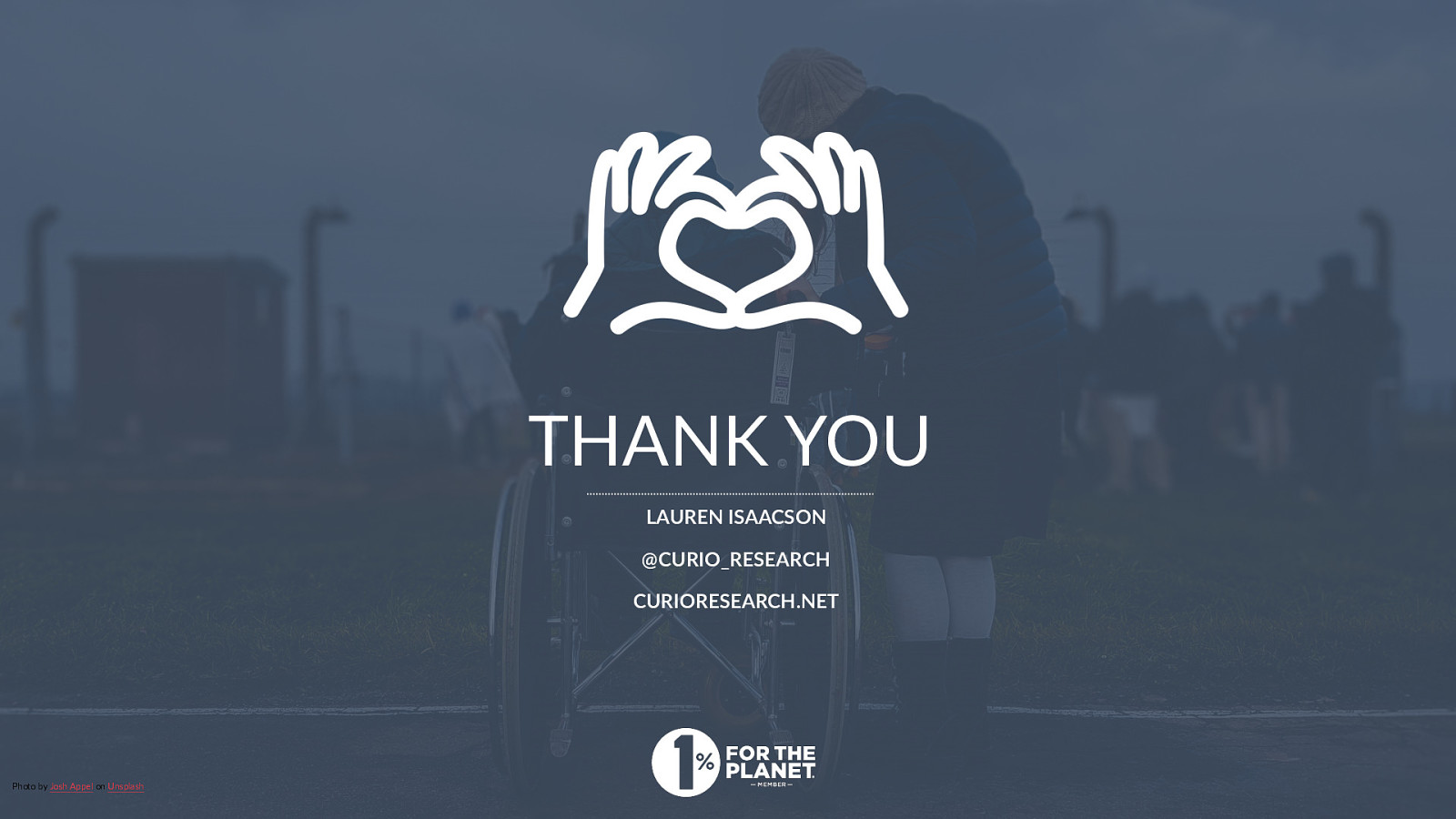
73 THANK YOU LAUREN ISAACSON @CURIO_RESEARCH CURIORESEARCH.NET Photo by Josh Appel on Unsplash @curio_research www.curioresearch.net